Everton Independent Research Data
SHEFFIELD WEDNESDAY 1 EVERTON 2
January 2, 1928. The Daily Post
SURPRISE FOR EVERTON.
SHEFFIELD WEDNESDAY GO DOWN AFTER STUBBORN TUSSLE.
Everton by their victory at Hillsborough against Sheffield Wednesday have secured four points out of their four holiday games, which is quite satisfactory, considering that three of the matches were away from home. They did not have matters all their own way against the bottom club in the table, who are really better than their position in the League table indicates. On the run of the play the Wednesday eleven had almost as much of the attack as Everton, but their play never reached the high standard of the League leaders. All the Sheffield men worked hard. By sheer dash and determination they gained many goal-scoring openings, which went to waste through lack of finishing power. Sheffield were unable to play Harper at centre-forward, trotter leading the attack for the first time since the middle of Novemeber, but Blenkinsop and Kean were able to play, and the introduction of Marsden from the half-back line to inside right strengthened the forward line. It was Marsden who scored the first goal after twenty minutes play. Following effective passing by the left wing play, Marsden snapped up the ball, and dashing between the backs he beat Taylor with one of the few good shots of the match.
DEAN'S HEADERS.
There was a good deal of wild shooting on both sides, and this was only to be expected considering the frosty conditions. The ground was covered with snow, intermixed with sand, but in parts it was slippery, and not conducive accurate play. Dean scored both Everton's goals, which brings his total for the season up to 35. The first was from a centre by Critcheley, who placed the ball into the goalmouth. Dean headed the ball against the underside of the crossbar, and Brown punched it sideways only for Dean to send his foot to the ball and place it into the net. His second goal, well on in the second half, was scored in similar circumstance. This time it was Troup who placed the ball into the goalmouth. It seemed a certainly for Brown to save, but Dean was just too quick for him, whisking the ball into the net with his hand. Sheffield Wednesday several times came near to scoring, once, when Strange drew Taylor out of goal and placed wide of him. The ball rolled slowly goalwards, Virr rushing up and just being in time to keep it out. In the later stages Taylor took the ball off the toe of a Sheffield forward almost on the goal-line, and earlier during an exciting mix-up in the goalmouth. Taylor made two remarkable saves in quick succession.
GOOD HALF-BACKS.
Everton were particularly well served by their half-backs. All three played well, and there was method in everything they did. Of the forwards, Critchley and Troup were effective raiders, with Dean the most enterprising on the field. Weldon gave excellent support to Troup, first drawing the Sheffield backs and then placing either to Troup or Dean. Both Weldon and Dean, however, were sadly off the mark in several shots at goal. Irvine, who took the place of Forshaw at inside right, was inclined to stick to the ball too long. Following their match at Blackburn today, the Everton players go to Cleveleys for special training in preparation for their F.A. cup tie with Preston North End. Teams: - Sheffield Wednesday: - Brown, goal, Walker, Blenkinsop, backs, Leach, Kean, and N. Smith, half-backs, Hooper, Marsden, Trotters, Stranger, and Wilkinson, forwards. Everton: - Taylor, goal, Raitt and O'Donnell, backs, Kelly, hart (captain), and Virr, half-backs, Critchley, Irvine, Dean, Weldon, and Troup, forwards.
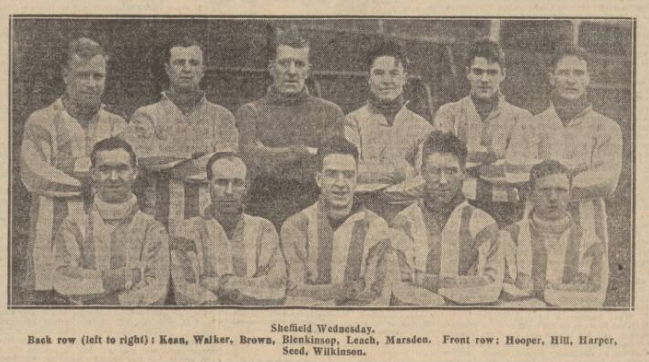
EVERTON RESERVES 2 SHEFFIELD WEDNESDAY RESERVES 0
January 2 nd 1928. The Daily Courier.
CENTRAL LEAGUE
The snow and hard icy pitch made scientific football out of the question. In the adverse circumstances, however, the game was good indeed. Although Everton fully deserved the spoils, the Sheffielders' put up a fine fight and the home defence was often harassed. Hardy making several great saves, notably from Trotter and Wilkinson. The Wednesday custodian also saved well, but was completely beaten when Bain drove in the ball entering off the upright. The second point was scored midway though the second half by Easton. Everton: - Hardy, goal, Davies and Curr, backs, Bain, Griffiths, and Dickie, half-backs, Kendrick, Easton, White, Dominy and Lewis, forwards.
DEAN’S DARE-DEVIL GOAL
Athletic News - Monday 02 January 1928
THE DIFFERENCE BETWEEN THE TOP AND BOTTOM TEAMS OF THE FIRST DIVISION
SHEFFIELD WEDNESDAY 1, EVERTON 2
By Ivan Sharpe
Jack Sharp’s should know something about football, and he says that Dean, Everton’s International forward, is the finest centre he has ever seen. I have not seen Dean reach such heights. In the Internationals this season he has disappointed the spectators –decidedly –but, as I pointed out at the time, he was playing under difficulties, which need not now be enumerated. You do not expect to see the best of a centre-forward on a ground which has a surface of two or three inches of snow and sand-a pitch with a chocolate-cream appearance. But quite another Dean was seen, as the England’s selectors present will agree. And the reason for it was just team-work and understanding. That Everton players, and more especially Weldon and Troup, the wee Scotties on the left wing, occasionally dealt out a long punt that fell over one back’s head and was so placed that dean could race for the bounce, take the ball in his big, spectacular stride and raid or shoot.
DARE-DEVIL DIVE
This sort of thing is good to see on New Year’s Eve, for it shows that there are brains at work in this much-condemned modern football. In several ways, Dean’s work had the stamp of class- in placing his passes, in forging ahead in the good, old-fashioned down-the-field-to-the-goal-I’m-going-stop-me-who-can-style. What has impressed me previously has been his headwork, and I have seen no man flick the ball here and there from the crowd of challenging players more deftly. Now Dean’s head-work was not so conspicuous in the snow match at Sheffield, yet his head won the game. After MARSDEN had given Wednesday the lead, DEAN equalized by heading Critchley’s precise centre against the bar and then rushing goalkeeper and ball into the net. But his head struck the telling blow in the second half, when Troup sent across a slowish, forward centre. Brown, the goalkeeper, advanced and sprang in the air to fist it away- hard; DEAN jumped in at the same moment, and, risking a punch in the jay which would have put out a pugilist, headed the ball off Brown’s knuckles. It was the winner- a great goal; an example of a quick brain, splendid judgement, and a dare-devil dive.
EVERTON’S ERROR.
But if Dean snatched the victory, Weldon- on this showing- is the general of the leaders’ attack, which is smooth in all its parts and good to look upon. The eel-like Irvine was back in the side. He can twist and swerve in the same old way-but he still shoots over the bar. Or did this day. I once saw him send one of those “over-again” shots into the net-and what a goal! But that was for Ireland. Things happen that way against England. Behind Everton have another strategist –Hart. On the flanks of the half-back line are tall defenders who, if less stylish in support than the Brown-McBain-Hart combination of a year or so back, are devilish difficult to get by because of their exceptional reach. In the centre, Hart distributes a shrewd, steadying influence. “Keewp cool,” the pivot is saying. Or, if not, is playing that way, trapping the ball and pushing it through. A shrewd hunter; but why did he allow the forwards to fall back after Everton had taken the Lead? This nervy, foolish policy not only took a deal of the glory from Everton’s win but allowed Wednesday to set up a sustained, if feeble, attack during the closing stages. Dean all alone in attack, and Troup tackling the opposing outside left, when Everton are leading against the bottom-dogs-this is not Championship form. Raitt was quite good, but with Cresswell in form Everton must be a bonny side, for O’Donnell –ever spectators –is an improved player.
WEDNESDAY’S METHODS
They were a considerably better combination than Sheffield Wednesday. No doubt I saw the home club at a great disadvantage. They had to keep the reserve team in Sheffield until a late hour in order to be sure of having a side. In the week a dozen men had been on the injured list,” and ten important,” I was told. And there were three inches of snow and sand, with frost beneath. Who can condemn in face of all this? It is Wednesday’s time of trial, and I will only say this; the evidence of my eyes during visitors to Wednesday’s games of late is that the club have been building on dash rather than pure football. There is much more evidence of punch than skill. Wednesday need to readjust their spectacles and look for quality, I refer mainly to forward play, which, generally speaking, gives the onlookers his chief impression of a team.
HAPHAZARD.
This was the shortcoming of a mixed combination opposed to Everton. I am not going to condemn because the conditions were unkind. They were not bad that the real footballer could not shine, as Weldon showed, but Wednesday had forward to hold the ball, and plot and plain. Their attacks were haphazard, as they have generally been when I have seen, the club since it return the First Division. Nor had the forwards much finish, which was surprising seeing that Trotter was there. I have seen both wing forwards play far better. And that is one of Wednesday’s dangers. If depression enters the Hillsborough doors the New Year will not bring recovery. The half-backs were dogged enough, and, I thought, the surest section of the side, though Kean did not stand out as one expected. Behind —at back—was spirit rather than reliability and I have yet to see Brown, the Wednesday’s International goalkeeper, clear his lines the quick, clean, confident manner of the master. The Wednesday have had bad luck lately. They a little more in this game. But are their methods right behind the scenes? In the First Division science wins. Sheffield Wednesday.—Brown: Walker; Blenkinsop; Leach. Kean, Smith: Hooper, Marsden, Trotter, Strange, and Wilkinson. Everton. Taylor; Raitt, O’Donnells, Kelly, Hart, Virr; Critchley, Irvine, Dean, Weldon, and Troup. Referee: A. J. Caseley (Wolverhampton).
DOWN AGAIN
Sheffield Daily Telegraph - Monday 02 January 1928
WEDNESDAY FINSIH OLD YEAR WITH HOME DEFEAT
DEAN’S GOALS
Sheffield Wednesday must feel well rid of the old year, for the events of its closing days placed the First Division status of the old club in jeopardy. In just over a week no fewer than eight points have been lost, and with many men unfit, the out-look is disquieting in the extreme, Everton won at Hillsborough on Saturday by 2-1. In the prevailing circumstances the victory of the League leaders was not at all surprising; rather were many people prepared for a more pronounced defeat. Wednesday fielded a stronger side than expected, yet some of the players had not fully recovered from hard knocks sustained during the holidays, and in consequence were more subdued than might otherwise have been the case. The pitch was frost bound and had to be well sanded. Had good luck run their way, Wednesday would probably have secured a point, but taking the game through no one could reasonably suggest they were Everton’s equals. Before the interval they sput up a plucky and a skillful fight, and there was not a great deal to choose between the two sides. Afterwards, however, Wednesday declined in a marked manner.
WEDNESDAY’SNERVOUS PLAY
Temperament, no doubt, had much to do with it. Everton, full of confidence, as begets a successful side, fought back powerfully after becoming a goal down, drew level, and, playing very persistently, took the lead midway through the second half. Wednesday really began to waver as soon as Everton equalized. Thereafter, oppressed by the responsibilities attaching to their League position, they played a nervous type of game. Their highly-strung dashes took them to goal all right and then, as one onlooker put it, there was always a scuffle. These scuffles brought no reward to Wednesday. Now there was no scuffling in Wednesday’s rear lines by Everton’s forwards. They kept positions better, were methodical, and knew where to direct their passes. Moreover, they kept the ball on the ground, whereas Wednesday players all too frequently put it into the air, to the consequent disadvantage of the side. Wednesday did best in the first half-hour, during which they played much good combined football. Smith and Strange initiated several movements with well-schemed passes, and Everton’s goal had one or two narrow escapes. It was a delightful attack, in which Smith, Wilkinson, Strange, Trotter, and Marsden all took part, which provided Wednesday with their goal after 28 minutes’ play. The ball travelled from man to man, and Marsden darted ahead to beat Taylor with a strong drive. Everton drew level seven minutes afterwards, when in a scrimmage in the goal mouth Dean managed to get the ball into the net. He had previously headed on to the bar, and Brown had twice parried the ball. The goalkeeper was hurt and Blenkinsopp went into goal for a few minutes. Dean scored a second goal for the visitors after 65 minutes’ play. Critchly had beaten Blenkinsop and had crossed the ball to Troup. The last-named delivered a dropping shot, and before Brown could gather it with his outstretched arms, Dean had headed beyond him.
LUCK FOR VISITORS.
That was the last straw for Wednesday, especially as they were convinced Dean was stood in an offside position. They were not alone in their contention. Later on, Wednesday had a further disappointment, for Taylor, catching the ball as it dropped from the crossbar following a corner kick by Hooper, appeared to carry the ball over the line. Spectators behind the Leppings Lane goal had no doubt at all, but the referee paid no heed. They were unlucky, too, when Taylor stuck out a foot and turned out a great drive by Trotter. Everton did not strike one as being so powerful a team as Huddersfield, but the defence was steady and the half-backs good interveners and forward supports. A feature was the way the ball was made to do the work in the feeding of Dean, a tireless forager. Although he was not so deadly as usual he was always dangerous. Of Wednesday’s players, Brown, while making some fine saves, was not at his best and did not shape satisfactorily when the second goal was scored by Dean. The backs got through much work well, but Kean, not quite fit, was not so dominant as usual, and Smith was the best half-back, playing a stylish and effective game. For 30 minutes the forwards pleased greatly, then tapered off. Marsden at inside right, was a live wire until roughly handled. Trotter found Hart a stumbling block close in, and Strange, clever in midfield, had little thrust in finishing. Hooper and Wilkinson were variable, the outside left missing two good scoring chances. Teams; - Sheffield Wednesday;- Brown; Walker, and Blenkinsop; Leach, Kean, and Smith (N.); Hooper, Marsden, Trotter Strange, and Wilkinson. Everton; Taylor; Raitt and O’Donnell; Kelly, Hart and Virr; Critchley, Irvine, Dean, Weldon, and Troup. Referee; Mr. A.J. Caseley (Wolverhampton).
MELLORS GREAT
Sheffield Daily Telegraph - Monday 02 January 1928
WEDNESDAY GOALKEEPER’S CAPITAL DISPLAY
Considering the difficult conditions the game between Everton Reserves and Sheffield Wednesday Reserves at Goodison Park, which Everton won 2-0, was productive of good football. A heavy snowfall had to some extent softened frozen ground but miskicks and missed opportunities were naturally fairly frequent on the icy surface. Wednesday did many good things and their attack was always a source of danger, but Everton held the balance of power by reason of their clever half-backs who were out-standing in attack and defence. In the visitor’s goal Mellors played a sound game throughout. He had no chance with the two scoring shots by Bain and Easton, and he made many remarkable saves. He was well covered by his backs who defended stubbornly against a clever forward line, but the intermediate line was weak at times. The Sheffield forwards were responsible for some nice combination but their shooting was rather erratic. Powell was best of the line.
EVERTON DO LOVE TO BE BESIDE THE SEASIDE
Liverpool Echo - Monday 02 January 1928
WOE FOR WEDNESDAY
HOW EVERTON DEFEATED THE WOODEN SPOONISTS
By Stork
When the teams occupying the top of the League meet the bottom dogs it is only natural that a victory is expected from the leaders, and, although Everton won, and won well, it was a desperate side they had to face, and it was the Wednesday desperation which prevented them playing their normal game. I recall their game at Anfield-road some weeks ago, and their football on that occasion was as good as one could wish to see, but they were not in the throes of despondency then, and were able to take a risk and not go about in fear and trembling that everything would go against them. Nowadays, however, the Wednesday are in a state of unsettled nerves, and as a consequence they are not playing their true game, and with Everton treading the road to success and not being unduly upset by a goal against, it was not surprising to find the leaders leading at the conclusion of the game, for there was more method and a better balance about the side. Once Wednesday’s rush tactics had been scotched, Everton had the game well in hand, even though their defence at times had to get itself out of many awkward corners. Up to a point the Wednesday front line was capable of making an attack which looked promising, but when the time and opportunity came to have a shot at the Everton goal there was a lack of confidence amongst men who had once been named as marksmen. Each of the inside men had chances, for the wingers, Wilkinson and Hooper were good providers, but as was the case of Everton at one period of their career there was not a man among them who relished the task of having a shot and perhaps make a miss. Taylor had one or two nasty balls to collect, but with a better finish he should have been a busy man, for several dashes down the wing by the Wednesday were only ruined by bad shooting. By comparison with Everton the Wednesday’s play could be likened to a racehorse and a carthorse.
THOUGHT AND CONSIDERATION
Thought and consideration were behind every movement made by an Everton player, whereas the Wednesday simply kicked the ball up the field in the hope that it would reach a colleague, and if it did all was well; but in most cases it found an Everton half or full back, who straightway sent the ball out to a point of vantage. While it was soon apparent that there was only one football team on view, and that side was bound to get its reward, it was only a man of Dean’s anticipation and skill that could have scored the two goals that gave Everton victory. In both cases he had to beat goalkeeper who had the use of his hands, but Dean is such a master with his head that he had the ball in the net before Brown could get his hands in contact with it. When the Wednesday took the lead through Marsden the local people went wild with delight. Personally, I was delighted with their success, for I realized that it was the one thing which would bring Everton out of their shell. They were desperately keen to keep their place at the head of affairs, and that goal put them on their mettle and made them into a fighting force, and within seven minutes of Marsden’s goal they were on level terms.
A STARTLING SAVE
Taylor in goal made some remarkably startling saves. One in particularly was even more than startling. A goal stopped by an outstretched leg is considered lucky. True, it does bear a spice of fortune, but if it is the only remedy, and the ‘keeper is successful, it is a grand save. There was an appeal that Taylor carried the ball over his goal-line when saving a corner kick. Such was the case, and the referee saw that it was not, and the appeal by the Wednesday was not considered. The Everton defence is doing great work, and none did better than Raitt, who is playing studied football- the rush and bustle giving way to pure skill, while O’Donnell is just his old self. The halves, however, are the main prop of the side. Hart in particular being in grand form, with the wing halves aiding and abetting him in everything he does. Critchley and Troup centred well, and each had a hand in the goals. The Wednesday have two fine wingers, but there is no “bite” about the middle men, and Keen is the only half-back with constructional ideas. Blenkinsop and Walker kicked sturdily, and saved Brown much work. Everton go on to Cleveleys after the match at Blackburn to-day.
IN 40 FEET OF WATER
January 3, 1928 Yorkshire Post and Leeds Intelligencer
Tom Fern Brother
A distressing death yesterday overlook Daniel Fern, deputy at Herricroft Colliery, Shireoaks, near Workshop, where a new shaft has latterly been sunk by the Shireoaks Colliery Company. With a man named Samuel Wright, of Workshop, he was going down the sharft on a water barrel, when the barrel began to spin. This caused Fern to lose his balance, and he fell between the barrel and the scaffolding into the sump, which contained 40 feet of water. Later in the day his body was recovered, and taken to workshop Victoria Hospital, where it now lies awaiting an inquest. Fern, who lived at Measham Villas, was the son of the late Mr. W. Fern, a former chairman of the Worshop Urban District Council. His brother is Tom Fern, the old Everton goalkeeper. Wright, who is believed to have clung to the conductor ropes, suffered serious injury to the spine, and he also now lies at the Workshop Hospital.
BLACKBURN ROVERS 4 EVERTON 2
January 3 RD 1928. The Daily Courier.
TWO PENALTIES MISSED.
BLACKBURN WIN AGAINST DEPLETED BLUES SIDE.
Luck was all against Everton in their match in the game they lost the service of Virr, their left half-back, and for the remainder of the game had only four forwards. Irvine having to fall back to Virr position. Everton opened with machine like precision, and for the first ten minutes their forwards gave promise of carrying all before them. Time after time they swept down on the Rovers' goal, and Dean opened the score after eleven minutes' play. Soon afterwards Virr strained a ligament in his left leg which prevented him taking any further part in the game. The Rovers' forwards were then playing with great dash and determination on and put on two goals in quick succession. Both were scored by Pudderfoot and but for the slippery foothold Taylor might have saved both of them. From then to the interval the Rovers kept up severe pressure, and Mitchell scored Blackburn's third goal during a mix-up following a corner kick accurately placed by Rigby.
EVERTON HOLD THEIR OWN.
Everton fought back gamely in the second half, and the fact they had only four forwards made the Rovers backs appear stronger than they really were. Everton fully held their own in the later stages, and after Rigby had put the Rovers further ahead, Dean reduced their lead. From a free kick taken by O'Donnell, Dean once again showed wonderful anticipation in meeting the ball with his head and kicking it into the net. Everton kept on trying and several times came near to scoring. The nearest effort was from a storming shot by Troup, who was given the ball by a header from Dean, and crashed it against the crossbar. The Rovers had the discomfiture of failing to score from two penalty kicks. The first penalty kick was taken by Pudderfoot, but his shot lacked force, Taylor springing sideways and saving. The second Penalty kick (O'Donnell grassed forward-Daily Post and Mercury) was entrusted to the right full back, Hutton, who shot with his left foot and sent wide of the goal. Thus making the seventh penalty kick in succession that the Rovers have missed this season. There was a record crowd for the season of more than 40,000, the gate receipts being £2,376. Teams: - Blackburn Rovers: - Cope, goal, Hutton and Jones backs, Healless, Campbell, and Whyte, half-backs, Thornewell, Puddefoot, Mitchell, McLean, and Rigby, forwards. Everton: - Taylor, goal, Raitt and O'Donnell, backs, Kelly, Hart (captain), and Virr half-backs, Critchley, Irvine, Dean, Weldon, and Troup, forwards. Referee Mr. Rennie.
EVERTON RESERVES 2 BLACKPOOL RESERVES 2
January 3 rd 1928
CENTRAL LEAGUE
Although the surface was water-laden Everton and Blackpool Reserves, in the course of their drawn game at Goodison Park yesterday, served up some fairly interesting football. Blackpool led by two goals at one period, but defensive errors led to the points being divided. Everton's display was disappointing, probably because the men played the wrong kind of game on sticky turf. The forwards were inclined to over dribble, but at times White showed good ideals. He was injured in the second half and changed places with Wilkinson. Bain worked hard at half-back and Griffiths, revelling in the mud, did useful work. Hardy was not safe, but scant opportunity to save the shots which passed him. Brooks and Sharp scored for Blackpool, and Dominy obtained two late on for Everton.
THE EVERTON POSITIONTO-DAY
Liverpool Echo - Tuesday 03 January 1928
Bee’s Notes
There is something uncanny about the way Everton lose, and find the clubs nearest losing on the same day! It is laughable and very helpful to Everton, who have run into a patch of bad fortune, spite of good play and injuries that have cost them dearly. Huddersfield and Leicester City, however, lost “according to plan” or “by arrangement,” as one wag put it, and Everton still hold the lead in a race that is going to be long drawn out. The championship is far from won and are from lost. Anyone who saw Everton against Blackburn –and thousands follow the club in their journeys, including the neighbours of William Dean! –would vouch for the fact that yesterday’s game was going all one way when Virr got hurt. It was a cruel blow that led him off the field for 80 minutes, yet I notice one critic has forgotten that Everton played ten men even for the whole of the second half- strange! Blackburn played a fine forceful game, and were worthy winners, they had two grand backs, one quicker than he looks on the scales, the other thin of pate covering and specially fast as even. Critchly found to his cost. Then Harry Healless as a wing half is better than at centre-half, and Rigby as outside left instead of the international try-off of inside left is a sturdy of trickery and usefulness. Puddlefoot has a couple of goals to his name, Mitchell one; there were two penalty kicks missed- one saved by Taylor, the other driven by the big Jock a right full-back, who used his left foot. Blackburn are advertising for a penalty kick specialist; I believe they have failed with seven kicks in succession! Apart from that they are a very forcing kind of side and are going to make a noise in the Cup-ties. By the way, Manchester City deny the reports that they are after McInally of Celtic.
LOOKING TO THE FUTURE
It would seem that the future months (four) of football offer even greater scope for interest than the preceding four and they have touched a real level of excellence by their surprises. Looking at the “Football Recorder” issued to-day I find that there are many dates to be filled in and many severe tests this month; Derby County, I find from the same bright source of charts and gossip, have done best of all in the holiday games. Now that the holidays are over we can concentrate upon League and Cup without the crush of games, and that being so it is well to put on record something about the leaders. I am practically ignoring yesterday’s match, having skirted the matter to-day and treated it fully last night; but the question of the future is a matter of more import. Forshaw went to Cleveleys with the side in the hope that he would get fit for Saturday week. I have little belief that he will be fit for some time; he is hobbling about with a stick while others are chasing the wee ball. Cresswell is much better, and latest reports about Virr state that it is not, as feared, cartilage trouble, but ligament; therefore Albert Virr of Irby was not quite so downhearted when the team left for Blackpool minus Dean, who had gone back to do a two-fold call- one, his sister’s wedding and two, his pal “Rudolph” (Ellis) Rimmer twenty-first birthday. Ellis the Tranmere is only a few days ahead of Dixie whose goals yesterday bring him towards Freeman figures, possibly to be registered on Saturday when the side meets Middlesbrough, an event that will create much interest in the Goodison game, and add just that spice of novelty that will compel men to go there, no matter what the weather may be. Rooney, I hear is being tested to-day, and Raitt and Kelly, who had severe knocks yesterday, look as if they will be all right. Someone has suggested that if Virr cannot play Griffiths should be brought to centre half back and Hart moved to his old spot, but Hart is playing so wondrously well that one fears to take him away from the middle. I was delighted to see Irvine doing fat work at left half-back after Weldon had a trial there, and Raitt’s continued good play is an answer to those who had decried him and made his football life at Goodison almost unbearable; the club at any rate have taken his name from the transfer list, which will be a blow to Fulham, among other clubs. Dave has taken his “grand piano” on his shoulders and I should think Cleveleys will resound with the call of the musician.
BOLTON WANDERERS RES V EVERTON RES
Liverpool Echo - Tuesday 03 January 1928
The Burnden Park ground was in a terrible condition for the match between Bolton and Everton Reserves. The players were soon covered with mud, and the trainers were repeatedly called on the field to wipe their faces. Bolton had most of the play, and in addition to missing a penalty Jack shot badly. However, he scored after twenty-seven minutes, and ten minutes later Jones headed a second goal from Boston’s corner kick. White was a troublesome forward for the visitors and reduced the lead with a fine cross shot right on the interval. Half-time; Bolton Wanderers Res 2, Everton Res 1. Baggett scored for Bolton in the second half.
BOLTON WANDERERS RESERVES 3 EVERTON RESERVES 1
January 4 TH 1928
CENTAL LEAGUE (Game 21)
Everton Reserves put up a stern resistance in the Central League match at Bolton, but the Wanderers proved better on the heavy ground, into which players often sank ankle deep, Hardy was very clever in goal, and frequently saved his side, while Griffiths and Bain strove valiantly to nullify the Wanderers direct methods, but goals were obtained by Jack, who missed a penalty for hands against R. Curr, and Jones. White replied smartly before the interval for Everton, who were overplayed throughout the second half when Haggett headed through from a clever pass by Jones,, who was the Wanderers best forward. He is a most promising inside left from Oswestry. White and Dominy were Everton's most effective forwards, but the combination of the side was greatly effected by the muddy conditions.
EVERTON TEAM V. MIDDLESBROUGH
Liverpool Echo - Wednesday 04 January 1928
Bee’s Notes
CRESSWELL RESUMES
Those who wish to obtained tickets for the Everton-Preston Cup-tie on January 14, must make application at the ground, or Sharp’s Whitechapel, before next Tuesday, after which all unsold numbers will be returned to Preston. Everton have experienced difficulties recently arising from injuries to players, and the consequent changes have undoubtedly had an upsetting influence on the team work, even though the men brought in are individually clever. It would see that Forshaw and Virr will not be available for some time but it is hoped that Irvine and Rooney will quickly settle down to the team work which has characterized the side. I am glad to note that Cresswell has recovered and he will take his customary place, instead of Raitt, who has proved an able deputy, on Saturday. Rooney comes in once more in place of Virr and the team is; - Taylor; Cresswell, O’Donnell; Kelly, Hart, Rooney; Critchley, Irvine, Dean, Weldon, Troup. The Everton Reserves team to meet Birmingham, at Birmingham, on Saturday, is;- Hardy; Raitt, Curr (R.); Curr (W.), Griffiths, Dickie; Millington, Easton, White, Dominy, Wilkinson.
For Everton v. Middbrough match, next Saturday;-
Aigburth Silver Prize band (conductor Mr. Harry Wearing); -March, “Invincible,” foxtrot, “Souvenirs”; waltz, “Nevada” ‘selection, “Faust,” foxtrot, “Tinker, Tailor”; piece, “Musical Fragments,” one-step “Toy Town Parade,”
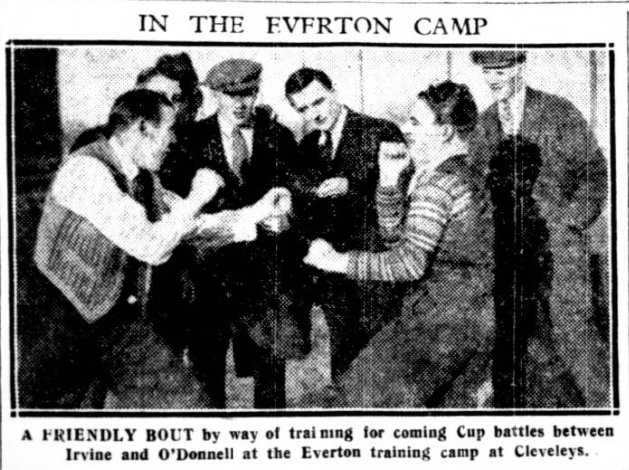
OUR VISITORS
Liverpool Echo - Thursday 05 January 1928
Bee’s Notes
Middleborough on Saturday bring to the Everton ground a personality that commands special attention. First, there is Camsell, Dean’s greatest rival, making his first appearance here; then there is the first re-appearance of Kennedy and Peacock, and added to all that, and the leadership of the League is the remembrance that Dean is in touch with Freeman’s 38 figure; one goal will equal it. No wonder everyone says he is going to see this game, I he misses any other.
EVERTON
January 6, 1928. The Evening Express, Liverpool
(The champions won 1-0 last season)
Manchester United At Goodison
“Barracking” Incident
Game Stopped For A Time
Bradshaw Scores Twice
By Cosmo
It was a thousand pities that such an attractive match –the meeting of Manchester United v. Everton –at Goodison Park should have fallen on such a miserable day. The persistent drizzle of rain and sheet during the morning showed no signs of abatement when the time drew near for the start. As was only to be expected the ground was in a shocking condition, being dotted almost all over with pools of water and in places a perfect quagmire. Tarpaulins had been laid in front of the respective pools, but did not prevent this portion of the playing area being exceedingly treacherous. Unfortunately, too, the rain had beaten into the principal stands, the seats being wet, and those spectators who had not provided themselves with something to sit upon had to stand up.
The Teams
Both teams were at full strength, the only change in the Everton team being the first appearance of Browell the young centre forward secured from Hull City, who took the place of Lacey as leader of the attack. The teams were;- Everton; Scott, goal; Stevenson and Macconnachie, backs; Harris, Fleetwood, and Makepeace, half-backs; Beare, Jefferis, Browell, Bradshaw, and Davidson, forwards. Manchester United; Edmunds, goal; Holden and Donnelly, backs; Duckworth, Roberts, and Bell, half-backs; Meredith, Hammill, West, Stott, and Wall, forwards. Referee; Mr. H. S. Bamlett.
The Game
There was not more than 7,000 or 8,000 spectators at the start. West put the ball in motion and after Stevenson had returned from Roberts the ball was swung out to Davidson who placed right across to the right. Beare shooting high over the bar, Stevenson next repelled two advances by the United left wing. The United came again only for Blott to be ruled offside. Beare next worked his way past Bell, but he failed to get the best of Donnelly. Following another fine centre by Davidson which was smartly intercepted, Edmonds was brought to his knees –from a long, low shot by Makepeace. The Blues continued to force matters and there was an outburst of cheering when Browell receiving from Bradshaw, dashed in a terrific drive, Edmonds diving to save. Everton next forced a corner which was cleared and then Roberts was just in time to prevent Jefferis from shooting when right in front of goal. The pressure at the United end was relieved by a break-away by Wall, who after beating Stevenson, who was lying well up, had a clear course. Macconnachie rushed across, however, and forced both players and ball into touch. Everton were soon on the aggressive again, Davidson, after rounding Holden, cleverly placed right across the goal. The United keeper fisted out at the expense of a corner. The United next attacked on the left all of their advances up to this period coming from this wing. But Stevenson and Harris took a lot of beating. Browell darted forward, but Donnolly was too quick for him. The home right wing again got going, and from a centre by Beare, Jefferis headed into goal, Edmonds saving. Then Meredith came into the picture with one of his dangerous centres, Blott heading wide of the goal. Despite the sloppy state of the ground, which was totally against accurate and fast play. Both sides repeatedly lost ground through the forwards getting in an offside position. A beautiful movement was started by Browell who passed to Beare. The latter made headway and passed to Jefferis. He tipped to Browell who, from ten yards' range had only the keeper to beat he shot, strongly Edmonds receiving the ball full in the body and clearing. Twenty-two minutes after the start Bradshaw opened the score for Everton, and hardly had the excitement subsided when the same player added a second. In the first instance Beare got in a cross shot, which Edmunds fisted out, and Browell slipped when about to shoot. Bradshaw came rushing up and let flay at the goal, the ball striking the post and rebounding into the net. From the centre kick the Blues swept down on the United goal, and Bradshaw again shot from a dangerous angle, the ball again striking the inside of the post and entering the net. The United now livened up, and during an attack on the home goal Roberts lifted the ball over his head into goal, Scott making no mistake in clearing. The game increased in pace and both sets of backs had few idle moments. The Everton forwards were certainly the most effective, and Browell the new centre-forward, took a prominent part in the beautiful passing by the home forwards. Roberts was playing his men with neat forward passes, but the line as a whole was lacking in balance. Both sides were strong in defence, Stevenson for the homesters showing a particularly sturdy front to the United left wing. Jefferis again got in a neat run, and placing to Browell the latter was only inches wide of the post. A remarkable incident occurred just before the interval, when the game had to be stopped through Wall, the Manchester outside left having altercation with one of the spectators who had been shouting out uncomplimentary remarks. Wall was seen to leave the playing area and rush up to where the objectionable spectator was standing but before any further mischief could happen Wall was persuaded to return to the playing pitch by his colleagues and on the advice of the referee a constable stationed himself where the unpleaseness occurred.
Half-time Score;- Everton 2, Manchester United 0
The first 45 minutes had witnessed some good football despite the state of the ground which was against accurate play. Everton deserved their lead of two goals. They were much superior in attack, the passing amongst the forward being pretty to watch and most effective Browell had created a good impression by his go ahead tactics in front of goal.
Browell Adds Two Goals
“Blues” Biggest Score This Season
It transpired that the objectionable spectator who had raised the ire of Wall had been using most objectionable epithets towards him. Wall went up to him to ask him to cease when –so it it stated –the spectator struck Wall in the face. Fortunately this regrettable incident went no further. The home players had discarded their mud laden trousers and jerseys during the interval and reappeared looking quite smart in a clean rigout. The United commenced the second half in determined fashion and for some moments the home goal was hard pressed, a dangerous centre being put in from both wings and Scott having to fist away dangerous shots. The Blues were not long in getting into their stride, and five minutes after the restart Browell increased the homesters lead with a beautiful shot. it was the result of a neat passing bout between Beare, Jefferis and Browell, and Edmonds had little chance to save. The tricky Everton forwards continued to delight the crowd by their neat footwork and passing. On one occasion Wall looked like going through on his own, but his shot was lacking in direction. Some amusement was caused by Roberts the United centre half being rolled in the mud. For a second or two this player was occupied in trying to shake the mud off and like many of the players he presented a pitiful object legs, body and face being literally caked with mud. Beare got in two clever sprints but both of his centres were intercepted. Browell was next prominent with a dangerous shot. At the other end West was dashing away when pulled up by Macconnachie. The visitors came again and Scott had to get rid of a hard drive by Wall. Meredith was not as prominent as he sometimes is, Makepeace spoiling many of his efforts. Some idea of the awful playing conditions can be gathered from the fact that one or two of the players had to have the mud sponged off their faces. On one occasion Roberts got an eye full so to speak, and had to return for a few moments. Everton continued to hold the upper hand. The visitors were mainly occupied in defence visitors were mainly occupied in defence. There was no abatement of energy, the United for their part being intent upon getting a goal. The homesters on the other hand, were not backward in their designs upon the United goal. At the same time the play at this period was not conducted with many thrills. On one occasion Wall made a desperate attempt to get through, Stevenson being only just in time to dispossess him. The United were awarded a corner kick, Duckworth finally placing over the bar. A few minutes from the end Browell scored his second goal after clever work by Beare. This was the Blues' biggest score this season. Final; Everton 4, Manchester U 0.
Goals scores –Everton, Bradshaw (2), Browell (2)
MIDDLESBROUGH, DEAN, CAMSELL, AND OTHER STARS
Liverpool Echo - Friday 06 January 1928
Bee’s Notes
Camsell’s first appearance at Goodison Park. Peacock and Kennedy expected to re-appear at their former haunts. Everton’s continued effort to lead. Dean’s total of 37, and a possibility of the Freeman record being equaled. These are some of the measures by which it is believed Everton will draw a record crowd. A fortnight ago, when they were at home on a filthy wet day, and the attendance was given out as about 25,000 it was nearer 45,000 spectators, and judging by the number of people travelling with the team for their away engagements I am confident that it only needs one fine day to bring to Goodison Park a crowd of something like the figure that attended when Liverpool were there. To-morrow is a specially appealing attraction; first and foremost there is the desire to see the leaders; then there is the added point of Dean’s chance of going to the thirty-eight mark- his goals away from home have been more numerous than at home-a remarkable scoring feature. Dean has very special reason for desiring to do well in the next week or so, and so have his comrades. Besides which there was the tinge of sadness and consequent revenge that they should lose to Middlesbrough 4-2. Camsell scoring four and Taylor having less work to do then fell to the lot of the admirable Mathieson –this is not suggesting Taylor erred; it is only showing the full-tilt methods of Camsell. This time I think this scoring-moving, and double-footed shooting centre forward will be hard pressed to get one goal. Altogether the prospect to-morrow at Goodison pleases, and the fact that Rooney plays for Virr and Irvine for Forshaw should not rob the home side of any particular strength, for both deputies are capable and young. I have yet to see Rooney play a moderate game- and his tests have been of the big order. There are the teams and the start is 2.30; Everton; Taylor; Cresswell, O’Donnell; Kelly, Hart, Rooney; Critchley, Irvine, Dean, Weldon, Troup. Middlesbrough; Mathieson; Twine, Freeman; Miller, Ferguson, Peacock; Pease, McClennand, Camsell, Kennedy, Williams.
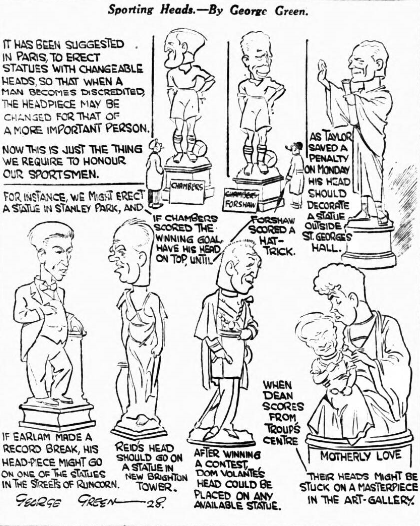
MIDDLESBROUGH OUT TO WORRY EVERTON.
January 7 th 1928. The Daily Courier.
BLUES TO RESUME THEIR WINNING WAY TODAY.
Now that Everton have scrambled free from the troublous currents of the holiday flood, which at times found them sadly engulfed, one may look forward to a less turbulent voyage. If these hopes do not materialise, then Everton cannot hope to be League leaders much longer. They have provided easy enough prey for “foreigners” in recent days, having lost three recent away games and having nine goals scored against their four. As the championship laured wreath invariably goes to the side capable of averting defeat away, as well as winning at home –or rather being consistent –it will be seen that there is just a little cause for anxiety on the part of the Blues' supporters. Being now in calmer waters, however, Everton may be relied upon to come back to a less erratic mode of existence, and they should make a good start towards the desirable end today against Middlesbrough, who are the visitors to Goodison Park.
VISITORS WITHOUT J.CARR.
The promoted club were first to defeat Everton in the present campaign –it was only he second game of the season, though –and they did it to the tune of four goals two. Since that time Middlesbrough have improved somewhat, but despite this one cannot help seeing Everton, who will have Cresswell back again with Rooney in the injured Virr's place, the top dogs today. There may not be much of a margin, though to make a fuss about. Middlesbrough will still be without their captain J. Carr. He was tried yesterday, but found wanting so far as his damaged knee is concerned. Consequently Kennedy, the ex-Everton player will retain the inside left berth. The match starts at 2-30, and the chosen sides are as follows: - Everton: - Taylor, goal, Cresswell (captain), and O'Donnell, backs, Kelly, Hart, and Rooney, half-backs, Critchley, Irvine, Dean, Weldon, Troup, forwards. Middlesbrough: - Mathieson, goal, Twine, and Smith, backs, Peacock, Ferguson, Ashman, Pease, McClelland, Camsell, Kennedy, Williams.
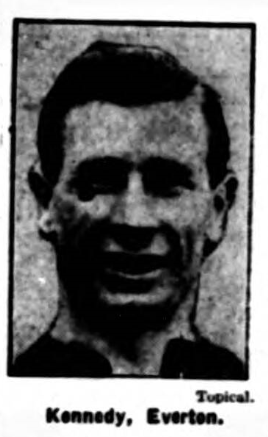
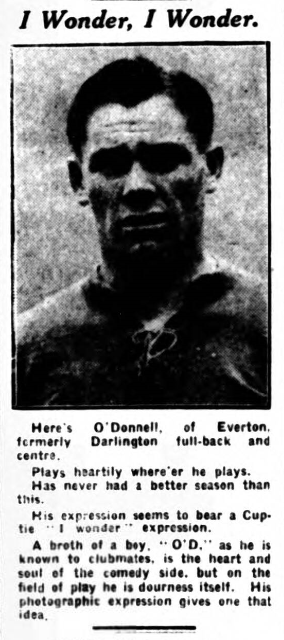
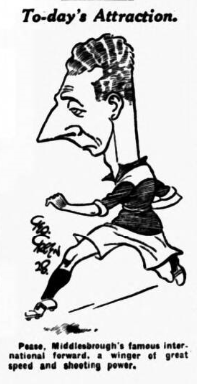
DEAN BEATS FREEMAN’S RECORD
Liverpool Echo - Saturday 07 January 1928
FAMOUS CLUB GOALSCORING FEAT ECLIPSED –AND CAMSELL, MIDDLESBRO., SEE IT DONE
By Bees
Everton; Taylor; Cresswell (Captain), O’Donnell; Kelly, Hart, Rooney; Critchley, Irvine, Dean, Weldon, Troup. Middlesbrough; Mathieson; Twine, Smith; Peacock, Ferguson, Ashman; Pease, McClelland, Camsell, Kennedy, Williams. Referee; Mr. Scholey, of Sheffield. Everton and Middlesbrough at Goodison Park before 45,000 spectators, in dull but dry weather. Peacock appeared at right half against his old club, and Kennedy, in a red jersey, looked quite bigger than his old self. Dean and Camsell gave each other a handshake, and Irvine began with a lovely back-heel movement. The centre of the field looked better than it was, the ball dropping very dead, and players found their heels going into the mud. Taylor soon had to punch away from a free-kick, through Hart kicking Kennedy overboard. A much more dangerous opening came to Irvine, who had moved to centre forward, but the Irishman shot out-side. In view of Dean’s attack on record, every attempt on his part to make a goal was followed with intense interest, and when Dean back-headed a ball as no other centre forward attempts to get the ball to goal, Mathieson had to leap to catch and clear. Although the ball would not “run” on the soggy turf, Peacock made it do some tricks, and got full-fledged applause from his old and new admirers, and Cresswell got even more applause for two perfect estimates of a serve and a dummy. Critchly offered Dean a chance, and when the centre-forward strode forward he let out a strong shot that pulled to the right, Camsell had a much easier chance.
DEAN’S THIRTY-EIGHTH.
Pease placed him in front of goal after O’Donnell had been beaten by the centre forward, but mercifully for Everton, Pease could not convert the ball. The cost of this miss was a goal to Everton in nine minutes, and the soccer was Dean, who registered his 38th goal of the season. The importance of the goal was more than the beauty of it. It came from a free-kick towards the middle of the field, and Dean once more back-headed the ball to goal when he was close on Mathieson’s track. The clever Middlesbrough goalkeeper patted the ball down. Mathieson seemed to lose sight of the ball when he was on the goal-line, and Dean got round his man and scored with ease. Great was the joy thereof! And there followed ten minutes of real rousing Everton attack, and the crowd marveled how the goal escaped three or four times. Dean centred from the right wing, and Weldon fell when about to make good. That was miss No.1. After Owen Williams had centred to Taylor’s hands. Critchly worked inward and passing to Dean, the latter hit across the goal, Mathieson putting the ball on to the left upright. The ball returned to the field of play with Troup losing the race to Mathieson, which was miss No.2.
BROUGH ON DEFENCE
Dean missed a sitter, and Troup swung the ball outside from close range. Critchley shot hard without beating the vigilant Mathieson. Thus Everton had ten minutes’ solid work on the Borough’s collar. Unfortunately Pease damaged a thigh, and had to leave the field for a moment, and Camsell, trying to go through, was unceremoniously bowled over by O’Donnell. Irvine worked like a Trojan in his own fashion which means that he won a good position, and then lost the easy position. Kelly, as often happens with him, started rather slowly, but warmed to his work. So far Middlesbrough were playing well below form and so badly indeed that they seemed to be lulling Everton into a false position. This was made evident when Williams went through Cresswell’s armour and the captain also fell down. At Middlesbrough Everton lost goals through stopping to appeal for offside, and to-day they resumed this operation when Pease broke through, but there was a free kick against Irvine around Everton’s penalty box. When this had been cleared Rooney three times proved himself a first-class senior player. McClelland unwisely tried to go through instead of offering a simple pass to Camsell.
TESTING THE POSTS
The reply from Everton was instant, and after Mathieson had handed out two Everton efforts and Weldon had given him a warm catch, Dean once again hit the woodwork, an amazing strength of shot which rattled the angles of the bars. Thus Dean had been baulked of a hat-trick performance early in the game. Although Mathieson the goalkeeper, was badly hurt, he prevented Kelly and Troup from scoring goals. Middlesbrough replied in very tender fashion, McClelland shooting across the mouth of the goal. The players tired considerably through the porridge turf, and the game slowed down perceptibly, as expected. One feature was remarkable. Dean was able to get a ten-ton force behind his shot in spite of the middle of the field being the worst portion of the playing space. While admitting Everton’s ability, one had to admit that Middlesbrough were playing very paltry football. The forward work was very bad. Smith and Twine and the goalkeeper, plus Peacock, saved the side from a lot of trouble. Right on half-time Critchley hurt his arm, and Taylor kicked out in the fashion that was prevalent thirty years ago. Half-time; Everton 1, Middleborough 0.
DEAN EARNS HIS NICHE IN HISTORY
TWO PLAYERS SENT OFF
WELDON AND McCLELLAND IN A FRACAS
The second half begin in a mist, and with Everton rather nervy. Weldon shot towards goal, but the ball stuck. Then Dean tried to kick the ball out of the goalkeeper’s hands, and was duly lectured by the Middleborough back. It did seem to me a dangerous act, and an even more dangerous act was that of Camsell’s when he closed in after Rooney had played for safely by trying for a throw-in and had found the refused to pass out.
IRVINE’S BACK-HEADER
Owen Williams centred hard for Taylor to make a catch, and then Dean headed for goal, and at a convenient moment shot to make Mathieson again produce his very best form. Dean made a corner, which was fatal to Middlesbrough’s interests. Troup took it, and after Dean had headed towards goal, Irvine back-heeled the ball, to make the score 2-0 at the 52nd minute. Now Middlesbrough began to work in something like their old rustling form. O’Donnell had to introduce enterprise and fire to prevent Camsell scoring with ease. This revival set Everton on edge, and when Mathieson fell without collaring the ball, another goal was imminent, Troup, however, sent it far to the right hand side and no one was up to convert it. Then at the sixty-second minute a most inexplicable thing happened.
TWO PLAYERS ORDERED OFF
Two Scotsman, McClelland, of Middlesbrough, and Weldon of Everton, got to loggerheads when the ball was dead. The incident was near the grand stand, but many did not see it, because they were following the flight of the ball. McClelland gave a short jab kick at his rival, and Hart, shouting in compliant, brought the official’s attention to Weldon’s retaliatory kick. The referee called a linesman and the two players together, and when Cresswell attempted to intervene the referee would not listen. On what the linesman said the referee ordered both men off the field at the hour. The linesman had a perfect view of what was happening and yet I could not help remembering many worse offences which had not brought the full penalty. The exit of two players at one moment is not a new thing in this city, as one remembers the occasion of Harrison and Barton being sent off this ground; also Parker and Galt. In another part of the city we saw three go off in one match some years ago. It was a most distasteful affair, utterly unnecessary, and quite spoiling the day’s pleasure. There had been signs of ill-temper, but nothing out of the ordinary and this culmination was lamentable.
DEAN BREAKS RECORD
Middleborough got going at the 70th minute and Peacock got going with a long range shot against his old club mates, but Dean, working down to the right, used his left foot and scored a remarkable goal to make the score 3-1 one minute later. The light went bad, and Middleborough would have scored if Rooney had not saved on the goal-line at the corner of the post. Dean almost scored again with a beautiful back-heel shot, which nearly surprised Mathieson, who was fortunate to turn the ball round the post. Final; Everton 3, Middlesbrough 1.
BIRMINGHAM RES V EVERTON RES
Liverpool Echo - Saturday 07 January 1928
Everton were engaged with strong opposition in their Central league match at St. Andrews, where Birmingham played a powerful side which included Tremelling, the international goalkeeper. The home team had the better of the earlier exchanges. A good combined movement on the Everton right was foiled by Barton. After twenty minutes Birmingham went ahead, when Oaks found Hardy yards out of goal, and he netted with ease from a pass by Firth. Everton should have equalized ten minutes later, but Dominy missed an open goal. Half-time; Birmingham 1, Everton nil.
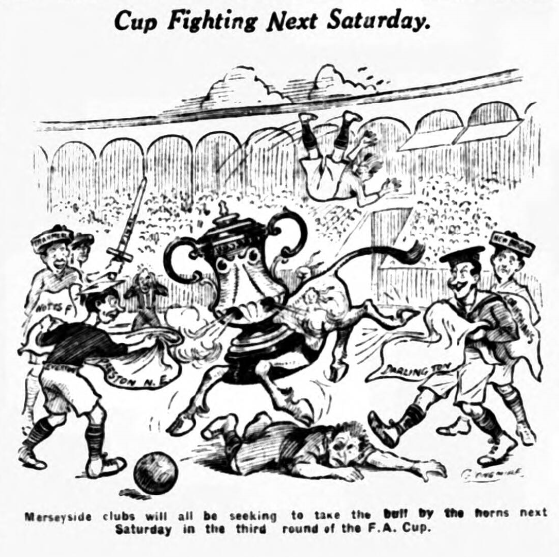
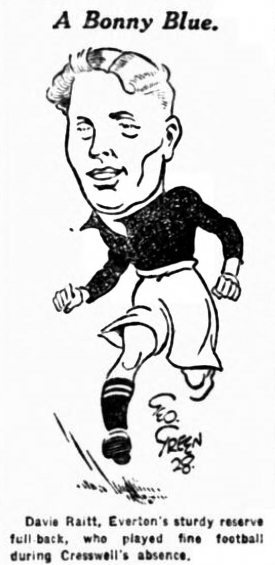
FORGING AHEAD
Liverpool Echo - Saturday 07 January 1928
DEAN’S RECORD FIGURES AND LEAD ON FREEMAN
To-day Dixie Dean, the Everton forward, not only got the glad hand for a goal that equaled Bert Freeman’s 1908 record of 38 goals, but he forged ahead, and thus showed his determination to wipe out Harper’s First Division record of 43 goals. Camsell has the record of all divisions with 56 goals (59? Blue correspondent) –Second Division. Dean is within hail of this. There were remarkable scenes when Dean equaled Freeman’s record; the crowd “rose at him,” and continued their cheering for some minutes. When he got a further goal the crowd again demonstrated, and the players joined in these demonstrations, for Dean is popular with all- players, officials and crowd- by reason of the fact that he has kept a level head through the glut of honours gained by him in his short First Division career. He has been international, captain of Everton, centre of a motor calamity, and everything in turn!
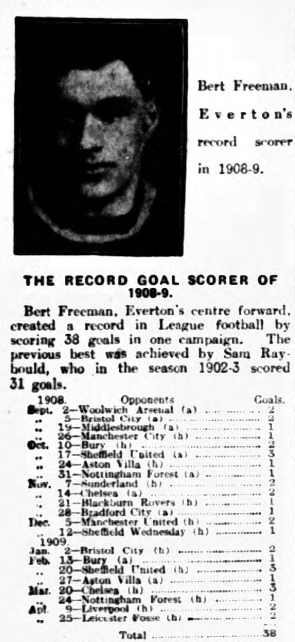
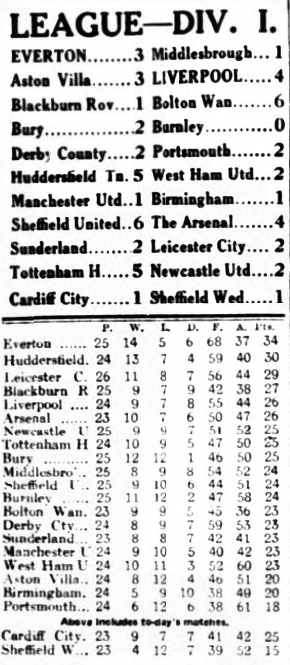
STUD MARKS
Liverpool Echo - Saturday 07 January 1928
By Louis T. Kelly
- It needs no prophet to forecast that Everton’s Jeremiah will experience a keen ninety minutes’ fighting the wiles of James a week hence
- Dixie Dean is now well ahead of his previous best of 32 League goals in a season- and that with nearly four months to go.
- It should not be long before he breaks the existing First division record of 43 goals held by Harper, the ex-Rover.
- Bob Irvine played a really skillful and effective game at Sheffield
- After the match at Hillsborough there is no mad scramble to board cars- the crowds merely “Q” up.
- Dean is a football enigma –often out of his place yet always in it
- Two former Everton players were in the Middleborough side seen out against Manchester United on Saturday;- Peacock and Kennedy
- Of the Middlesbrough side that last visited Goodison Park (in season 1923-24) there wasn’t a single “probable starter” left for to-day’s bout
- There were two “possible,” however, in Freeman and Webster
- Of the Everton team v Middleborough in the match referred to, Hart, Irvine, Troup and Brown are still in the service of the Blues
- Cardiff is the only place visited by Everton this season where the Toffees have failed to score
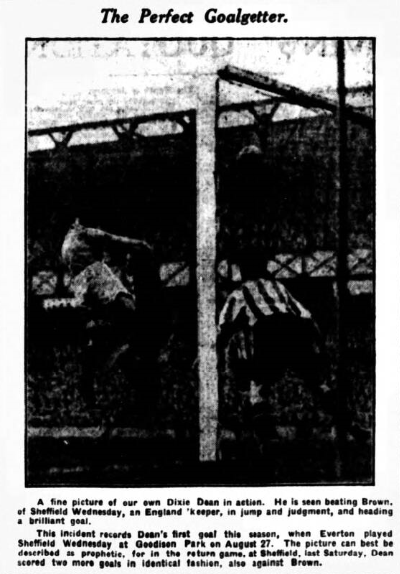
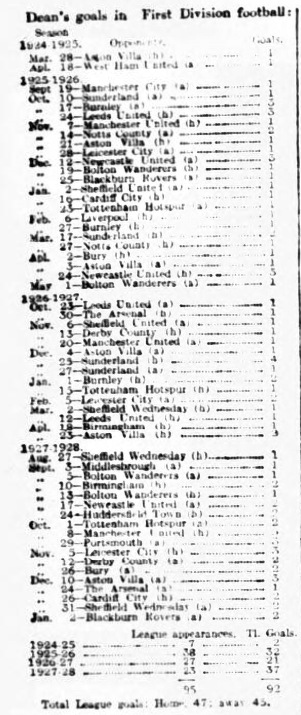
BIRMINGHAM CITY RESERVES 2 EVERTON RESERVES 0
January 7 th 1928. The Daily Courier.
Central league (Game 22)
Everton Reserves were beaten at St Andrews, where Birmingham City Reserves managed to register a goal in each half and were slightly the better side. It was a keen game, however, and there was little between the elevens. Firth scored in the opening half and Woodhouse in the second. Wilkinson aid the Everton attack in place of White, and did fairly well, while Kendrick was good in Wilkinson position. Dominy was always a useful forward . Everton: - Hardy goal, Raitt and R. Curr backs, W. Curr, Griffiths, and Dickie, half-backs, Millington, Easton, Wilkinson, Dominy, and Kendrick, forwards. #
EVERTON SIGNED E. COMMOM
January 9 th 1928. The Liverpool Post and Mercury
Mr. T McIntosh the Everton secretary, on Saturday signed e common, of Blyth Spartans, who is expected to do well in a new realm of football. He is nineteen years of age, 5ft 8ins in height and weights 11 and half stone. He learned his football with new Delaval, and since promotion to the northeastern league with Blyth Spartans has done good work. Everton reserves have no match next Saturday therefore he will not get his first run for a fortnight.
EVERTON 3 MIDDLESBROUGH 1
January 9 th 1928. The Daily Courier.
TONY WELDON AND JAMES McCLELLAND SENT OFF AT GOODISON PARK.
UNFORTUNATE INCIDENT MARS EVERTONS SPARKLING VICTORY
MIDDLESBROUGH –AND CAMSELL –OBLITERATED
DEAN SCORERS HIS 39 TH GOAL AND BEATS FREEMAN'S RECORD.
Tradition has always associated Everton with the clean game, and no departure will be permitted from this ideal. Without expressing an opinion, as to the merits or demerits of the unfortunate ordering –off incident in the Middlesbrough game, as the matter is sub judice, it may be said that spectators generally nowadays disfavour ebulitions of temper by any players, which might be excused among schoolboys, but not in a First Division game. The great crowd at Goodison Park showed their wisdom by receiving the referee's decision with practically no vocal comment. Possibly the majority did not see sufficient to express an opinion, although there were some who though Referee Scholey might have met the position with the less drastic caution. He preferred after the game to make no pronouncement and his next step will be to report the circumstances to the F.A.
THROW-IN INCIDENT.
Tony Weldon and James McClelland, who received orders to quit, are Scots, Middlesbrough are in fact, partial to players from across the Borders. McClelland is a six-footer, and it will be recalled that he scored a heap of goals when with Southend. That was when he was a goal scoring centre-forward. As a stylish, thoughtful type of inside man, one would imagine him to be the last to incur the displeasure of a referee. That view also apples to Weldon, who has done good service for Everton since he left the Airdrieonians. The pair were at logger-heads in the second half when the ball was being thrown in and there was an alleged incident which, apparently was not observed by the referee, followed by an alleged retaliatory measures. The referee called up a linesman who had been in a position to see what had occurred, and after consultation with him, did not hesitate to send the two players off . The game had not been a rough one. The unfortunate incident was set off by the triumph of Dean, the greatest centre-forward since G.O. Smith although that great player never used his head to the advantage that Dixie does.
SHARP-SHOOTERS SHAKE HANDS.
He is a masterpiece in flicking the ball with his head down to his toes for the shot. A contrast, too, was the spirit of camaraderie shown when Dean shook hands with the wonderful Camsell the record scorer of all time with 56 goals, and still without an International cap. By his goal in each half the Everton centre-forward surpassed Freeman's record of 38 goals for the First Division, although it must not be overlooked he netted them when goals were much harder to obtain under the old off-side rule. It is a pleasure to record Irvine's first goal for the first team this season, for he is a player who cannot well be left out of a side although he displeases many by his habit, which he cannot seen to throw off, of over-dribbling. He might have given Critchley more passes, Troup had a great way of cutting into goal for close-up shots and there was power behind Weldon's material while Mathieson, the six-foot Scot was really brilliant at times and repeatedly saved his side. The half-backs were the backbone of the Everton side, with Hart outstanding, and Rooney deputising for Virr, distinctly promising. Camsell in fact, was not allowed to position himself for his customary deadly work in front of goal and little was sten of him. The Everton backs have played better games. Pease scored in the second half for the Borough, who were handicapped by an injury to Pease, who twisted his thigh in the first few minutes of the game. Teams: - Everton: - Taylor, goal, Cresswell (captain) and O'Donnell, backs, Kelly, Hart, and Rooney, half-backs, Critchley, Irvine, Dean, Weldon, and Troup, forwards. Middlesbrough: - Mathieson, goal, Twine, and Smith, backs, Peacock, Ferguson, and Ashman, half-backs, Pease, McClelland, Camsell, Kennedy, and Williams, forwards. Referee Mr. Scholey.
COMMON FOR EVERTON
Blyth News - Monday 09 January 1928
After their game at Workington on Saturday, Blyth Spartans transferred their right full-back, Chester Common, to Everton for a substantial fee. A strongly built player, standing 5ft 8ins, in height and turning the scale at 11 ½ stones, Common is a native of New Delaval, where he was born 20 years ago. Last season he played for New Delaval Villa at centre-half back, but on joining the Spartans at the beginning of the present term he readily showed distinct promise as a full-back. He has only had to play about half-a-dozen N.E League games to make himself an attraction for big clubs. He will find with his new club two former Spartans in W. Easton and J. Wilkinson, who were transferred near the end of last season.
ORDERED OFF
Athletic News - Monday 09 January 1928
TWO DISMISSALS AT GOODISON PARK
DOUBLE SUCCESS FOR MERSEYSIDE
EVERTON 3, MIDDLESBROUGH 1
By Junius.
A regrettable incident at Goodison Park led to McClelland and Weldon being ordered to the dressing-room when play had been in progress 17 minutes after the resumption. The game up to this period had been marked by several clashes that brought minor injuries, due rather to keen play than vigorous intent, but the culmination came when McClelland and Weldon figured in an incident which the referee had evidently not seen entirely, and he consulted the linesman before deciding to send the players off. Thus the game was robbed of much of its attractiveness, but at no time was there any doubt as to the superiority of the leaders. Play mostly centred round Dean, who during the course of the game equaled and then eclipsed the record of Bert Freeman set up for the Everton club in 1908. Ferguson could not hold Dean, who had a really good day, and but for clever turning of his shots by Mathieson, the Everton centre mist have garnered quite a crop of goals. Dean’s long strides and brilliant head glances were a joy to watch, and on two occasions the woodwork stood between him and success.
AT THE SECOND ATTEMPT
Scoring opened at the ninth minute, when DEAN, heading a free kick from Hart, got possession again after Mathieson’s partial clearance and rushed the ball into the net. This was the only point scored in the first portion, but had Everton led at the turn by three clear goals the margin would have flattered them. Everton’s second goal came from a corner kick, when IRVINE diverted a header from Dean that was going astray. It was a simple affair, and Mathieson was evidently misled. Still it was a reward somewhat deferred and balanced some of the home team’s ill-fortune. Then came the unfortunate happening which I have mentioned, following which PEACOCK scored against his former colleagues, but play had no sooner settled down again than DEAN, with a left foot drive that gave the goalkeeper no chance, clinched the issue. Everton, by really clever combined movements, took command of the game quite early, and the Borough defenders frequently found themselves in tight quarters.
IRVINE’S FOOTCRAFT
Apart from Dean, Irvine was a difficult proposition for them, as the Irishman’s footcraft was so elaborate that the opposition could seldom weigh up his intentions. At the same time it must be admitted that he frequently deceived his own colleagues, who looked in vain for passes that came not. A pleasing feature, however, was the frequency with which the line, as a whole, tested Mathieson, who accomplished much in keeping down the score. The Borough forwards came more into prominence in the second half and gave glimpses of brilliance, but were lacking in finish on reaching the goal area, where they would persist in overelaboration in an attempt to make openings quite certain.
CLEVER HALF-BACKS.
The extremes, Pease and Williams, were a dangerous pair and got across clever centres, but all the work of the forwards was countered by a half-back line that held the key of the situation throughout. Hart was a great intervener and distributor, and Rooney, who like Virr, has graduated from the “A” team, and Kelly formed a barrier that was generally insurmountable to the Tees-side forwards. Camsell could do little against Hart, who had no equal in half-back play, in which the Borough trio did not compare with the home intermediate line, either in constructive power or in the breaking-up process. As a consequence, the forwards got little support and were not at any time real challengers for victory. Smith was a power in defence, as was Cresswell, who made a welcome reappearance on the Everton side. Everton; Taylor; Cresswell, O’Donnell; Kelly, Hart, Rooney; Critchley, Irvine, Dean, Weldon, and Troup. Middlesbrough; Mathieson; Twine, Smith; Peacock, Ferguson, Ashman; Pease, McClelland, Camsell, Kennedy, and Williams,. Referee; Mr. A. Scholey, Sheffield.
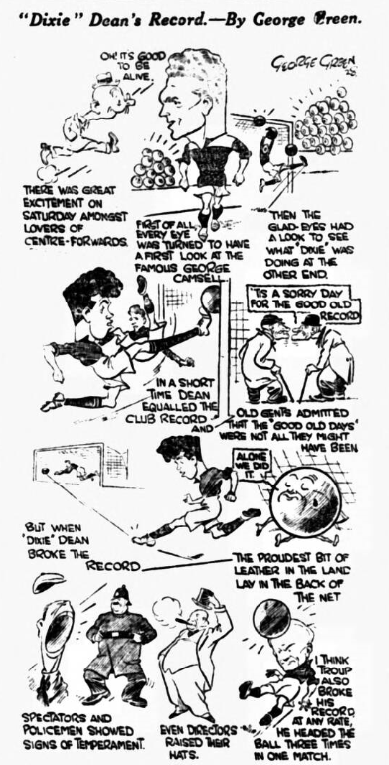
SHOCKS AND PLAYERS IN THE STOCKS
Liverpool Echo - Monday 09 January 1928
DEAN HIGH CALLING
GOING AHEAD
Bee’s Notes
Dean goes ahead. He got two, missed a hat-trick in the first quarter of an hour through hitting the woodwork with banging shots, and, finally, got a left-foot drive home, added to which came Irvine’s welcome header and Peacock’s long-range shot against his old side. One has to give chapter and verse for Dean’s continuous performance. He is standing on the 39 mark, thus getting in front of Freeman’s record and now needs four more to equal Harper’s First Division record, after which he will set out for the goals of his high calling, namely, the 59 record, held by Camsell in the Second Division series. Marked as he is he escapes injuries and continues to thrive on work; his best shots were those which cannoned against the woodwork. He is in a measure, a local, so is Virr; and now Rooney has, before his own record, shown what he can do in First Division football circles. I have preached Rooney until I have been well-nigh tired; he has played away from home against Villa, and at the Villa ground v. Hull, and he has done very well indeed; at home against Middlesbrough he put up a storming good game, equally good in defence and attack. Add O’Donnell’s lusty clearances and his inspiring dash-in at a moment when Everton were perplexed and you get another feature of the latest victory. Troup added much punch and pleasure, and Critchley has rarely played so well and definitely, his runs were concluded with wise centres and those who had a habit of decrying him should now realise that here is one who must stay on because he has proved his worth. He is steadily rising to seniority, and his final solo run well deserved the applause handed out by the crowd of about 45,000 spectators, who, at the conclusion, have Dean a special rallying note ringing in his ears as he went to the subway and the bath.
SMITH
It wasn’t a great match; Camsell showed you how stern he could be, and how quickly he darts to left or right. If anything, he was too unselfish; he should have taken a risk and a shot in one and the same movement. Camsell got four goals against Everton in the first meeting of the pair, but he did not play so well as he played at Goodison. McClelland was off his game, and Peace was damaged so that the attack was a thing of patches and shreds. Mathieson is a magnificent goalkeeper, and his backs for their size move about very freely Smith’s work was ideal. Peacock was Borough’s best half-back –they say he has made the side since he was brought into the fold- but Kennedy had a poor day. The blot on such an eventful game was that any player should be sent off the field. Such incidents are not common to us, and no one likes them.
BLYTH SPARTANS PLAYER FOR EVERTON
Newcastle Journal - Tuesday 10 January 1928
Everton have signed on E. Common, full back of Blyth Spartans. He is 20 years of age, and has only been a few months at Croft Park, prior to which he played as centre half for New Delaval.
BEE’S NOTES
Liverpool Echo - Wednesday 11 January 1928
Bee’s Notes
Everton will be without Forshaw and Virr for the tie at Deepdale, but the inclusion of Irvine and Rooney on Saturday against Middlesbrough proved satisfactory, and the team will be unchanged for the great battle with Preston North End. Rooney is developing into a fine half-back, and, if Irvine can curb the tendency to hold the ball too long, Critchley and Dean should not lack opportunities. The team is;- Taylor; Cresswell, O’Donnell; Kelly, Hart, Rooney; Critchley, Irvine, Dean, Weldon, Troup.
DEAN’S RECORD?
KNOCKING AT THE DOOR
After seeing Rooney’s clever show with the first eleven it makes one wonder how this young brilliant player has been kept out of the first team, writes “Reserves” But here is a bit more important news for you. Do you know that in the Everton Reserve eleven there is another such as Rooney, a schemer, with ball control and can get goals, this is the summing-up of a great full-back from across the Park; name, Easton; this young player is knocking at the First Division door. Please, “Bee,” for what it is worth, step in with this, as Everton might need an inside forward. No need to go to Scotland with open cheque-books; the goods are here. The burning question on the stand on Saturday was; Can a referee send a player off without a first cautioning him; in any case, it seemed a very trivial thing to send two men off for; we have seen more and worse cases than this. What of Cardiff? In any case, I think the referee spoilt the game on Saturday –far too much whistle-there were times when he penalized the sufferers by pulling them up for a foul. When they had dodged a hack or trip and got clean through, he gave a foul. Perhaps he was showing his authority.
FALLOWFIELD FOR ATHLETICS.
Yorkshire Post and Leeds Intelligencer - Thursday 12 January 1928
Fallowfield, Manchester, famous for over 30 years for its athletic gatherings, to continue to be sports arena. It has just been purchased from Lord Egerton by theManchester Amateur Athletic Grounds. Ltd., a company, to which the chief subscribing parties are the Manchester Athletic Club, the Manchester Wheelers’ Cycling Club, the Manchester City Police Athletic club, and the North of England Lacrosse Association. The district has been the scene of much building activity recently. Fallowfield was the scene of the memorable F.A. Cup final of 1893, when Wolverhampton Wanderers beat Everton, and thousands of people failed gain admittance to the ground.
INTERNATIONAL FULL-BACK SIGNED BY EVERTON
January 13 th 1928. The Liverpool Post and Mercury
KENNEDY OF ARSENAL
IRISH CAP WHO PLAYED IN LAST CUP FINAL.
Everton have strengthened their forces by securing the transfer from the arsenal of A.L. Kennedy, the left full-back, who participated in the cup final at Wembley last season, against Cardiff City. In theses days of keen competition first division clubs, who wish to keep in the forefront must have good reserves capable of filling vacancies in the senior side, and Kennedy I hope will prove a useful addition to the staff at Goodsion park. The negotiations were competed last evening. The amount of the transfer fee cannot be divulged, but no doubt the Everton club have had to pay heavily for a player who through he has made few appearances in arsenal's first team this season is in his prime. Last season Kennedy play in ten league matches, and previously he was arsenal's regular left back for a couple of years, and he was in his sixth season at Highbury. He joined the London club in 1922-23 and was so successful in his first important game that he was chosen for Ireland against Wales. Along with his club mate Mackie. He also played against England in 1925. Earlier in his career he played for Glentoran and crystal palace. Kennedy has been sought by a number of prominent clubs during the present campaign. He is twenty-five of age stands 5ft 8ins and weights 12 stone. A.L. Kennedy who joined Arsenal from the Crystal palace five or six seasons ago, gained two Irish Internationals caps, playing against England in 1925, and against Wales at Wrexham in 1923.
A CASE OF REVENGE
Liverpool Echo - Friday 13 January 1928
Bee’s Notes
Preston North End officials came through to me to ask “What’s t’ weather lak in Liverpool?” I replied that it was rationally fine, and got this answer; “It’s bin raining here for a dozen hours without a stop; the field is very, very, wet.” “That will suit Everton,” said I. “Why?” asked the official. “Because they are mudlarks, and the heavier the going the better they like it,” -“So do our lads,” came the reply.
That is the spirit to bring into the Cup-tie realms. Undoubtedly, on this showing a great Cup-tie should result. The Lancashire Cup defeat at Goodison Park when Dean was not playing, does not interest me much, because such form cannot bear a trace of respect when it is brought as evidence of to-morrow’s possibilities. It is no question of excusing defeats; it is simply a decision not to let such a game bear upon the real Cup-tie. Preston are a good side- a better side than for many a year; and they are clever in their inner forwards, for James is a box of tricks, and Russell, who scored two goals for Scotland against England at Goodison Park, has been brought back to the side to appear at inside right. Yet I fancy that both will be confined in their actions through the cleverness of the Everton half-backs and backs. Already the train officials tell me they have booked up six special loads of Everton supporters so that the 2,500 pounds taken in midweek, at Deepdale for a replayed tie between North End and Blackburn is likely to be passed in the treasurer’s book. A boy of thirteen has made up his mind to see the game, and asks me is there a “pen” there for such as he? There is not, but the police take special care of the youngsters at Deepdale. A great tie in prospect and a Lancashire battle that recalls the dim past; in 1892 Everton and North End played five times in one season- Lancashire Cup and English Cup included. Some ghosts will walk Deepdale to-morrow with their Trainer (goalkeeper) in charge! Everton; Taylor; Cresswell, O’Donnell; Kelly, Hart, Rooney; Critchley, Irvine, Dean, Weldon, Troup. Preston North End; Carr; Wade, Hamilton; Ward, Morris, Crawford; Reid, Russell, Roberts, James, Harrison.
EVERTON SIGN ARSENAL INTERNATIONAL BACK
Liverpool Echo - Friday 13 January 1928
By Bee
The transfer fee cannot be divulged, but no doubt the Everton Club have had to pay heavily for a player who, though he has made few appearances in the Arsenal’s first team this season, is in his prime. Last season Kennedy played in ten League matches, and previously he was Arsenal’s regular left back for a couple of years, and he was in his sixth season at Highbury. He joined the London club in 1922-23, and was so successful in his first important game that he was chosen for Ireland against wales, along with his club mate Mackie. He also played against England in 1925. Earlier in his career he played for Glentoran and Crystal Palace. Kennedy has been sought by a number of prominent clubs during the present campaign. He is twenty-five years of age, stands 5ft 8ins, and weighs 12 stone.
CENTRER-FORWARD PLAY THAT TRIUMPHS TODAY
Bexhill-On-Sea Observer-Saturday 14 January 1928
by "Dixie" Dean (The brilliant centrte-forward of Everton and England)
Everton's winning form this season has caused many experts to point to me as ":the reason for it." I hasten to say at once that no single man ever yet made a team. In fact, it is very seldom that a man alone ever succeeds even in scoring a goal. Ninety-nine goals out of every hundred scored are the direct result of celever teamwork -sound scheming by the inside forwards, or a good run and a well-placed centre by the wing forward, or some strategic backing-up by the half-backs. "Lucky" goals fall to the lot of most footballers. An error by goalkeeper or back places the ball at the feet of a man who has done little to earn the honour. I have had my share of these goals, and I certainly have all I can ask for in the way of backing up. When all is said and done, however, and the luck of the game has been accused of undue egotism if I say that the form is difference to the play of any team. There is a marked shortage of first-class centre forwards at the moment. Why?
Experts have many explanations to offer. For example, it is said that the new off-side rule has changed centre-forward tactics considerably, and that many of the older generation are not able to adapt themselves to the new methods. Again. the speed at which football today is played is pointed out as the reason for the shortage of centre-forwards. many men have the ball control and the shooting skill, but they just lack the natural turn of extra speed that enables the centre forward to take advantage of the opening.
Speed and Success.
Speed undoubtedly has a lot to do with success in the centre-forward position, but not quite in the way that many footballers of the game beleive. Team-builders, I believe, are barking up the wrong tree when they place too much reliance on speed. A man with the gift of speed is an asset in any team - a tremendous asset - but just because a man lacks extraordinary speed there is no reason to condemn him as a failure before he starts. What we need as centre-forwards are men who can play football.
I honestly believe that we are in danger of overlooking this fact. When I say that we need men who can play football, I mean that the first thing a centre-forward has got to realise is that football is a team game. If you take a man who has speed, ball control, and ability to shoot unerringly with head and foot, you have a footballer. if, to these talents, you add the ability to exploit tactical openings with the co-operation of the other players, to keep the line together, and to inspire the others in a crisis, you have a man who can play football. You see the difference? Few centre forwards can do all these things. Certainly not me! But it is the ideal I aim after.
Players Who Inspire
There is no room for criticism of one's team mates in modern football. If the other men are not playing up to the centre-forward as they should, it is more than likely his own fault. If a centre-forward makes a few mistakes when he has a clear opening in front of the goal, the other players can be execused if they begin to lose confidence in him and do not feed him to the extent that they should. Everyone fails sometimes. Very often it is the easiest of shots that fail you, because you are over-confident, and hold the ball too long, or do not take a careful enough aim, or fail to allow for what the goalkeeper can do in a very tight corner if he makes a spuerhuman effort. Undoubtedly every player has moments when he wishes he could kick himself. But if he is obviously trying his hardest every minute of the time, and achieving a certain success, he can rely on the co-operation of his team mates. Another fault that may mar co-operation in a team is any small habit -either on or off the field - that makes a man disliked. The other players have got to be glad to see the centre-forward scoring goals, or otherwise they will not give him the help that they should. The only way to win this co-operation is for the centre-forward to admit frankly just how much credit is due to the others for the part they play in his best and most successful movements. A centre forward must credit his team, and not accept all the praise that is offered to him by enthusiastic supporters who thinl that it is only the head or the boot of the centre-forward that has scored the goal.
Tactical Work.
Men must have confidence in their centreforward. They must feel, in a tight corner, that if only they could get the ball through to him, everything would be all right. And it is up to the centre-forward to earn this confidence. That is why I say that we need footballers —real footballers—in the centre-forward position. There is nothing like a little reciprocity in football as in other things. I mean, a man who expects to receive good passes should be able to give good passes. Inside men are clever schemers, and I am not suggesting that the centre-forward should attempt to do-their work for them. All the same it is much more encouraging to make openings for a centre-forward who takes a lively interest in the tactical proceedings than it is to strain continuously to get the ball through for a centre-forward who is doing little but wait for the ball, and who does not oven recognise a strategic and penetrative position when he sees it. A centre forward must work hard to win his place in a leading team, and keep it. It is nonsense to say that a man in a small team never gets a chance to be seen the men who matter, why try. I suppose that hen 1 was with ranmere Rovers I must have been watched by a dozen managers, until eventually I went to Everton. Goodison Park, the Everton headquarters, is near enough my own birthplace—Birkenhead—to make my present club the ideal one from my point of view.
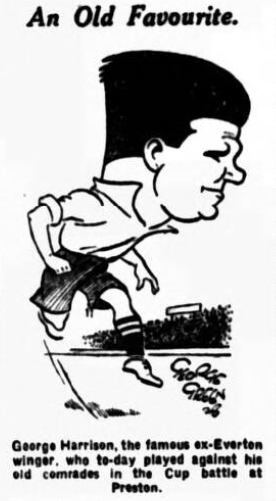
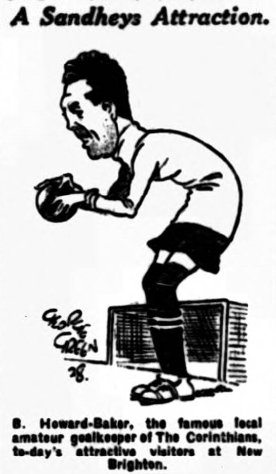
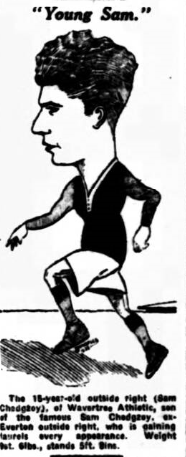
KENNEDY TRANSFERRED TO EVERTON
Northern Whig - Saturday 14 January 1928
Andrews L. Kennedy, left back of the Arsenal Club, has been transferred to Everton. The news will not come as a complete surprise to the followers of the North London team, for since the acquisition of Cope twelve months ago the young Belfastman has found it difficult to obtain a place in the First League side. He has, however, lost none of the skill which led to his being capped for Ireland against Wales in 1922-23 and on several subsequent occasions, as was evident in the Cup final at Wembley lasts season. He has taken part in only two First League games in the present campaign, and there have been many inquiries for his services.
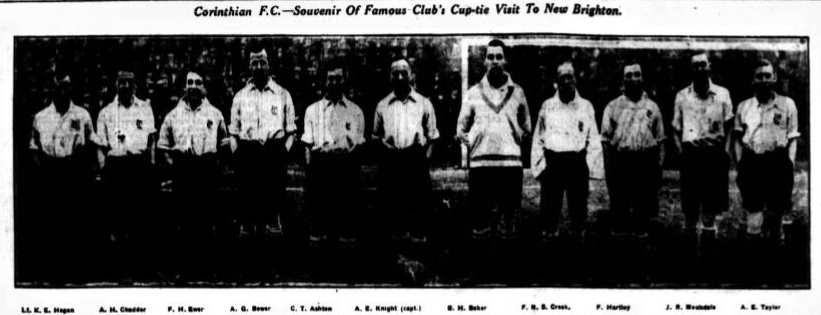
MURRAY MAKES GOOD
Derby Daily Telegraph - Saturday 14 January 1928
The success of David Murray as centre half in the Bristol City team, completes a triumph for three South Africans who were amateur tourists of this country in 1924-5 –the other two being (Riley (goal) and Hodgson (inside right), of Liverpool. Yet Murray was originally a centre forward, and was signed as such by Everton upon his return from the colony. Now he is keeping Walter Wadsworth out of the side at centre half.
EVERTON
Liverpool Echo - Saturday 14 January 1928
REVEIVAL OF OLD-TIME CUP FEUD AT PRESTON
NORTH END’S GALA DAY
HUGE FOLLOWING FOR EVERTON
By Stork
Everton; Taylor; Cresswell (Captain), O’Donnell; Kelly, Hart, Rooney; Critchley, Irvine, Dean, Weldon, Troup.Preston North End; Carr; Wade, Hamilton; Ward, Morris (Captain), Crawford; Reid, Russell, Roberts, James, Harrison. Referee;- Mr. A. Josephs, South Shields. It was a wretched day; in fact, it could not have been worse; but for all that there was a wonderful attendance, and not as small portion of it came from Liverpool, all manner of conveyances being chartered. I heard that sixty Ribble buses were booked up, and of course there was the usual excursion trains, which were full to the brim. There were many private cars also on the road. There was a slight sensation before the start of the game, when a small fire broke out in the stands, but it was really of no consequence, and one or two extinguishers only were necessary to put out the blaze. The ground was saturated through and through, which would tend to made accurate football a difficulty.
DIRECTORS TAKE BACK SEATS
Still there was plenty of enthusiasm shown by both sets of partisans; such was the effect of the rain that many of the Everton directors were unable to occupy their seats in the visitors’ Press-box, which is just at the end of the stands. The rain had beaten in during the morning, and several directors wisely decided to occupy seats further in the rear. (An interested spectator at the game was the former Everton player, Stan Fazackerley). Everton were the recipients of a wonderful reception, far in advance of that given to the home lot. Morris, the Preston captain, won the toss and took the advantage of a very slight wind. Everton made the first movement, that of their right wing, and when hart sent the ball up the middle to Dean, the League top-scorer beat Morris in a heading bout and set Irvine going. The latter returned the pass to Dean, who, however, was this time beaten by Morris, whose clearance was the fore-runner to a dangerous raid by the Preston right wing. Reid beat his man and made an accurate centre, which James fastened upon in a flash, and although he was tackled by about three Evertonians they could not get the ball from him, and there was every appearance of a goal until Cresswell came through the crowd and kicked clear. It was an exciting moment, and the home crowd were delighted by their favourities’ efforts. Critchly did some fine work on his wing, and beating Crawford and Hamilton, he centred. Dean did not get to the ball, so allowed it to travel on to Troup, whose shot was deflected by Wade, and Carr was able to leave his goal and make a simple clearance. Accurate ball control was no easy matter, but there were many fine movements despite this big handicap. Preston realized the value of the open game, and they slung the ball from wing to wing, which was good tactics on such a ground, and it nearly brought a goal, when Harrison opened out the game by kicking right across the field to Reid, who centred to Roberts and James, but they were not quick enough in taking advantage of the opening, although James hit the upright.
DEAD SET ON DEAN
The Everton wingers tried their best to set dean, but the Preston full backs and Morris set themselves out to stop him; and to a point they were successful, with the result that Carr had not quite so much work to do as Taylor, who had to fist out an effort by Reid. It was a daring sort of save, for the weight of the ball by this time must have been considerable; in any case, it was heavy enough to demand a strong punch. Preston were without doubt the more dangerous side in front of goal, with James touching the ball here and there in such canny fashion that he made openings. He made one in particular to Roberts, which should have undoubtedly proved fatal to Everton. He slipped the ball quietly to Roberts, who was bang in front of Taylor and had all the goal to shoot into but the best he could do was to place the ball into Taylor’s willing hands. Dean was being well watched, and got very little rope indeed, but when he did get a chance he made full use of it. He did not score the opening goal, but was responsible for it.
PRESTON’S MISFORTUNE.
It was a tragedy for Preston N.E., when Irvine gave Dean a chance to go through. Dixie went forward like lion, and, although he was badly angled for a shot, he took a chance, and to the consternation of all Prestonians, this shot, which was travelling wide of the post was deflected into the Preston goal by Ward at the end of seventeen minutes’ play. If this goal was the only one to count at the end of the game, Preston people will always consider that they were unfortunate, and even the most enthusiastic Everton supporter would have to agree. The North End were not quite so upset as they might have been, and they continued to attack strongly, but could not find a way through to the back of the Everton goal. They did all that was asked of them up to the penalty line, but once they arrived there it became a jumble. The Preston inside men, working too close together to get the best out of themselves for this method, enabled the Everton defenders to nip in time and again to make a clearance. Taylor had to punch clear from James, and had to kick away rather drastically from a lob by Harrison, but so far the Everton attack had been pretty safely held by the North End half-backs, and they gave their first corner at the half-hour. Dean had a tussle with goalkeeper Carr, who had been lured out of his goal, and he was a trifle fortunate not to have suffered to greater extent than a corner kick, for it only needed a shot at random anything near the goal, and there was not a soul there to have kept that shot out. However, he got a corner, but this created little of use to Everton, and the North End were soon hammering at the Everton goal again.
DEAN TAKES HIS CAHNCE
Reid had a glorious opportunity when O’Donnell miskicked. He went on his way, middle the ball and Harrison tried his hand at a shot. He put it on to Taylor who was unable to maintain his grip but Hart was on the spot ready to give him any assistance he might have required. Dean’s chances had been few, but at the end of thirty-one minutes he got a second opportunity, and he made no mistake with it either. His shot was not of any great power but it was well away from Carr, who could not move quickly enough on the sodden turf to prevent the ball from entering his net. Wade made a long shot at the Everton goal, and Taylor had to be sure with his catch to keep it from entering the net. A little bit of spleen was brought into the game when James jumped right into Jack O’Donnell, who came tumbling down to earth as if he was a log, but he was soon up and doing. Carr had to come out and save from Troup, and also to stop Dean from gaining possession. He had to make two attempts, however, before he cleared the danger.
AN OFFSIDE SUSPENSION
When Dean found himself in an offside position he refrained from moving, and seemed very annoyed when none of his colleagues essayed to go on. At this point Everton had been more severe on the Preston goal than at any other time, and with Critchley getting through it looked odds on his scoring for he had a clear passage straight to goal. He had, however, run himself into a wretched position, and Carr was able to save his oblique shot, Carr had to save it, for failure would have net disaster for Dean was standing between the posts ready for any slip which the goalkeeper may have made.
With a minute to go Troup had a shot, Dean had a shot, and Irvine tried a left foot effort from long range. Most of them, however, went on the wrong side of the upright, and the interval arrived with Everton holding a nice lead of two goals. It is passing strange that, although the North End has played quite well, they were rather inclined to overwork the ball. On such a ground the easiest plan was to make the ball work, and this was to a great extent the secret of Everton’s success.
Half-time; Everton 2, Preston nil.
When the teams returned each man was newly clad. I heard during the interval that O’Donnell had torn the ligaments just above his ankle and he was limping rather badly. Everton opened strongly and at the forty-seventh minute Irvine scored their third goal. It was a peculiar sort of affair, Carr came out to clear from the right wing.
IRVINE SCORES THE THIRD
Dean came up to hammer him and was so successful that Carr only made a half clearance, punching the ball on to Irvine who, with the goalkeeper out of his goal, simply lobbed the ball over his head and into the empty net. It was a fine idea on the part of the Irishman; in fact, it was the only one which could have brought a goal. Everton were not right on top, and Dean had a chance the like of which he rarely misses, but he could not work the ball quickly enough, due to the mud, and this enabled Hamilton to nip in and clear. This incident was followed by a determined Preston raid, and Roberts was going through to goal when O’Donnell successfully tackled him. There was an appeal for a penalty, but it was really not justifiable. Taylor had to save a corner kick taken by Harrison, and Roberts was through again, only to fail through lack of support. Preston made many efforts which were rather easily frustrated by the Everton defence, and then Carr, the Preston goalkeeper, made a really wonderfully fine save. Dean, who simply waltzed round Hamilton, and although running away from goal at the time, pout a great shot, which Carr turned away from his goal. He could not have been blamed in the least if such a shot had defeated him, for there was tremendous speed on it.
THE STATE OF THE GROUND
One could feel sorry for footballers on such a day as this, for the ground was nothing more or less than a squelchy heap of mud, which made ball-control no easy matter. Tip-tapping was quite out of the question, and it needed a big and sure punch to send it to the destination required. Carr made another good save when Dean headed in, but was obviously offside. Preston N.E made a change in their attack, Reid going inside-left, but it did not prove any more effective than it had been prior to the alteration. Kelly left the field for a few minutes, during which time Dean headed over the bar and Carr made a save from Troup. O’Donnell was spoken to for changing James in the lack. The game was of a scrappy nature, the Preston attack being quite unable to frame a movement which was likely to bring the desired result, although Reid tried to crash his way through, but it was all of no account. Dean gave Carr another warm handful, and it was only at the a second attempt that he succeeded in clearing the danger. Irvine missed a golden opportunity offered him by Dean and Carr had to catch a centre from Troup quickly to prevent Dean scoring another. Seven minutes from the finish, James who had been injured left the field. Final; Preston 0, Everton 3. Attendance, 37,715. Gate receipts 3,036 pounds, 2s 6d. Both records for the ground.
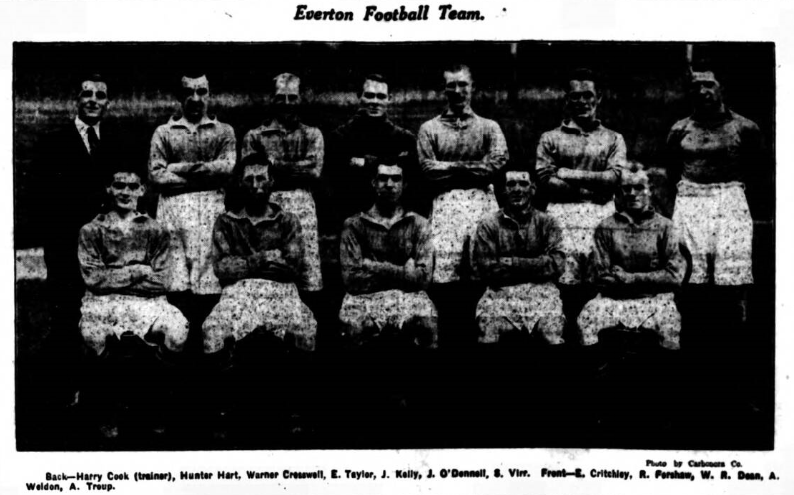
STUD MARKS
Liverpool Echo - Saturday 14 January 1928
By Louis T. Kelly
- Few clubs desire a drawn game in a Cup-tie and Everton, among others, were eager that it should be a fight to a finish at Deepdale
- Dick Forshaw won’t be ready for duty yet awhile
- One of the smartest in this respect is our own local man, Mr. W. E. Forshaw
- Everton’s position as League leaders is a rightful one, seeing they have won most matches, obtained most points, scored the most goals, and lost fewest.
- The Wolves hoped to have Wilf Chadwick back in the team for today’s match with Chelsea. The ex-Everton man, along with Weaver, has been out of the side for some time owing to injuries.
- In his best shooting form Chadwick can be a force for good
- Everton expected to-day to have one of their largest followings on record, and should not have failed through any lack of vocal support.
- Hope Preston have not knocked the H(e)art out Everton
- Many of the trippers at Deepdale would have their attention focused on George Harrison.
- Harrison’s form and record are alike wonderful when we consider that he came into the Everton side in 1913, prior to which he was a stalwart in the Leicester club camp along with Thompson.
- Everton, it is said, have another local full back in mind. Their local men have done well on the whole.
- Merseyside half-backs who have made good include such names as Makepeace, Bromilow, Virr and Rooney
- Ted Taylor, the Everton keeper, now holds a capital chance of picking up his fourth League championship medal
- Everybody must have regretted Weldon’s sending-off last week, for he is an awfully decent and unassuming fellow
- Goodison park has seen some famous players sent off in its day, and for offences the reverse of bad
- Even Stephens Bloomer’s name comes in the list, we fancy
- Cup or League? Which is it to be? Everton weren’t the only side in the running this morning for the “double” which seems to grow more difficult of attainment in each succeeding year
- A strong petition should be sent up for Weldon’s “reprieve”; the crowd, as a whole, were more “struck” than was either player, in a literal sense.
- Saturday’s goal was Bobby Irvine’s first since January 27
- By the way, Everton on Saturday exactly equaled their full season record of thirty-four points in 1926-27!
- Whilst they have already scored four more goals than in last winter’s complete League programme
- Dean has fourteen times scored two goals or more in a match this season.
- He further demonstrated on Saturday that he can hit the ball with his left foot almost as hard as with his right
- In the matter of speedy run and ball control Critchley has come along wonderfully well.
- One of the most pleasing features last week was the really clever shot put up by Young Rooney; his touches were neat varied, and effective.
- Only Leicester City and Villa have avoided giving any penalties away this season
- It was Jack peacock’s first League goal on Saturday since he did the trick v. ‘Spurs from inside right in the fifth match of 1925-26
- This was the match wherein Dean was introduced again at centre-forward, alongside Peacock after Broad had bene tried and found wanting in the preceding four fixtures.
- It would be interesting to learn Peter McWilliams’ views upon the relative merits of Dean and Camsell as seen through Goodison spectacles
- It was very amusing to follow the delighted ejaculations of a certain excited individual on the stand at Goodison last week every time Dean did something wonderful
- They ran somewhat as follows;- “Say, boy, you could swim the Channel!”
- “Say, boy you could fly the Atlantic!”
“Say, boy, you could win the tennis championship!”
“Say, boy, you could win the Grand National!”
“Say, boy, you could win the boat race!”
And so on
- Goalkeepers are by no means enamored at having a “nodding acquaintance” with Everton’s centre-forward
- Hunter Hart last week showed that he had more than one string to his bow by not only keeping Dean up to concert pitch with passes, but also compelling Camsell and Co. to play second fiddle
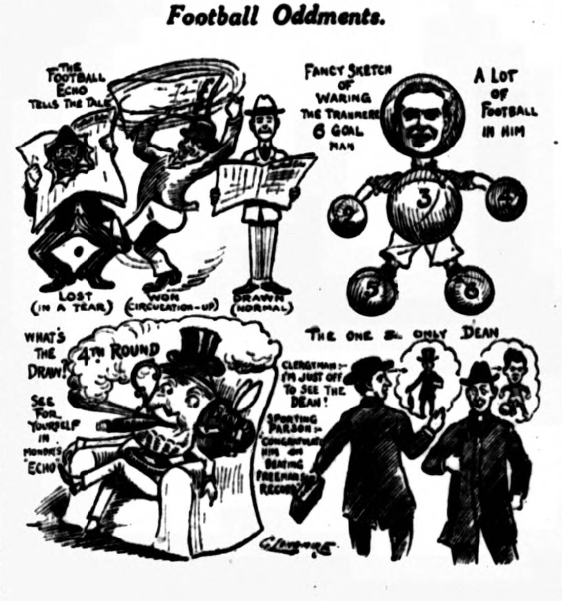
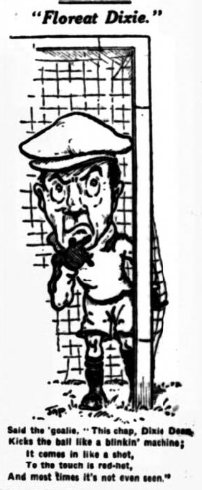
EVERTON FEAT ON A GOOD DAY FOR LANCASHIRE
Athletic News - Monday 16 January 1928
EVERTON RESOURCE
TEAM SPIRIT THAT PROVED PRESTON’S UNDOING
WARD’S MISFORTUNE
PRESTON NORTH END 0, EVERTON 3
By Pavo
In such a sea of mud as Deepdale became under the heavy rains and the cutting-up that the turf got, luck naturally played a great part in the actual result, but it was a wonderful game for all that, considering the difficulties that the teams had to master. During the first half hour North End were the more insistent side, for they played football which showed that all the finesse and scheming were not all on the League leaders’ side. Could they have shot with strength and certainly and not taken so long over dealing with the ball, not even Everton’s finely organized defence could have stood them off. Roberts had one great chance, if not two, to beat Taylor from close in, but each time the ball was driven straight at the keeper. It was here that Everton had a piece of good fortune. But they got another when Dean at last broke free to the right of goal and tried a shot from an acute angle that would have passed harmlessly outside the far post when young WARD, in his eagerness to make sure, interposed and turned the ball inside with Carr helpless to act. This was stark tragedy in more senses than one, for it gave Everton a lead they had not deserved and restored the poise they had lost under the forcing methods of their opponents.
THE INJURED.
A quarter of an hour later DEAN, who was being carefully watched, picked up a pass with his back to the goal and scored his 40th goal of the season with a low shot, and from this point Everton were riding more easily, especially as O’Donnell had recovered from a curious injury sufficiently to play on. O’Donnell stabbed the ground with his toe and strained the ligament above the ankle so severely that he was carried off on a stretcher. It looked as though he would be a permanent casualty, but he returned just before the first goal was scored, and in point of fact it was North End who suffered the greater disability, for James, a quarter of an hour before the interval, took a big jump forward as O’Donnell was moving to the ball which looked perhaps worse than it actually was. While the Everton back got off with a slight injury, James himself wrenched the muscles of his shoulder and thigh., and was of no more use in the game. Only those who know how dependent upon the little Scot the North End attack is could appreciate the influence of this accident upon the subsequent play. Whatever chance North End had of pulling the game back completely disappeared by this accident, and when, three minutes after the resumption, IRVINE lifted the ball into an untenanted goal after Carr had just beaten Dean by rushing out the result was almost in sight. North End never gave up striving but there was not that in their attack which foreshadowed goals, and all that emerged from the last half hour’s slogging in the mud was Dean’s attempts to widen the gap.
EVERTON RESOURCE
Whether Everton would have won in any case is, or course, a matter of speculation. But they were undeniably the better-ordered and more composed side, taking the game through. Their defence never got flustered; the men had a complete understanding; each pulled his weight and fitted into the general scheme; and there was more resource and finishing power. Taylor, Cresswell, Hart, and Dean were the dominating factors, but Everton’s strength lay in the fact that they were a team. Both the attendance and receipts were a record for the ground, in spite of the pouring rain and the competition of other ties close at hand. Preston North End; Carr; Wade, Hamilton; Ward, Morris, Crawford; Reid, Russell, Roberts, James, and Harrison. Everton.- Taylor; Cresswell, O’Donnell; Kelly, Hart, Rooney; Critchley, Irvine, Dean, Weldon, and Troup. Referee; Mr. AQ. Josephs, South Shields.
EVERTON SIGN COMMON
Athletic News - Monday 16 January 1928
Mr. Tom McIntosh strengthened Everton’s reserve forces by signing Edward Winchester Common, a right back of 18 years of age who learned his football with New Delaval and Blyth Spartans. He is 5ft 8in and scales 11st 5lb.
WHY EVERTON WON
Liverpool Echo - Monday 16 January 1928
By Stork.
Everton negotiated the first obstacle in their path to Wembley rather more easily than Preston people will admit. That opening goal, which they contend turned the whole trend of the game, will forever live in the their mind. While I readily admit that it is a catastrophe for a player to put into his own goal, it must not be overlooked that Everton augmented their score by two further goals without reply, which brooks of no argument. It would have bene different if Ward’s unfortunate gift to Everton had been the deciding factor. Then there would have been cause for tears out Deepdale way. Everton were Preston’s masters even during the fifteen minutes when North End ran riot and tested the strength of the Everton defence, which they found all too strong or them. They lacked a leader of Dean’s calbre a forward who could shoot hard, accurately, and swiftly. Roberts had more opportunities than Dean, yet he could not pilot the ball into the Everton goal. Why? Simply because Everton were masters. Many will say that Ward’s error took all the heart out of his colleagues. Nothing of the kind. Preston continued to play just as well as they had before Everton’s first goal, but if forwards will not except burst offering, then they alone have themselves to blame.
WHERE PRESTON FAILED
Preston had several opportunities of leaving Taylor beaten, even though the goalkeeper had shown a confident pair of hands and excellent anticipation when the tide was running against him. Once in particular Roberts had Taylor alone in front of him, and it seemed a much causer matter to find an empty space than shoot direct at the ‘keeper. Taylor, of course, was glad of the opportunity to get in contact with the ball, for I am sure he had little hope of being given the chance. This was not the only time that a Preston forward failed, and that is the reason of their defeat. If the rival centre forwards had been changed, Preston would have got such a lead in the early part of the game that defeat would have been well-nigh out of the question, for Dean put in some fine shots which Carr saved at his second attempt. Dean’s goal was just typical of the man. He ploughed his way through the mud, beat opponents as they came to meet him, and placed the ball well wide of the goalkeeper. No Preston forward could emulate his feat. They seemed mesmerized by Taylor, who has rarely played better. There are some goals which live in the memory. Irvine scored one that will linger in the mind, for it was the result of quick action and thinking. It was a lob over the goalkeeper’s head- the only sure method in the circumstance of finding the net. Two players were injured. O’Donnell dug his foot into the mud and strained his ankle, and James carried on almost up to “closing time” after operating at outside right for the greater part of the second half.
DISAPPOINTING ATATCK
The conditions were atrocious, and it would be unkind to be too severe on any of the players. I was very disappointed with Preston’s attack, which has earned a big reputation as a line playing clever football. They did nothing extraordinary with the exception of missing chances, and I have rarely seen Harrison so ineffective. Reid was the best of the line, for James was not the canny James he was in the Lancashire Cup-tie. Roberts has lost both his dash and his shot. Morris could not always held Dean, and the best half was Crawford. Ward suffered through nerves after he scored for Everton, but the full-backs and goalkeeper were quite sound. Everton played well to a man. Taylor was the international goalkeeper again; Cresswell’s positional play was perfect. He has never done anything better; and although O’Donnell was limping throughout, he never flinched, and he must have been in dire pain. Hart, Rooney, and Kelly were at their best. Hart being the master mind behind the gun. Dean, Weldon, and Irvine, who had to operate on a wicked piece of ground, often found the ground beating them, but it did not stop Dean from banging in shot after shot, Irvine is opening out the game nowadays. The wingers were more fortunate in that they had a bit of grass under their feet, and were better able to control the ball. Troup had a grand shot saved, and made some fine centres, as did Critchley, whose speed often nonplussed Hamilton. Everton F.C have gone to Cleveleys again for a rest-cure on the golf links.
ARSENAL V EVERTON CUP-DRAW
Liverpool Echo - Monday 16 January 1928
Everton play Arsenal away, Everton played at this ground the day before Christmas and lost 3-2. The pair have not met before in cup-ties.
EVERTON CUP-TIE
Liverpool Echo - Wednesday 18 January 1928
OVERWHELMING REQUEST FOR TICKETS
The Arsenal Football club announces that already more applications for seats for their coming Cup-tie against Everton have been received than can possibly be met. In the post this morning there were several thousands “orders” for reserved seats. Except that season ticket holders will have preference and apart from the tickets allotted to the Everton Club, the applications will be dealt with in strict rotation.
TEAM SHEETS SHOW NO CHANGES
Liverpool Echo - Wednesday 18 January 1928
EVERTON’S BIG RESERVE SIDE STRENGTH
Bee’s Notes
I have heard from Glasgow that Everton are searching for a right half of a saintly club, and that one of the most famous names in football records is associated to-day with the Goodison Park club. Everton are due to meet Birmingham on Saturday in the return League engagement. When the teams met at Goodison Park in September the leaders won by 5 goals to 2, and I hope they will complete the double. The Everton players are at present resting at Cleveleys, and the tonic thereby gained will be of great value in view of the heavy programme during the next few weeks. Virr has recovered from his injury, but Rooney retains his place in the side to visit St. Andrews, the eleven being the same as that which defeated Preston North End- namely, Taylor; Cresswell, O’Donnell; Kelly, Hart, Rooney; Irvine, Dean, Weldon, Troup. Virr has been included in the reserve team to oppose Stoke Reserves at Goodison Park, and it would seem that it has been decided to give him a run there in order to test his fitness. Kennedy, the new full back from the Arsenal, will also appear in the team in partnership with Common, another recent recruit. The Reserve team is; Hardy; Common, Kennedy; Bain, Griffiths, Virr; Roscoe, Easton, French, Dominy, Kendrick. It is not often that a team is absent from home for nearly five weeks, but, unless Everton force a draw at Highbury, that will be the experience of the Goodison club. Following the Cup-tie at Deepdale, they are away on Saturday, and visit London the following Saturday, while on February 4th they are due at Huddersfield. Not until February 11th have Everton a home engagement, and on that day Tottenham Hotspur are the visitors. On the date of the Highbury Cup-tie Newcastle United were due to visit Everton, but, of course, that match will have to be rearranged. Up to the Spurs’ visit Everton will have played seven matches away and one at home.
AN OLD SORE
Why, oh! Why do professional players under the Soccer code make such a pathetic spectacle when a goal is scored? Asks “Len Tone,” who adds; I was at the Everton-Middlesbrough match, and not being a Soccer fan, the sight of ten players rushing up and mobbing the player who put the ball in the net was not edifying. The whole team helps or should help in the actual score. Then why such a childish exhibition of hand shaking? This could very well be done in the dressing room after the match or, one man, the captain, might do it on the field- if it has to be done. Going into the enclosure I purchased a programme giving the players and their numbers, but when the teams took the field the players exhibited no numbers on their backs. I was told that the player took up their positions and that ought to be enough for anyone. It is not. In the Rugby League we manage both these things somewhat differently. Now, dear Bee, what about cutting out the bouquet throwing and having the players numbered? An old sore, debated long since in these columns, without effective result.
PRESTON NORTH END 0 EVERTON 3
January 19 th 1928. The Daily Courier.
FA CUP ROUND THREE
PRESTON HUMBLED
BLUES' SECOND-HALF SUPERIORITY GAINS THE DAY.
Everton might easily have won by half a dozen goals in their match at Deepdale against Preston North End. They might also have been three goals in arrears after the first quarter of an hour's. Such was the quick change that came over the game. The conditions were about as bad as bad could be. The drizzling rain in the morning continued without respite all the afternoon. The ground was inches deep in mud and water, and when the player headed the ball he was almost blinded with mud. The North End players commenced like lions, and finished like tame mice. They had hardly a squeak left. The Everton forwards were at fault in their tactics at the start. Their attempts at close passing were fatal on the mud-laden ground with the result that the Preston and backs had no difficulty in keeping them in check.
O'DONNELL DAMAGED.
The Preston forwards swing the ball about more freely and by sheer dash and determination looked like carrying all before them. They were considerably aided in their efforts by the misfortune which befel Everton in O'Donnell having to be carried off the field with a damaged ankle in the first few minutes of the game. For the first quarters of an hour the Preston forwards swept down on the Everton goal time after time, and Cresswell displayed coolness and clever anticipation against forwards who were desperately keen on gaining the confidence of an early goal. True, there were times when he was beaten, and then Taylor came into the picture, keeping out short and long range shots in masterly fashion, and making good his clearances. Everton's first goal after 17 minutes play was distinctly lucky. After Dean had rounded Hamilton, his shot from the right was going wide of the goal when it struck Wade the Preston right full back, as he was running to the goal, and the ball was deflected into the net.
SECOND GOAL NO FLUKE.
There was no fluke about Everton's second gaol thirteen minutes later. It was a typical Dean goal. Hunter Hart once again being the schemer to push the ball forward for Dean to dash past Hamilton and score with a strong shot. Everton were many superiors in the second half, when O'Donnell pluckily returned to his position, although limping badly. The second half had only been in progress a few minutes when Everton gained their third goal, which was the result of a brainy effort on the part of Irvine. Carr had rushed out to prevent Dean picking up a forward pass from Weldon, and when the ball went to Irvine if he had taken a pot at goal he would probably have struck either Dean or Carr. Instead, he lobbed the ball over the head of Carr into the empty goal. After this Preston had shot their bolt and never looked like scoring while Everton without unduly exerting themselves, might easily have added a number of goals. Carr made a number of saves from dean, and as showing the force of Dean's shooting it was only after a second attempt that Carr could clear Dean's-shots.
EVERTON SUPERIOR.
Even under conditions, which were, all against scientific play Everton were much the cleverest side. Taylor was sound in goal, and Cresswell was the best back on the field. Hunter Hart was seen at his best, never wasting a pass, and Dean added one more to his many triumphs, and Irvine, at inside-right, was one of the best of the Everton forwards, not holding to the ball too long, which was his great fault, but drawing the opposition off Dean and then placing to Critchley, who was more prominent than Troup as a raider. The chief failing of the Preston forwards was in finishing power. Roberts worked hard, but was over anxious in front of goal. James was not the great schemer he once was. He was completely subdued long before the end of the game, and Hamilton and Russell were disappointing. Crawford was the best of the half-backs, and the Preston full-backs were never more than moderate. Teams: - Preston North End: - Carr, goal, Wade, and Hamilton, backs, Ward, Morris, and Crawford, half-backs, Reid, Russell, Roberts, James, and Harrison, forwards. Everton: - Taylor, goal, Cresswell (captain) and O'Donnell, backs, Kelly, Hart, and Rooney, half-backs, Critchley, Irvine, Dean, Weldon, and Troup, forwards. Referee Mr. A. Josephs.
The Everton players leave Liverpool this morning for another week's stay at the Cleverlys Hydro, near Blackpool.
TONY WELDON SUSPENSION
Liverpool Echo - Thursday 19 January 1928
Bee’s Notes
Tony Weldon, the Everton forward, who was sent off the field with McClelland in the Middlesbrough game, at Everton, has been suspended for a week, dating from today. He thus misses the Birmingham game (Dominy will deptutise) and will be qualified for the Cup-tie at Arsenal’s ground the following week.
TICKETS FOR HIGHBURY
The demand for tickets for the Everton and Arsenal Cup-tie at Highbury, has already been heavy, and I am requested by the Everton club to state that tickets will be on sale at the club offices at Goodison park and J. Sharp’s, Whitechapel, today. The seats are numbered and reserved at 5s each. Telephone orders cannot be attended to, and it is well to remind applicants that s stamped addressed envelopes should be forwarded with the remittance for the return of the tickets.
DOMINY TO PLAY
January 20 th 1928. The Liverpool Post and Mercury
The suspension of Weldon efford Dominy an opportunity of renewing acquaintance with Everton's premier team against Birmingham to-morrow, when he will partner Troup in the left wing, and he should prove a capable substitute. Dominy made 28 appearances in the first eleven last season, and scored twelve goals, while this term, I believe he has been playing fine football with the central league team. Although not so fast as in his Southampton days Dominy is still the craftsman who makes openings for his partners and if he reproduces his last form. Troup and dean are likely to be provided with plenty of opportunities …meanwhile it is officially announced by the football association that a Weldon (Everton) and J. McClelland (Middlesbrough) have been suspended for seven days and one month respectively from yesterday for misconduct in the Everton and Middlesbrough league match at Goodison on January 7 th . Weldon will be available for Everton's cup-tie with the Arsenal to-morrow week at Highbury. But Middlesbrough will not have the assistance of McClelland in their cup-tie at Southport.
EVERTON “A” AT HOME
Liverpool Echo - Friday 20 January 1928
Everton “A” have an engaging match against St. Helens T, at Strawsberry-lane to-morrow at 2.45. Team; Davey; Davis, Curr, Curr (W.), Murray, Dickie, Millington, McGovern, Beardsworth, Templeman and Rose.

EVERTON AT BIRMINGHAM
Liverpool Echo - Friday 20 January 1928
Bee’s Notes
Everton go to Birmingham and I’ll put it on record that Birmingham is “My” team, and therefore I shall need to take a stern hold on myself when visiting St. Andrew’s. They had quite a shock from Peterborough, and when I asked them about it they said; “The side was built up of giants; six-footers, and they played splendid first-time football.” Maybe they’ll find Everton doing the same to-morrow when Dominy takes the place of Weldon. These are the teams;- Everton; Taylor; Cresswell, O’Donnell; Kelly, Hart, Rooney; Critchley, Irvine, Dean, Dominy, Troup. Birmingham; Tremlling; Womack, Randle; Morrall, Cringan, Leslie; Bond, Crosbie, Bradford, Davies, Elkie.
For the Everton-Arsenal Cup tie, Thos. Cook and Sons announce a dinning-car special (meals 2s 6d, optional), leaving Lime-Street on Saturday morning at 7.20 and arriving in “town” at 11.30. Return midnight, Fare 16s. For the match at Cardiff a special leaves Lime-street, 7 O’clock, on the day of the match arriving Cardiff 11.35. Return at 7.30 p.m. Meals 2s 6d. Fare about 14s 6d.
BLUES AT BRUM.
January 21 st 1928. The Daily Courier.
EVERTON'S GOOD PROSPECTS.
Everton ought to be cheered by the fact that Birmingham have won only one game on their own ground in the last three months. And that is not all the unhappy story. Birmingham have scored fewer goals at home (17) than Everton have scored away (26). As a matter of fact, the Brum boys have gained more kudos (in the shape of goals) in away fixtures (21) than they have at St. Andrews. Which is a curious thing. But then the Birmingham side is a curious one of late. At any rate, whatever hopes they have of avenging that 5-2 downfall sustained at Goodison Park on the fourth Saturday of the season might as well be put on the shelf for a year or so.
DOMINY'S CHANCE.
It was in the first meeting of the sides, you will remember that the St. Andrews's fellows popular skipper Frank Womack, was injured. The Blues, who have temporarily lost the services of Weldon are introducing Dominy, the old Southampton player, at inside left. The kick-off will be at 2,45, and the sides are: - Everton, Taylor, Cresswell, O'Donnell, Kelly, Hart, Rooney, Critchley, Irvine, Dean, Dominy, Troup. Birmingham City: - Tremelling; Womack, Randle, Morrell, Cringan, Leslie, Bond, Crosbie, Bradford, Davies, Ellis.
LAMENTS OF THE MINOR THREE
Sports Argus - Saturday 21 January 1928
LUCKY LEADERS
EVERTON’S NARROW ESCAPE AT ST. ANDREWS
“BLUES” BRIGHT WORK
VISITORS WIPE OUT TWO GOALS DEFLICIT
By “Old Blue”
Birmingham had an important engagement with Everton, the present leaders of the League and there was a big crowd to welcome the visitors. Everton were at full strength, except that Dominy appeared for Weldon the latter having been suspended. Birmingham had Briggs at outside right, but otherwise the side was the same as that which defeated Peterborough in the F.A Cup there was a high wind blowing which was likely to interfere with the play. Teams;- . Birmingham; Tremelling; Womack (Captain), Randle; Morrall, Cringan, Leslie; Briggs, Crosbie, Bradford, Davies, Ellis. Everton; Taylor; Cresswell (Captain), O’Donnell; Kelly, Hart, Rooney; Critchley, Irvine, Dean, Dominy, Troup. . Referee; Mr. A.H. Price, of Wrexham. There were about 30,000 people present when the teams appeared on the head and Womack by winning the toss, gained the advantage of a strong wind. Birmingham at once attacked through the enterprise of Crosbie, but Cresswell handled near the penalty area, and the free kick was soon disposed of. Then “Dixie” Dean treated the spectators to a fine solo effort. He took the ball into the penalty area only to shoot just over the bar, and the next time he made for goal he was upset by Cringan. The free kick taken by the leading League scorer went off one of the Birmingham players for a corner, but the home defence scrambled through the scrimmage safely, and when next Everton pressed Dean came very close to increasing his goal total. Everton continued to do the pressing and a strong shot by Rooney was making straight for goal, but Morrall deflected it for another corner. Everton kept the ball low, and their forwards moved rapidly to the attack, Birmingham’s defenders having a worrying time in the early stages. When the pressure was finally beaten off Davies was responsible for a bright bit of play, by which he beat the opposition, and he put across a useful centre, but it was not improved upon. Bradford and Ellis made a further effort but Taylor left his charge in the nick of time to clear, and after Bradford had been foiled close in Crosbie placed the ball beautifully for the top corner. Taylor, however, just managed to tip the ball behind for a corner. Critchley revealed great dribbling power, and succeeded in passing Randle and Leslie, but Cringan came to the rescue. Cresswell showed cunning in the way he stopped Bradford, but Ellis made another opening for his partner, and put in a lovely centre. Briggs however, had the misfortune to shoot wide. There was a free-kick against Everton for hands and Taylor stopped Bradford’s shot on the line. He just throw the ball clear as Crosbie charged him over the line. Birmingham carried out another bright raid, and Crosbie had bad luck in not scoring. Taylor had to dive full length to save his first shot and while he was still on the ground Crosbie’s second shot hit the goalkeeper on the arm, the ball then going outside. It was a very narrow escape indeed for the visitors who experienced another bit of luck soon afterwards. This time Bradford beat the defence and shot straight though hard at Taylor. The crowd, now approaching 40,000, were delighted with the sprightly attack of the home forwards, who set up a strong assault on a well-defended goal. A shot from Briggs hit the crossbar and twice more Taylor had to clear dropping shots. He was charged when about to fist one shot out and had to retire for a few minutes to have an injured arm dressed, during which time O’Donnell went into goal. In this period Birmingham persisted in their good work, and Briggs sent across a square centre from which ELLIS was able to head into the net, giving Birmingham the lead after 23 minutes’ play. Birmingham played a bright, open game, the ball being sent out sharply to the wingers, who responded well to the calls made upon them. During another raid Briggs drove in a terrific shot, and luckily for Everton the ball hit O’Donnell, who had resumed his normal position with the return of Taylor. A possible chance fell to Davies as the result of good play by Briggs but he failed to gather the ball, and Cresswell cleared what seemed to be a very dangerous situation. A dropping shot from Leslie landed on the crossbar, and for a long period play was all in favour of Birmingham, the visitors having to be content with rare and useless raids into the home territory. Once Dean received a forward pass, and though troubled by Cringan, he got in a long fast shot which went perilously near the target. Birmingham well deserved their lead, and made strong attempts to increase it, all the forwards doing smart attacking work. The half-backs played soundly, lending able support to the attack, as well as keeping a close vigil on the visiting forwards, especially the chief scorer. Irvine came close to equalizing with a snap shot, but the Everton goal had the real escapes. Taylor was fortunate enough to reach another hard shot from Briggs, who had got a good opening, and the goalkeeper had to send the ball behind to prevent Bradford from reaching it. A little later a possible chance came to Morall during another fierce goal-mouth tussles, but he shot high over, and Davies was close to the mark with a first-time shot. The home side continued the good work and a smart bit of play by the right wing pair left BRIGGS with an opening. He shot hard and straight and put Birmingham two goals in front four minutes before the interval, a lead their bright play well deserved.
HALF-TIME; Birmingham City 2, Everton 0.
Birmingham started off strongly in the second half. Briggs and Bradford put in some capital work, but they were unable to do any damage. The visitors broke away and Dean put the ball to IRVINE, who tried a long, rising shot which found a safe billet four minutes after the restart. The pace of the ball beat Tremelling. This success inspired the visitors to further efforts, but they were kept at bay. Birmingham forced a corner through Briggs. After Morall’s shot had just missed the target Bradford made a bold effort to increase his side’s score, but his shot went outside. A further attempt by the home forwards was only cleared after great trouble. End to end play followed. Both sides made big attempts to score, but the advantage still lay with Birmingham, whose attacks were carried out with confidence. Taylor was just in time to field a shot from Morrall before Ellis dashed up. Throughout the match the young Birmingham half-back revealed fine form. He followed up the forwards smartly and was also keen in his tackling. Cringan, who had shadowed Dean relentlessly all through the match, received as accidental kick in the face from the centre-forward in the course of a raid, but he seen resumed to continue his vigil. When Birmingham made a determined raid on the visiting goal Bradford was in evidence. Taylor dashed out to stop him and the pair collided on the line as the goalkeeper got the ball, with the result that both had to be treated by their respective trainers. Taylor was the first to recover and he straightaway had to clear his goal from a well-placed corner kick. Soon afterwards Bradford was able to resume. A clever attack by Birmingham ended in Taylor tipping over the bar a good shot from Ellis. Owing to the shaking he had received Bradford changed places with Briggs. At the other end some loose play by the defenders let in Dean, but his shot, happily for Birmingham was well off the mark. Briggs, however, came within an ace of another goal for Birmingham with a beautiful shot after work by Bradford. A shot from Crosbie was kicked out by Taylor, and Birmingham claimed the ball had crossed the line but the referee ruled against them. Everton went straightaway and succeeded in scrambling an equalizing goal through IRVINE. They did not deserve to draw on the run of the play.
Result; Birmingham 2, Everton 2.
THE GAME AT A GLANCE
After 22 minutes;- Birmingham 1, Everton 0 (Ellis scored)
After 41 minutes;- Birmingham 2, Everton 0 (Briggs scored)
After 49 minutes;- Birmingham 2, Everton 1 (Irvine scored)
After 88 minutes;- Birmingham 2, Everton 2 (Irvine scored)
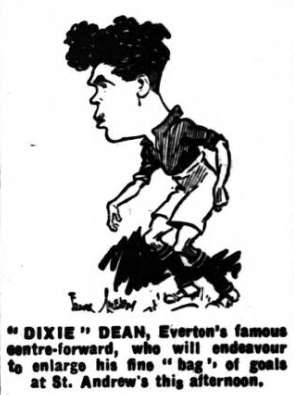
EVERTON
Liverpool Echo - Saturday 21 January 1928
DOMINY TAKES WELCON INSIDE LEFT POST
THE LEAGUE RACE
“BEE’S” DESCRIPTION OF BRUM GAME
Everton; Taylor; Cresswell (Captain), O’Donnell; Kelly, Hart, Rooney; Critchley, Irvine, Dean, Dominy, Troup. Birmingham; Tremelling; Womack (Captain), Randle; Morrall, Cringan, Leslie; Briggs, Crosbie, Bradford, Davies, Ellis. Referee; Mr. Price, of Wrexham. Everton are going to Brighton on Thursday for their Cup-tie with the Arsenal. Probably the Newcastle match at Goodison will be fixed up for February 8. Directors Wade and Sawyer joined the team at Birmingham, the eleven coming straight on from Cleveleys. There was a fluctuating wind at Birmingham, but at least there was no rain for the game. It was the first fine Saturday for months. The ground was perfect, and the amount of grass abnormal, Everton played Dominy for Weldon, suspended, and the Birmingham team that scraped through with Peterborough was unchanged. The referee was Mr. Price, Wrexham, and I noticed that the Wrexham captain, Robson, was present watching in the interest of the Cup-tie next Saturday.
HOT AND PERSISTENT ATTACK
Everton changed their colours to white with black facings. The wind was blowing across the ground, so that when Birmingham won the toss there was no point in it. Birmingham began rather smartly, and Davies was going through from Crosbie when there was a free kick against Cresswell for hands –a free kick debated. The ball was cleared and put up to the left position, where Dean broke through unaided and though hindered and handicapped, he went on to fire a beautiful shot that passed a trifle over. Dean came a second time, and was bowled over on to his shoulder. He got a free-kick a yard outside the penalty area, and again shot just over the bar. There was no holding Everton, who received shots from Kelly and Rooney, which made corners, and paralyzed the home defence. It was amazing that the first minutes had not produced a goal, because it was one long attack and shot. Leslie cleared after Irvine, Critchley, and O’Donnell had performed brilliantly, and even Bradford and Stan Davies had to come back to help the defence, and the only relief to the Brums came when Stan Davies gave Kelly the “dummy” and made a perfect centre. Cresswell cleared, but Birmingham came again through Bradford, whose winging shot was changed down, Crosbie tried a place shot to the right-hand side of the goal, and it was as well Taylor did not take a risk, because the ball would have entered the net.
A DRAMATIC SCENE
He gave a corner, but this was cheap payment. Critchly turned the attack with a lovely run just one step too far, so that Cringan kicked into touch. A long pass up the field looked troublesome until Rooney and then Cresswell worked a clearance. Cresswell dumbfounded the attacker, and Stan Davies gave a beautiful back-heeler to make further trouble for Everton. O’Donnell increased this by “hands” near to the penalty spot. Bradford took the kick and smashed the ball to the right where Taylor gathered it at the foot of the post and took a charge from Crosbie. Birmingham continued their pressure, and when Briggs centred, Taylor fell when saving, his face digging into the earth and blotting out his sight. Nothing looked more certain then a goal when Ellis ran up and the ball hit Taylor –a remarkable escape.
A “FATAL” MISHAP
Still adopting the offensive, Bradford raced down the middle and fired in a rocket shot, which Taylor surely grasped. Briggs took the ball well into the goal area and lobbed it on to the crossbar. Ellis missed an easy chance close in, and at the 22nd minute Taylor had to go off for an injured hand. He was only off one minute, but that minute was fatal, as it led to a goal. O’Donnell went into goal, and Cringan hurried an attack in which only Briggs and Ellis helped. Briggs centred, and Ellis headed beyond O’Donnell. This was misfortune, but for a quarter of an hour Birmingham had attacked without cessation, which was in direct contrast to Everton’s full pelt for the first five minutes. Birmingham had been very poor in front of goal, but this lead against ten men was very refreshing fruit. Relief came when Cresswell passed square to Troup, whose low shot was collared by Tremelling. Next Dominy pushed the ball forward for Dean to give a charge and a first-time shot, but he headed the ball over the bar. This was a good, quick try. The wind won a great nuisance, and so was Birmingham’s persistency and bitterness, but the Everton defence now got a bit of rest, and Irvine twice shot outside, the ball travelling at a great rate, and in each case being only half a yard out of the goal-reckoning.
AGEM FROM BRIGGS
Everton got a further shock, however, when O’Donnell was well beaten by Briggs and Taylor by coming out first parried the shot and next ran across his goal to prevent the ball trickling in or being put through by Ellis. Critchley made a good run, and Rooney helped in a bright attack. Little had been seen of Everton’s left wing. Briggs and Crosbie combined beautifully to pass through the Everton ranks, and Briggs took the final shot, which was a gem of direction and fierceness. Thus two minutes from half-time the one goal had been made into two. Half-time Birmingham 2, Everton 0.
POOR FORWARD FORM AT BIRMINGHAM
TAYLOR CARRIED OFF
VISITORS EQUALISE LATE IN THE GAME
Birmingham got a rich rally when they left the field. After the first five minutes’ brilliant attack by Everton, the change of scenery was most pronounced. Most of the damage had been perpetrated by Crosbie and Briggs, a very lively dual turn. On resuming, Rooney headed out, and Referee Price gave a splendid offside decision. Cresswell made a splendid trick clearance.
IRVINE’S FINE GOAL
The position of the game changed in a curious but simply way. Troup had dug up a centre for Dean to head back to Irvine, who had been unable to accept it, but at a second effort Dean passed to Irvine, who ran in two steps, and then fired in a glorious goal. Rain began to beat upon the players, and after O’Donnell had saved manfully from Briggs after Rooney had been beaten, Irvine had another chance to become famous, but he dribbled on, and Dominy was just too late to take a chance. Irvine made another mark, but delay meant that he became covered. Cringan and Dean had words, and after the referee had signaled for a free kick against Dean, there was a throw down. Womack and Randle defended sternly, and Taylor picked up at the foot of the post to prevent a goal, and escape Ellis. Everton were having more of the game than at any previous point, which suggested that Birmingham had run themselves out. The game opened out and Critchley, as well as the Everton halves, were seen to better advantage than in the first half. Birmingham had to ward off sustained pressure. However, the Everton forwards were not shooting, and Irvine twice made poor attempts at goal, while Troup wasted centred, which is most uncommon to him.
TATLOR INJURED
Dean was crowded out as he was about to make the equalizer after pressure which had lasted twenty minutes and when Bradford made an attack Taylor picked up easily, but was laid out in a collision with Bradford. It was a severe blow, and it looked as if Taylor would have to go off for a second time. Ambulance men were sent for and Taylor was carried off. Taylor recovered from the blow, and was cheered for turning his attention to Bradford who was still off the field. Taylor made a further good save from Ellis. Everton had a good chance of equalizing, but in their haste each of three men missed. Briggs made the best shot of the match. Final; Birmingham 2, Everton 2.
EVERTON “A” V. ST. HELENS TN
Liverpool Echo - Saturday 21 January 1928
At Pirrie Park. After fifteen minutes McGovern opened the score for Everton from a good centre from Rose. The visitors were trying hard to equalize, but met with a good defence. Nearing the interval, Everton 1, St. Helens 0. Final; Everton “A”3, St. Helens Town 0.
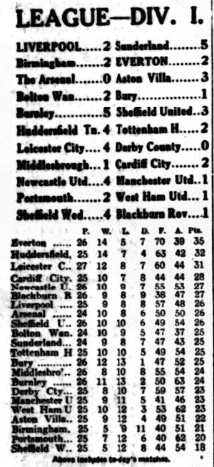
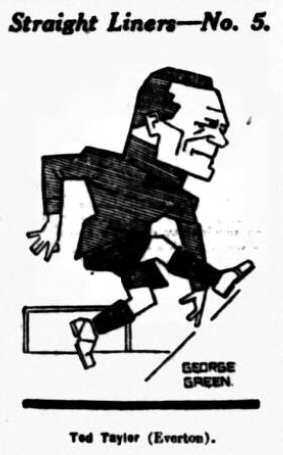
EVERTON RES V STOKE RES
Liverpool Echo - Saturday 21 January 1928
Stoke were the livelier in attack and strong in defence. A number of their efforts were lucky to be got away. Eyres should have given them the lead when with an open goal he shot wide. Everton took the lead after twenty-five minutes, French scoring. Eyres equalized for Stoke.
Half-time.- Everton 1, Stoke 1.
Twenty minutes after resuming French gave Everton the lead.
EVERTON RESERVES V STOKE RESERVES
Everton’s latest acquisition, Common (Blyth Spartans), and Kennedy (Arsenal) had a severe baptism at Goodison Park. Stoke, during the first half, by splendid constructive play, subjected the home defence to a severe grueling. It was fortunate that both men showed good defensive qualities at full-back.
STUD MARKS
Liverpool Echo - Saturday 21 January 1928
By Louis T. Kelly
- A great controversy is going on in Glasgow circles, a friend states as to whether McGrory or Dean is the greater ball header.
- Not having seen the Celt, personal opinion is that W.R.D stands alone in his Grory, so to speak
- The writer had an interesting chat with Jack Bell the other day
- Bell was one of the greatest forwards ever, for he possessed speed, dribbling and shooting powers in equal measure
- Although he was chiefly seen at outside right and outside left in Everton’s service, bell was at home anywhere in the forward line.
- Strangely enough, however, his favourite position inside-right, was the only one in which he was never capped for Scotland
- Kennedy, Everton’s new back, was the only Arsenal name missing, his place on Saturday being taken by Cope.
- Birmingham’s win over Everton at home lasts season was their first such since the war.
- Everton’s three goals scored at Preston read all the better when we remember how hard it has been to get goals of late against Hamilton and Co.
- To-morrow afternoon, at 3 sharp, Merseyside’s great “Football Sunday,” Service will begin in County-road, Church.
- James Jackson, the Liverpool centre-half, is the speaker, while Everton’s centre-half, Hunter Hart, will be the chairman.
- That very popular local “find,” Albert Virr, is to read the lesson, and it is expected that a number of other popular Reds and Blues will be present
- The Liverpool pivot is a very able speaker, and will discourse in chief upon the evils of gambling and drink.
- Appropriator enough, to-morrow will also mark the coming of age, of Dean, the Everton centre-forward, and congratulations will be forthcoming in this connection.
- The soloists will be two other members, of the Stud-marks family –Miss Queenie Kelly and Mr. Theo Kelly, the latter of whom is this year’s chairman of the Hospital Cup competition.
- Sheffield Wednesday haven’t won an away cup-tie for over twenty years (that would be somewhere round about the time they walked off with the Cup at Everton’s expense at the Palace).
- The Blades that day had their Wilson very much in evidence, what time his Everton namesake was, perforce, found sulking in his tent.
- It is no pleasant thing to be twelfth men in a cup final
- That nothing succeeds like success has again been shown by the fine attendance returns at Goodison Park this season, and that despite one of the worst winters on record from a weather point of view.
- Adjudged on the published approximate attendance figures in the aggregate, one estimates that the gross receipts should ere long touch the 30,000 pounds mark for this 1927-28 campaign.
- Everton’s task at Huddersfield a fortnight hence will be a heavy one whatever the state of the ground happens to be, for the ex-champions have been showing wonderful form of late.
- Both at Anfield and Goodison Kelly and Company have shown us a taste of their quality this season.
- But curiously they were seen in a different light on our two grounds
- For whereas at Everton they began moderately and finished strong it was the other way round at Anfield, where for twenty minutes or so they showed dazzling form only to fall away and receive a 4-2 whipping.
- In the match at Goodison it will be recalled that Deans cored two wonderful goals, although perhaps one had best cease thus describing Dean goals. The “wonder” we hope will only come in when he fails to get the odd such goal or two in a match
- Blackburn Rovers are the only Lancashire team to beat Everton this season
- Over thirty years have elapsed since any club won the League and Cup in the self-same season
- The last happened in 1897, when Aston Villa overcome Everton in the Cup final
- Strange to say, the Cup has never gone to any of the top seven clubs in Division 1 since the war
- Kennedy, the new Everton back, made his First Division debut with the Arsenal on the Birmingham ground, December 2, 1922.
- George Harrison began with Leicester City in 1911
- “All London” should be there to see the Arsenal v Everton tie
- The Blues were a bit unlucky to lose there 3-2 on Christmas Eve, after a match that began in fog and finished up with a “heated incident” or two.
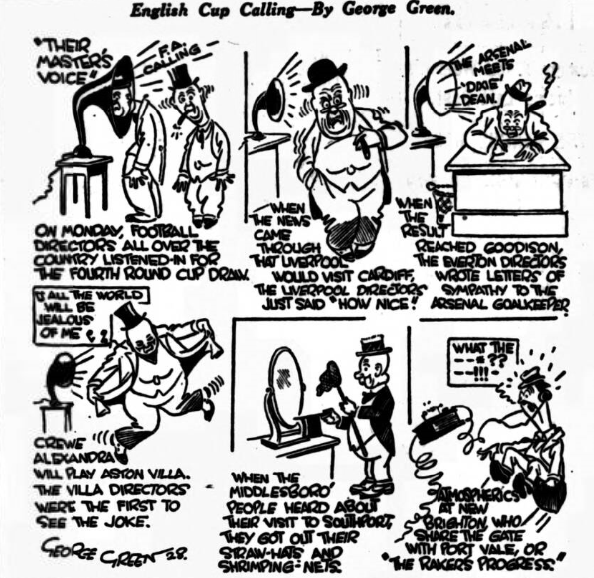
BEE’S LETTER-BAG
Liverpool Echo - Saturday 21 January 1928
“Anfield Red” write;-Whilst congratulating Dean, I do at the same time think that it would only be in fairness to Freeman, who held the record before Dean, if each time the Everton man’s record is mentioned there should be some distinction made between the two, because nobody can say, I am sure, that it was not harder to get goals in Freeman’s time when the old offside rule was used than it is to-day under the new, when there is only one full-back to beat. Then another system is the “brag” we keep hearing about Virr coming up from the A team, I am one who contends that the A team is simply run to keep some men “in.” How many are there who have made good with the A team this last three years? Perhaps you will be able to add one or two names to the following, who have appeared with the Central League eleven; Jones, Davies, Hughes, all goalkeepers; French, Templeman; then after-these, how many are there who have played with the first eleven? It might be of interest to the Everton supporters to know that the present Norwich captain in a former A team player, who never got any further, and another one in lee, who is playing regularly with Bolton’s Central League team. The letter was playing with Hargreaves (Newtonle-Willows) when he was given a trial, but the same as many more from the same club, he was turned down without just cause.
- Where does the money go that the Corinthians share in the Cup-tie?
- How many goals were scored in Freeman’s time in the First Division for the first half year, and how many in the first half of this season?
- Answer.- 1. To build up Crystal Palace ground. 2. Freeman 22 in half season
ALIVE.
“Blue Shirt,” of Netherton, writes;- Could I ask you, as an old supporter of the Everton Football Club, to allow me to express through your always valuable notes my satisfaction on seeing the directors are fully alive to the fact that if they are to keep their place at the head of the League they must have capable reserve men, and am glad to see they have signed on a reserve full-back; but to my mind they are sadly in want of inside forwards if they are to hold their place, as Forshaw is not available on account of accident. I agree with what a correspondent from Birmingham said in your notes a few days ago. “Everton went inside forwards.” As I know you are a very good judge of the game, I should like to know what is your opinion on this subject. The letter speaks for itself.
BLACK AND WHITE
The correspondence you have been pestered with must make you wonder who you are! And what you are? reading between the lines, which I enjoy from January to December, writes “United we stand.” I gather that it is all pure rivalry between two clubs. I am not a local, but if there’s any favouritism it is Everton. Why, I do not know. When a youngster in school we used to pick sides in football. We named our sides Everton and Newcastle. I had then not the slightest idea where Everton was, but the name clung on as if there were only one club in the country! Then I got interested in big football. I used to spend my Saturday penny on the “Football Echo,” and wait by the station. Give credit to rivals for the position they occupy, and not pull one’s own club to pieces just because they are below. They blame “Bee”; you are a “Blue”; you are a “Red.” You are “Black” in their minds. Thank goodness, you’re a “white” man to me and many thousand others.
BIRMINGHAM CITY 2 EVERTON 2
January 23 RD 1928. The Daily Courier.
EVERTON LUCKY TO DRAW.
DISAPPOINTING DISPLAY AT BIRMINGHAM.
O'DONNELL IN GOAL FOR TWO MINUTES, AND LETS ONE GOAL IN.
Everton were lucky to draw at Birmingham. They gave a frost disappointing display. With a lively ball, and in a high squally wind, the Everton forwards never seemed able to settle down. Birmingham had the lion's share of the attack, and maintained the lead until a minute before the end. In the first few minutes it looked as though Everton were going to have matters easy. They opened with severe pressure, but no goal was forthcoming. The pendulum then swung the other way with a vengeance. Taylor made a number of splendid saves, once from point blank range, and more than once likely shots were charged down by the backs. Birmingham's first gaol came after 23 minutes' play, when Taylor was off the field, having his hand bandaged. O'Donnell who had taken his place, was beaten by a shot from Ellis, who had connected with a centre by Briggs. Ten minutes later Briggs added a second, ending a brilliant dribbling movement with an oblique shot, which gave Taylor no chance.
BLUES IMPROVE.
Everton had more of the play in the second half, but Birmingham continued the most convincing side. Tremelling ought to have saved both of Everton's goals, which were scored by irvine. The first came in the first few minutes of the second half. Tremelling made no attempt to keep out a high dropping shot from 35 yards range, the ball going over the goalkeeper's head. The equaliser was scored in the last minute of the game as the outcome of a scrimmage in the goalmouth. When Irvine headed in the ball struck Tremelling on the shoulder, and was well over the goalline when the goalkeeper recovered and kicked out. The Everton players, rather than having benefited by their week's special training at the Cleveleys Hydro, Blackpool appeared to be slower than usual.
DEAN TOO WELL SHADOWED.
Dean did not show his usual prominence. For one thing he was effectively shadowed by Cringan and for another he was neglected by both the inside men, and did not receive the support he usually receives from Hunter Hart at centre half. Irvine besides scoring both of Everton's goals, was brilliant in his footwork. Dominy fell far short of the standard of Weldon, whose place he took, while Troup, and Critchley on the wings were never more than moderate. Kelly was the best of the half-backs, Hunter Hart having an “off” day, and Rooney was never a match for Briggs and Crosbie. No fault could be found with the Everton full-backs, and Taylor, in goal gave one of his best displays. The Birmingham forwards were desperately keen with Bradford a dashing leader. Morrall and L. Leslie was a fierce tacklers, and the Birmingham backs were sound. Teams: - Birmingham City: - Tremelling, goal, Womack (captain) and Randle, backs, Morrall, Cringan, and Leslie, half-backs, Briggs, Crosbie, Bradford, Davies, and Ellis, forwards. Everton: - Taylor, goal, Cresswell (captain) and O'Donnell, backs, Kelly, Hart, and Rooney, half-backs, Critchley, Irvine, Dean, Dominy, and Troup, forwards. Referee Mr. Price.
EVERTON RESERVES 2 STOKE CITY RESERVES 2
January 23 rd 1928. The Daily Courier.
CENTRAL LEAGUE
After twice taking the lead, Everton had to be content with sharing the points at Goodison Park. Taking the game throughout the result was quite equitable, the Stoke forwards –well led by Johnson, the ex-Liverpool centre –frequently troubling the new Everton defender Common and Kennedy, however created a good impression on their first appearance. The opening goal followed a corner kick, the ball after hitting the upright, crossing the face of the goal for French to apply the finishing touch. After previously missing the easiest of chances, Eyres headed the equaliser only for French to again place the Blues ahead. Towards the end of the game the home side fell away and Stoke made great efforts to level matters. With but two minutes left, for play Hardy, hampered by several opponents, threw clear, but Eyres pounced on the ball and drove into the net. Everton had a sound half-back line in which Virr stood out prominently. French was a live raider. Everton: - Hardy, goal, Common and Kennedy, backs, Bain, Griffths, and Virr, half-backs, Roscoe, Not-Known, French, Dominy, and Kendrick, forwards.
DIXIE DEAN'S BIRTHDAY.
Dundee Evening Telegraph - Monday 23 January 1928
W. R. (" Dixie ") Dean celebrated his 21st birthday yesterday. He, with other EVerton and Liverpool players, was present at a footballers' " Sunday " service in a Liverpool church, Which Hunter presided, and Albert Virr read the lesson.
EVERTON FRIGHT
Athletic News - Monday 23 January 1928
BIRMINGHAM 2 EVERTON 2
By Brum
The 40,000 spectators at St. Andrew’s saw a game which entertained them to the last minute. There was some exceptional forward work, and although Birmingham had an overwhelming advantage in the opening half, and should have gained a winning lead, they could not withstand the challenge of the visitors in the second half, and finally to be content to share the points. Birmingham should make a serious effort to make their shooting powers reasonably efficient. Some of the misses before the interval by Bradford, Crosbie, Briggs and Davies would have been amusing if they had not been so serious, for Birmingham cannot afford to throw goals away at the moment. Once Crosbie had the ball on the line and could not kick it through without finding Taylor’s hand. Everton did not shoot too well taking the game as a whole, but they did not make the absurd mistakes of the home forward line. ELLIS and BRIGGS scored for Birmingham in the opening half, and although IRVINE reduced the lead in the first few minutes of the second portion, it looked as though Everton would not get level, for the Birmingham defence was particularly alert.
IRVINE’S PAIR
Two minutes from the end, however, IRVINE sent the ball into goal, and although Tremelling looked to have saved on the line, the referee held that the ball had crossed, and so Everton avoided defeat. Everton were not the better side on the day’s play; indeed, Birmingham might have won by a fair margin but their forwards had curious ideas about what to do with the ball in front of the posts with the goalkeeper apparently beaten. They never seemed to be capable of doing the right thing. If Everton had similar chances they would assuredly have notched half a dozen goals. In the art of bringing the ball into goalmouth Birmingham have few superiors, and in this particularly game they showed form in midfield that they have rarely excelled, but until they can master the art of direction they will often lose or draw matches which they should win. Bradford led the line capably, and Briggs did plenty of clever work. Davies was frequently far more subtle than was necessary. Ellis met the ball well and up to a point, Birmingham’s attack verged on the brilliant. Cringan was in fine trim against the volatile Dean, and he is to be congratulated upon the way in which he held up the most dangerous centre-forward of the day. Leslie also showed neat and skilful footwork, and he faced the Everton right wing pair gallantly. The full-backs were sound, although at one point Womack made an inexplicable series of weak clearances. Tremelling was at his best, for he, like Taylor, was always busy, but the latter gave a far more brilliant display than the Birmingham goalkeeper ever had a chance of revealing. His ubiquity was amazing; even when Crosbie stood on the line he raved, and when he ran out to meet Briggs he seemed to charm the ball to his grasp. O’Donnell was in goal when Birmingham’s first goal was scored. Cresswell played a game worthy of his best reputation, and he repeatedly got his side out of menacing situations. Critchly did some skilful work, but Irvine was the most practical of the visitors’ forwards. Dean was not so effective as he usually is, and Troup wasted his centres. Everton; Taylor; Cresswell (Captain), O’Donnell; Kelly, Hart, Rooney; Critchley, Irvine, Dean, Dominy, Troup. Birmingham; Tremelling; Womack (Captain), Randle; Morrall, Cringan, Leslie; Briggs, Crosbie, Bradford, Davies, Ellis. Referee; Mr. Price, of Wrexham.
LEAGUE LEADERS HARD PRESSED BY “BLUES”
Birmingham Daily Gazette - Monday 23 January 1928
LUCKY TO ESCAPE DEFEAT AT ST. ANDREW’S
CRINGAN THWARTS DEAN
BIRMINGHAM 2, EVERTON 2
By Forward.
If Everton can rely upon the same good fortune or the remainder of the season as they experienced at St. Andrew’s then they are assured of the championship or the League. Their display against Birmingham was far removed from what was expected of a club at the top of the tree, and that they were lucky to share the points is to put it mildly. There was never any question after the first few minutes as to which was the better side, and had Birmingham met their just reward for what was undoubtedly a good contest and best display for a very long period, then they would have won byt a handsome margin, whereas they had to rest content with one point. Though they failed to achieve the success which was their due, Birmingham revealed such good form as to give hope for further Cup successes and a speedy uplift in the League chart of merit.
PROFITABLE NEW METHODS
It was indeed pleasant to see Birmingham drop the tinkering methods which have brought such poor results in the past. Instead, the swung the ball about to great advantage and varied their methods of attack sufficiently to keep their opponents constantly guessing as to the next move. Crosbie’s constructional play, combined with the dash of Briggs and Bradford was a feature of Birmingham’s sprightly attack. The inside-right opened out the play admirably, and rarely failed with a pass to either wing, while he also revealed himself a keen shot and a robust finisher, as Taylor will testify. The long passing game gave the extreme men much more scope than they have been accustomed to and it need hardly be said that they appreciated it by responding smartly to all calls made upon them.
BRIGGS TO THE FORE
Briggs proved himself a real terror to the opposition. He and Crosbie made a most effective wing showed an understanding that was at all times as convincing as it was effective. There can be no doubt the presence of Briggs made a big difference to the attack. He was a real “live wire.” The left wing pair got in plenty of smart play though Davies was rather irritating in the way he finished up some of his best moves. Bradford was a much more effective leader than Dean, who was subdued to such an extent that he was rarely in the picture at all. Birmingham’s attack was ably supported by a powerful half-back line, in which Morrall figured quite prominently. Cringan fulfilled his mission of stopping Dean to perfection, and the crack scorer, as a result, had a most unhappy time. Lesie, too, was sound, and the home defence left nothing to be desired, Womack and Randle putting up a stubborn resistance to all the efforts of the visitors.
TAYLOR’S FINE WORK
But for the fine work of Taylor in goal Birmingham would have taken the lead much earlier. While the Everton backs appeared to be somewhat rattled at the fierceness of the Birmingham attack the International goalkeeper was as cool and safe as anyone could wish, and he got his back through several tight corners, especially in the first half. He also had a few strokes of luck. Briggs for instance, twice hit the crossbar. Ellis scored the first goal for Birmingham after 22 minutes’ play while O’Donnell was acting for Taylor, who was off the field of play having an injury dressed, and Briggs increased the lead four minutes before the interval with a beautiful shot from an awkward angle. Soon after the interval Irvine reduced the lead with a long shot, and in almost the last minute of the match the same player scrambled the equalizer to give Everton a point they did not deserved. Just before the equalizer arrived, Crosbie put in a shot from close quarters, and though Taylor kicked the ball away it was claimed that it had already crossed the line. The home players made a big appeal for a goal, and they were supported by the spectators best placed to see, but the referee ruled against them. Everton; Taylor; Cresswell (Captain), O’Donnell; Kelly, Hart, Rooney; Critchley, Irvine, Dean, Dominy, Troup. Birmingham; Tremelling; Womack (Captain), Randle; Morrall, Cringan, Leslie; Briggs, Crosbie, Bradford, Davies, Ellis. Referee; Mr. A.H. Price, of Wrexham.
EVERTON HAVE GOOD FORTUNE AT BIRMINGHAM AND SOME BAD FORTUNE AFTERWARDS;
Liverpool Echo - Monday 23 January 1928
WEEK-END RESUME; SHOULD EVERTON TRAIN AT HOME
Bee’s Notes
Everton’s escape on Saturday. They drew, and didn’t deserve to. That is a frank statement of the case, my lords and gentleman. They equalized in the last minute. That in itself is, no crime, because it was one of ninety minutes, therefore valid. But the goal was a soft one, given them by the man Dan. Tremelling, who doesn’t seen to have recovered his old self after an absence of some weeks, while young Hibbs was hitting the high lights. Tremelliing not only gave the second goal; he should, might, could or ought to have saved the first from the same player, Irvine. Everton were not themselves; they missed the little man who works on the left; they missed the half-back line’s best schemes; they struck a bad day all at once and altogether. They were lucky to find Birmingham unable to take the easiest of chances; they were fortunate to find Taylor alive and kicking after he had bene knocked out; they were not constructive, convincing, nor yet were they the real Everton at all. I wonder of this special training at Cleveleys had made them forget their home ties; something had happened to transform the team. Hart himself did not do well, and Rooney could not keep time with that lively pair Crosbie and Briggs. Crosbie is a quick thinker, a slow mover, but a canny worker who wastes no time to energy; Briggs does all the scurrying and scampering at Crosbie’s will, and Briggs, at outside right, is a very dandy dribbler and shooter.
DEBATABLE VERDICTS
Rooney could not catch the electric pair, and O’Donnell also found his quick short stab methods of tackle of little avail to stem this right wing tide which overflowed with football skill, pace, discretion, and pleasure for the crowd of 40,000. You see Birmingham were desperate; they had sunk low and their Cup shock had made them realise that this was a time for urgent messages to the opposing goalkeeper, Taylor had a sheaf of them, all marked- “Express” and that he was only beaten twice is a testimony to his grand and glorious fielding. It was a triumphant note for the sporting Taylor, and the local people said to me afterwards; “The country has no better; he should be in England’s side.” Taylor has had a wonderful fortnight. Birmingham, however, claim that they beat Taylor’s third time the grandstand referees in their thousands said Taylor kicked the ball away when it had passed the line, which they said they could see. Well, I’ve got some medals for my eyesight, but I could see no line- and I was nearer to the incident than the grandstand referees, and at a better single. Moreover, I saw Taylor’s swinging foot behind the place where the goal line should have been, and that backwards swing probably gave the spectators the wish for their further goal. I am content to leave it with Mr. Referee Price and for confirmation I tackled ex Referee Howcroft and eh said at once, “No goal.” The truth was that Birmingham had played so dominating a game for long spells of the first half, as against Everton’s amazing burst for five minutes solidity, that they could not take a rational view of a close incident.
WHERE THINGS WENT WRONG.
Even when Everton were enjoying a truly wonderful burst of attack, Tremelling was not considered, for the ball did not come his way- it went near, that was all. On the contrary, when Birmingham settled to a half hour of attack without relief, Taylor was fisting them out and catching red-hot drives from forwards, who sometimes found a footing and booting ability that did not seem to be in their locker, judged by some of the puerile efforts to make easiest of chances into goals. Now, this was not the real Everton, Dominy did not fit the unusual position- he is an inside right or centre, and he could not get Troup going against the trusty back, Womack’s who has a dependable young man named Randle at the side. Dean was a marked man, they patrolled his best; Cringan forgot there were twenty-two players, he lived with Dean, who was still Everton’s most dangerous forward. Yet, here’s a funny thing; Irvine was in his most earnest mood, and much of his weaving and working bore the stamp of brilliance- but it didn’t fit the scheme of things because he went on to dribble a trifle longer, thus his timing of the drive came at the moment the defenders had gain put up the shutters! Irvine scored twice, which is a good day’s work for any man; he was the outstanding figure of the attack in one sense, yet I put it on record that he had two clear-cut sharp chances of shooting from easy range when he did not essay a shot. Critchly got through a steady day’s work in which he was not over employed, and Kelly and Cresswell took the remaining honours in a game that was mainly Brums’, and although Everton had so much more of the attack in the second half compared with the first, I place this entirely to Birmingham having outrun themselves and thus made Everton appear to be playing better than was actually the case. Birmingham were a nippy side with a brilliant right wing and good backs; they were the sharper half back line, and once again, they tell me, the side played well because they were up against a crack opposition. Having said this, all without malice aforethough, who shall say me nay when I say I am not Blue, I am not a Red, but merely a follower of old Birmingham colours? I don’t want to see a more tasty match than this, and I do want to see the old style of Everton in its proper form, by which I mean there is construction in the forward and half-back line; on Saturday there was none. Perhaps Weldon’s fortunate and welcome return next Saturday will make some difference. Their Cup-tie opponents fell to the mercurial Villa side at Highbury, so that I have high hopes of the Everton side making victory or a draw.
Is special training worthwhile? I hear that there is a movement on foot on the part of the Everton players to ask the directors to let them stay in the homeland in the near future, if not for the rest of the season. The officials of the club will doubtless fall in with the suggestion that training at Cleveleys is not the wish of the majority. The matter has been debated before to-day, and the real underlying though is that the players in surroundings other than home have only to have a spot of bad weather to find the time hanging heavily on their hands. I wonder what that feeling is! Bradford, the Birmingham centre, was walking about yesterday, and told me he felt well enough to play at Wrexham in the Cup-tie on Saturday. He had a fearful bang on the side of the face and ear. When a party of Everton officials were returning from St. Andrew’s to New-street Station their motor car ran into some boys, one of them was caught by the back of the car. Within four minutes he was in the General hospital. Ted Taylor had a lump as big as an egg on the back of his hand when he left the field, stripped, and saw O’Donnell deputise for him in goal for that fatal minute at St. Andrew’s.
McGovern, Everton’s seventeen-year-old Chester schoolboy, played as fine game for them at inside left on Saturday and scored two goals.
DEAN THREE GOALS
January 24 th 1928. The Liverpool Post and Mercury
Dean's nets three goals for England against the Rest in the trial game at West Brom yesterday, before about 12,000 spectators, England winning 5-1.
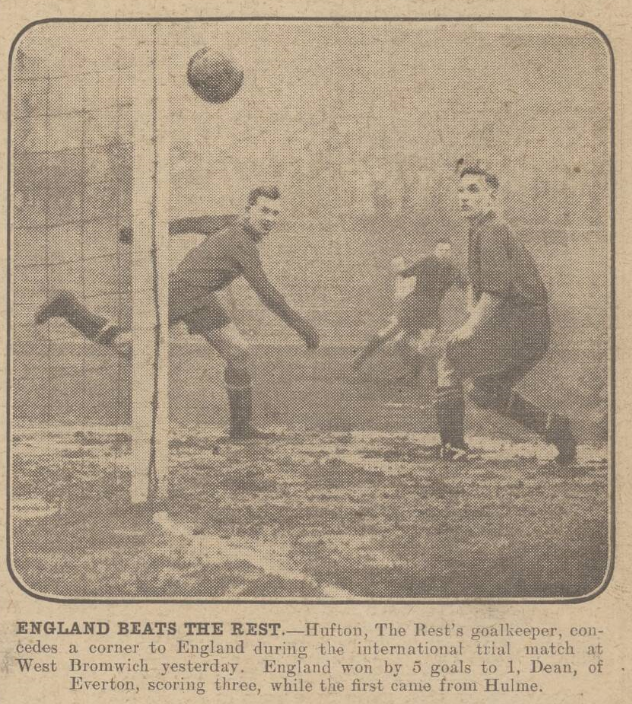
MR. CUFF CONFIDENT.
January 24 th 1928. The Daily Courier.
EVERTON'S CHAIRMAN HINTS AT A GOODISON PARK REPLAY .
Mr. W.C. Cuff, chairman of the Everton Football Club, was quietly confident when interviewed. The Everton players are in first class conditions, and spirit and we are looking with a certain amount of confidence to the included in the next draw. We least think we are strong enough to bring the Arsenal team to Goodison Park. Still, the players are not underestimating the severe task, before them. They appreciate the Arsenal are a powerful team, but they do not regard the Arsenal recent victory as retreating any superiority in any department of the team. The Everton players also recall they have some remarkably well away from home, and that if only they can repeat the form shown in some of these away games they will telling their loyal supporters home with them in a happy frame of mind.
BUCHAN'S BREVITY.
Charles Buchan, the Arsenal captain, was reticent. All he would say on his teams chances was “We are looking forward to a good match from beginning to end.” He spent yesterday afternoon with his friend and clubmate, Blythe, playing a round of golf at Hendon. The recent heavy rains have not paturf they ground staff. The ground has fine drying properties, and the turf should be in find condition if the rain falls after midnight. On the whole Arsenal are not worrying unduly, about their encounter with Everton. They are depending on the form shown by their players at Christmas when they defeated Everton 3-2 to carry them into the fifth round.
LIVERPOOL OR EVERTON FOR SOUTH AFRICA?
Liverpool Echo - Tuesday 24 January 1928
Mr. French, the president of the South African Football Association, states, in an interview, that it is probable that arrangements may be made, through the English League, for a First Division club to visit South Africa next season. If he gets a favorable reply to a cable sent to England, an invitation will be sent to Liverpool F.C. or, failing them, Everton F.C. Mr. French says he has reason to believe that both clubs are desirous of visiting South Africa if an itinerary can be arranged that will not clash the All Blacks matches.
EVERTON’S PLAN
Upon inquiries being made of Everton F.C., Mr. T. McIntosh, said that up to the present the club had heard nothing of the invitation from South Africa. Everton had been contemplating a tour during the summer, and had several invitations from clubs on the Continent, but nothing as yet from South Africa.
DIXIE SCORES HIS TWENTY-FIRST
Liverpool Echo - Tuesday 24 January 1928
FAMOUS CENTRE-FORWARD’S MAJORITY
“Dixie” Dean, the famous Everton footballer, holds his 21st birthday party to-night in Blythe Hall, Upton-road, Claughton. Nearly 200 guests will be present in the hall, which is decorated in blue and white, to help him celebrate his majority. Fellow-players and officials of the Everton Club and representatives of other branches of sport, as well as a long list of personal friends are among those invited. Dean, who played in the international trial at West Bromwich yesterday, was in bed having a good rest after yesterday’s exertions and prior to this evening’s festivities when an “Echo” representative called this morning, but the remainder of the family were bustling about and it was necessary to move cautiously for fear of upsetting a heap of cakes or jellies. Despite the large number of guests “Dixie’s” mother is doing her own catering. “I always have done, for the girls’ weddings and all the twenty-first parties,” she said. “Dixie” whose birthday fell on last Sunday, in a teetotaler and a non-smoker.
VIRR BACK
January 25 th 1928. The Liverpool Post and Mercury.
With the exception that Forshaw has not yet recovered from the injury, which has kept him out of the field for some-weeks, the Everton team will be at full strength for the cup-tie at Highbury against arsenal on Saturday. Virr has fully recovered and he will resume at left-back in place of Rooney, while Weldon is now available, and he will resume his old position in place of Dominy…meanwhile W.R. dean, the Everton centre-forward celebrated his coming of age yesterday: - his birthday was on Sunday-when his parents gave a reception at Blythe hall, Upton road Birkenhead, a number of the Everton team were included among a large party of more than 120 who sat down to dinner. Mr. Shipley sprang a surprise upon the party by presenting dean with an illuminated address. In reply England's centre-forward had little to say in fact his speech was one of the shortest in history, this was it''lets get on with the dinner'' Mr. j Cahill the well known referee also paid a tribute to England's centre-forward.
EVERTON BRING BACK VIRR AND WELDON
Liverpool Echo - Wednesday 25 January 1928
Bee’s Notes
And jumping from sorrow to joy land let me briefly refer to the Dean celebration last night. Outside Park station I inquired from the snow-driven police-constable, “Blythe Hall, sir?” He replied, “Take a U, or a C, car and I hope you enjoy yourself, because it is W.D.’s ‘do.” And who might W.D. be? Asked!. “Our Bill, said he. Everyone seemed to be trekking towards Blythe Hall, and soon everyone was Blyth and gay. Dean simply cannot escape the limelight. Now he appeared in limelight, flashlight, and candlelight. Father, mother and sisters were there, surrounded by all the Birkenhead lights, and when Mr. Shipley made the presentation of an illuminated address and Mr. Jack Cahill, the well-known athlete and referee, had paid tribute to the central figure of the moment, I paused to be jealous of a fine athletic figure in a fine settling and only twenty-one years to complain of. Dean’s popularity is something more than a sickly variety that comes to the average star of the theatre or sporting world; it is something abiding and something that is compelled through the chain of youthful endeavor. We say lucky fellow; yet he has made his own luck and everyone agrees that here is a well-ordered, balanced boy- sorry, man –unspoiled by those who would forget that he is a man and that popularity is the one thing that quickly vanishes and is forgotten. Football friends were there- shop-mates, playmates, folk from the Comet side that provided so many stars- three of them nearly caused me to take the wrong train home last night! –and I had no massive key such as Dean had presented to him! It was a round of joy, and many would vote for it to be a “hardy annual.” Cresswell, Hart, Irvine, O’Donnell, Raitt and others of the local club were present to support their centre, who found other measure of support from family and other ties. He’s a lucky fellow, but everybody likes him and believes in him, none more so than father, Uncle Brett, and the former schoolmaster, Mr. McTeare.
With the exception that Forshaw has not yet recovered from the injury which has kept him out of the field for some weeks, the Everton team will be at full strength for the Cup-tie at Highbury against the Arsenal on Saturday, Virr has fully recovered, and he will resume at left half in place of Rooney, while Weldon is now available, and he will resume his old position in place of Dominy who deputized for him last week. With Irvine showing a disposition to get goals, it would seem that the forward line is up to standard –Taylor; Cresswell, O’Donnell; Kelly, Hart, Virr; Critchley, Irvine, Dean, Weldon, Troup.
Everton go to Brighton on Thursday and return Sunday. The Cup-ties may be played in a gale of wind again. Mr. Chapman was busy inquiring about Everton’s present-day style of movement. He gives more time to opposing forces than some do to their own side.
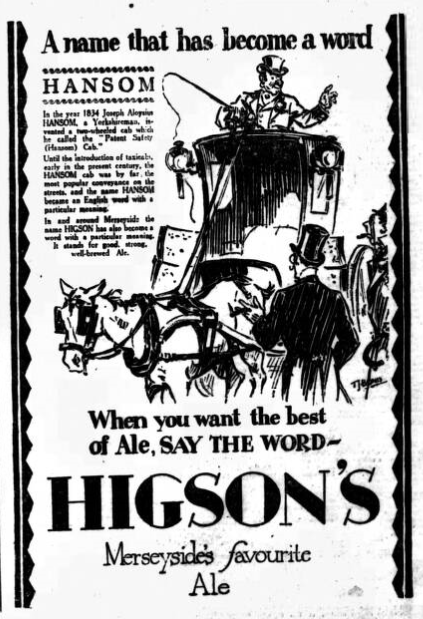
BEE’S NOTES
Liverpool Echo - Thursday 26 January 1928
Everton being unable to realise Irvine to play for Ireland, J. Dunne, the Sheffield United and former New Brighton man, will occupy the outside right position in the Irish team.
EVERTON’S ONE NEED.
“Blue Peter” writes’- No, this is not a growl. This is the first time I have had the pleasure of writing you and only wish to give you my view regarding Everton after attending a few reserve matches. I do not think that the directors have any cause for anxiety regarding positions other than outside left. If Troup is unable the club will be in a hopeless position, as they have no reserve capable for a first team match. Let the scouts get busy and find a suitable substitute for Troup and never mind the other positions. (What about Dickie of New Brighton?). The directors must have been pleased with the display of Kennedy and Common. Taking into consideration that this was their first match and together at the (not with an experienced partner as is usual). They finished the match with honours. I must endorse other supporters views when they say Easton is knocking at the first team door. Roscoe is also, for that matter. Moreover the pair have an excellent understanding. Wishing you and your notes every success. ‘Nuff said.
STRAWBERRY-LANE
THIS IS WHERE Everton “A:” play Marine on Saturday. Many people have asked whether Everton Res play at Goodison Park. They do not! The ground is being rested, and the Marine “A” match will post the cup-tie scores.
Marine play Everton A. at Strawberry line, at 2.35. Meet Pierhead 1.30. Team; Greatrex; Fell, Graham, Almond, Southern, Hackett, Parry, Garvey, Clayton, Moneypenny, and Nichols.
Everton from; Hughes, Davies, Davies (R.E), Curr (R.), Curr (W.), Murray, Dickie, Millington, J.E. McGovern (their seventeen-year-old Chester school-boy), French, Templeman, Kendrick, and Cooper.
MISCELLANEOUS
Blyth News - Thursday 26 January 1928
A Liverpool football scribe writes with reference to “Billy” Easton, the local ex-Spartan inside right; “In the Everton Reserves X1, there is a schemer, with ball control, and who can get goals. This is the summing-up of a great full back from across the Park, named Easton. The young player is knocking at the First Division door. Everton might need an inside forward, but no need to go to Scotland with open cheque books; the goods are here.”
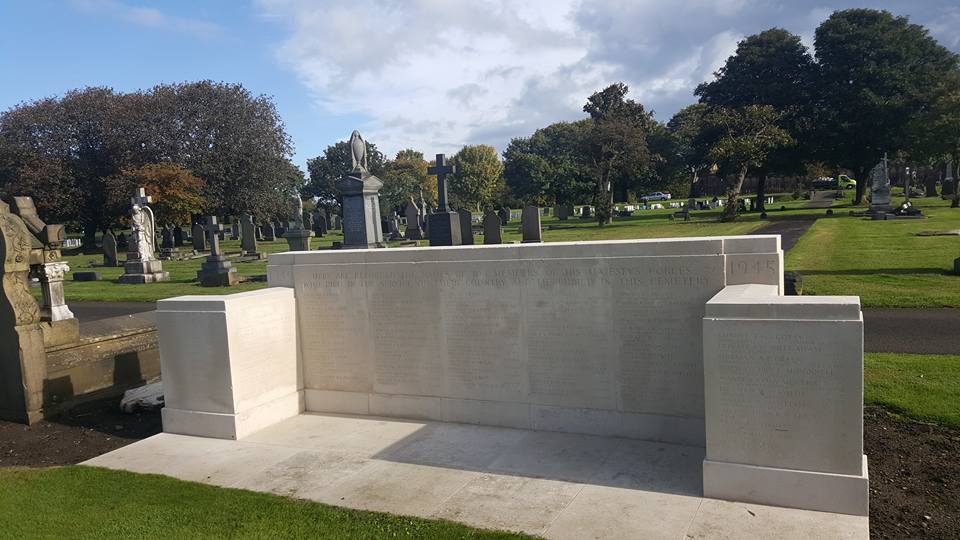
Dr Baxter's Grave at Anfield Cementary
EVERTON DIRECTOR DEAD
Dundee Evening Telegraph - Friday 27 January 1928
Dr James C. Baxter, director and one of the founders of Everton F.C., died at Liverpool to-day. He was formerly a member of the Council of the Football Association and one of the pioneers of the professional soccer code.
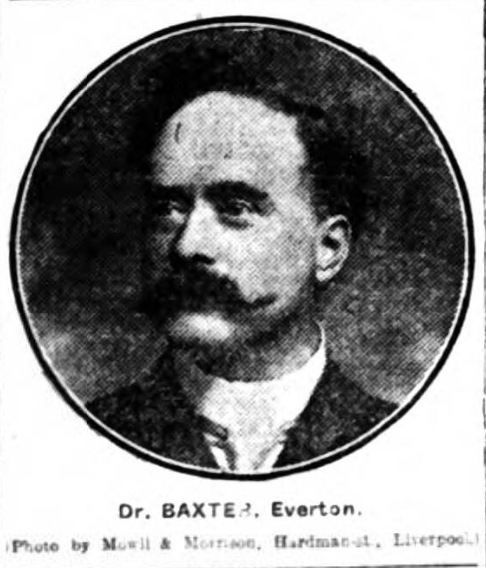
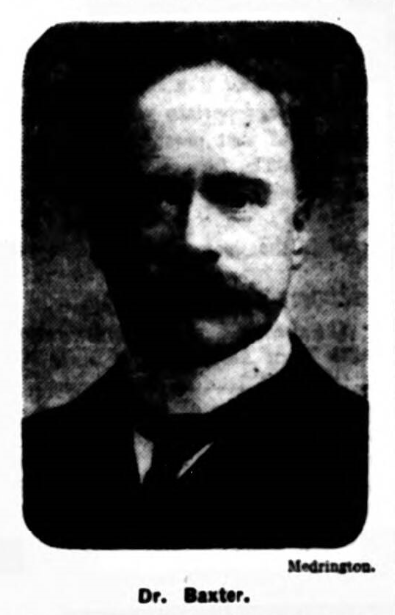
F.C. DIRECTOR AND EX-COUNCILLOR
Liverpool Echo - Friday 27 January 1928
DR. BAXTER’S GREAT WORK FOR EVERTON CLUB
The death has taken place of Dr. James Clement Baxter, Liverpool ex-councillor for St. Anne’s Ward, and an Everton F.C. director. Dr. Baxter was known in the city through an enormous practice, and through his sporting activities in connection with the Everton Football Club. He had a great love for football, and did not confine his attentions to the local club, for he was for many years a member of the Football Association and a member of the Football League Management Committee. He was for a generation the Everton club’s doctor, and on relinquishing this position he was succeeded by his son, Dr. Cecil Baxter, who has a brother doctor (Cedric) and a sister. Dr. Baxter was extremely popular with all sections of the community, and although he had not in recent years taken a live concern in the management of the Everton Football Club, this was due entirely to the fact that he was a very busy man, and could not spare the time for his football love.
SPLENDID SPADE WORK
He was seventy-one of age. Although he had been ailing for some time he had not been confined to his bed for more than a week or so. His football history goes back to 1890, when he joined the Everton board, and accomplished some very splendid spade work. In 1912 he was presented by his colleagues on the board with a handsome present to celebrate his twenty-first year of service as a director. When the Everton club made the plunge and left Anfield-road they had no money and no ground, and it was then that the guidance of Dr. Baxter did much to help to build up the fine organiastions they have at present.
TRIBUTE TO HIS WORK
Dr. Baxter worked with other earnest workers like Messrs W.R. Clayton, J. Davies, B. Kelly, and J. Coates, and it was a tribute to his foundation work that he kept his position on the board to the time of his death, in spite of the rarity with which he attended club meeting in the last ten years. He was for fourteen years a member of the Liverpool City council, representing St. Anne’s Ward, as a Liberal, from 1906 until 1920, and has been a justice of the peace for the city since 1906.
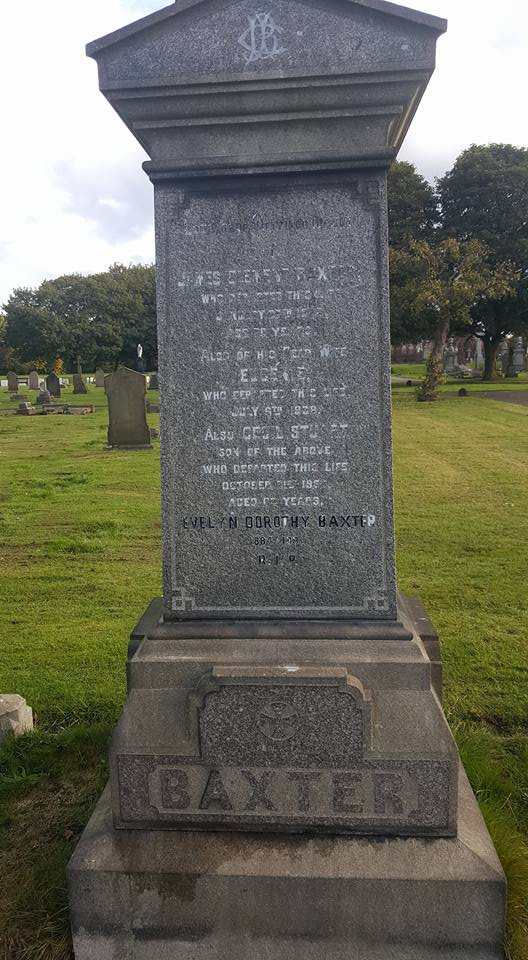
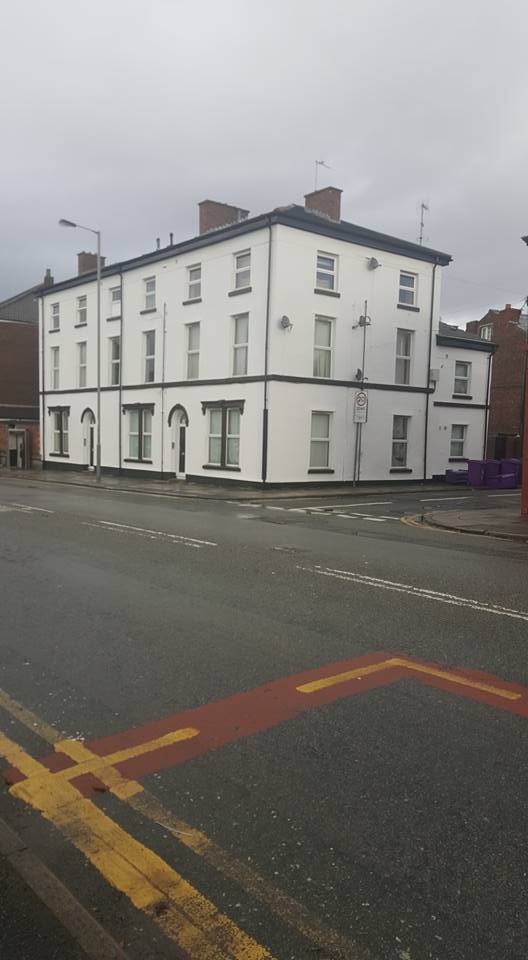
114 Robson Street where Dr Baxter Lived and Died
ARSENAL READY FOR EVERTON
Liverpool Echo - Friday 27 January 1928
“NOT A BOOKABLE SEAT REMAINS
From our own Correspondent, London, Friday
Keener interest is being display in the Everton v Arsenal match, at the Highbury ground, than in any Cup-ties in which London is concerned. Not a single bookable sent remains to be disposed of. “We have had far more applications for seats than we have been able to provide. On the first day after the draw all the seats at our disposal were applied for, and more. We were compelled to return a large number of cheques. “Our standing room will no doubt be taxed to the utmost, but we do not anticipate there will be any contretemps similar to that we experienced at the Aston Villa match.
ON STICKY SIDE
“Everton are reputed to be experts in mud, but they will find that Arsenal are quite able to put up a good game on a sticky ground; and though the turf at Highbury is in excellent conditions, it will be rather on the sticky side. “Our gates will be opened early, and arrangements have been made for coping with a record crowd.” Elaborate arrangements have bene made by the railway companies for dealing with football excursionists, and one train from Liverpool is expected to arrive at 11.30 at Euston, while another will reach there at noon.
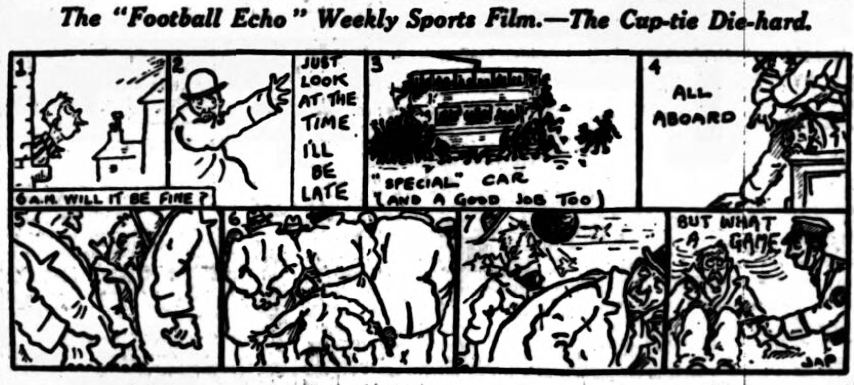
EVERTON’S TRANSFORMATION SCHEME
Liverpool Echo - Friday 27 January 1928
Bee’s Notes
Everton go to the Arsenal ground forgetting the accident that occurred the day before Christmas, and remembering with pleasure that they lost the game through certain well-defined causes, and those causes will be obliterated at Highbury tomorrow. Undoubtedly the machinery of Everton went wrong when Weldon forgot himself only to find himself remembered by the F.A. That week of enforced idleness served to show me what Weldon is to the forward line. Everton had not a forward line against Birmingham; you would not have recognized them as they passed by-and nearly passed out-at St. Andrew’s, but it was patent what was wrong- the men were a shade lethargic; they were not, until the second half, able to work by the methods which have carried them so far and so good. They were attired in white jerseys and the familiar blue was worn by the opposition-this may have had something to do with their failure. The point of pleasure is that the left wing formation will be “as before” and that being so, and remembering how Everton did not play in the first half of the league match at Highbury, I am expecting the Goodison giants to start at the appointed time this time, and give those uncertain full backs of the Arsenal club a shock. Most Evertonians admit at once the nature of the task, and say, “We shall be fortunate to get through.” The defeat of Arsenal by Villa gives us a fine line to some semblance of the form outlook, and I should think this result would be a fine tonic to the Everton forwards, who should remember that Lewis, the home goalkeeper, has a bad habit of running out of his own region. Yes, it may turn out fatuous optimism, but I honestly think Everton will win-and would earnestly call for forward work from five forwards in a collective mood, with the inspiration of a pass back to the half back not put among the things forgotten of this season’s experiences. Everton to win; that is the verdict of today. Everton; Taylor; Cresswell, O’Donnell; Kelly, Hart, Virr; Critchley, Irvine, Dean, Weldon, Troup.
EVERTON V ARSENAL
Liverpool Echo - Saturday 28 January 1928
PROCESSES AND PROGRESSES OF THE BALL AT THE HIGHBURY GROUND
INTENSE SCENES AND INCIDENTS OF PLAY
By Bee
Everton; Taylor; Cresswell (Captain), O’Donnell; Kelly, Hart, Virr; Critchley, Irvine, Dean, Weldon, Troup. Arsenal; Lewis; Parker, Cope; Baker, Butler, John; Hulmes, Buchan (Captain) , Brain, Blyth, Hoar. Referee.- Mr. G. Noel Watson, of Nottingham. London, Saturday. Another wet day. Will it ever be fine any Saturday? Perhaps it was well there was a rainfall because this tie had set the Thames ablaze, and there was a chance that if the day had been sunny the ground would have been besieged. As it was, there was a huge attendance long before the start of the game, and half an hour before the kick-off one would have termed it the umbrella match. The scene reminded one of the famous final between the Spurs and the Wolves, when the rainfall was terrific and was at its worst when the King of England went out to shake the players by the hand. Everton were all fit and well, though Cresswell complained of a rather severe cold. However, all the visiting players agreed that the conditions afoot- muddy turf- suited them down to the ground. The four corners of the Highbury ground were covered with a rich-looking turf, but for the rest the ground was all puddles and slush. Arsenal made no change from the selected side, which meant that Buchan was included, as per their usual arrangement of giving him a game and resting him for the next game.
CLOSING THE GATES.
Everton did not go to Brighton, this being a decision arising from the players’ own ideas. They travelled to town by the mid-day train and went to a show. If there is a replayed tie between our Merseyside clubs, Everton will play on Thursday and Liverpool on Wednesday, Liverpool taking the honour through winning the toss, and Arsenal having refusing to play on Monday. If there is one replay by any chance the usual Wednesday arrangements will be in force. The Everton directors were in full force, and so were the enthusiastic supporters of the Goodison Park club. There were trainloads of them, and they had to get off early to get to town, and when one lot landed an hour late they rushed off to Highbury, well knowing there would be a great crush. The enclosure was open by a quarter past twelve. And was packed out by one o’clock, and ten minutes from the start the club announced that eight of the main gates had to be closed. The ground is supposed to hold 60,000, but a good judge tells me there were no more than 48,000 here. Among those present was Andy Ducat, who yesterday escaped a serious accident ion a motor. Highbury has only one big stand and there was not a ticket for sale for this place at 9 o’clock this morning. The cheaper portions of the ground looked rather because as a contrast to the umbrellas, spectators put newspapers round their necks in an endeavor to keep the water out.
BUCHAM WINS THE TOSS
The day was in reality very like the day on which Everton beat Preston in the third round. Arsenal were the first out, but had no greater reception than Everton. Two former Sunderland players –Cresswell and Buchan –tossed as to which side would have the benefit of the wind, and Buchan. Won the toss. The game started a few minutes before time, and Everton at once made a move, only to find Parker make a huge clearance; but Virr set them going again, and Critchley became a menace. There was an early goal kick to the Arsenal but Hart sent Critchley away. And this was the beginning of a torrential two minutes. Critchley centred, and Dean bored through to the right and shot, the ball going the opposite way to where Lewis made for and striking the upright, returned into play. This bit of misfortune was, as it turned out, a mere detail, because Hart heard Troup sound a clarion call for a long pass to the wing. The pass was ideal, and so was Troup’s magnificent dodging of Parker.
STARTING GOAL BY TROUP
Troup moved up no more than two yards, and then with that wonderful half-jab shot of his he left Lewis helpless. Two minutes only had elapsed, and a triumphant start had been made.
EQUALISER BY BRAIN
Arsenal fought back tenaciously, and after seven minutes’ thoroughly fierce and good football Brain equalized. Buchan made the point possible with a quick move to which Hulme responded, taking the ball well in and centring square for Brain to score a well-made goal even though a Londoner suggested that Hulme was offside. There was no appeal, and for my part I considered it a good goal. The game became even more desperately urgent and interesting. Troup got a chance to make a second goal through Cresswell making a lovely dribble and punt, the latter being slipped by the head of Dean, who thus put Troup in a splendid position. Unfortunately, Troup dodged the ball and it swung over the bar no more than a yard too high.
APPEAL FOR PENALTY
Next came an appeal for a penalty by Dean, who went down well in the box area through a tackle by Cope; but the referee would not grant the appeal. We were getting sensation upon sensation, and when Hoar slipped away on the left Everton’s defence imagined that the ball was sure to go out, whereas actually Taylor was out of goal when the ball hit the foot of the upright and cannoned out to an Arsenal plyer, who should have scored with ease. Irvine once cleared from near the goalline when a free kick on the right had been a cause of trouble. Buchan made most of the Arsenal passes to create trouble, but Everton responded per Critchley, whose centre was back-headed by Dean to a place where Weldon might have been but was not.
EVERTON’S FORWARD TACTICS
Critchly, Dean, and Troup made in a twinkling moment a complete attack which ended when Troup shot low and true, and Lewis made a good catch. Taylor also made a good catch, but the whistle had in this case goes for offside. The Everton forwards were the more convincing in their passing, and they hugged the ball, and only parted with it when they could do so with advantage. No half-back did better than Kelly, and Weldon made an appreciable difference in the forward line. The pace was hot in spite of the mud, and one wondered if the players c could last out, Buchan in particular. Yet it was Buchan who once again suggested that he was our bogey, for Cresswell had to head away his centre which landed in the goalmouth. Furthermore, Brian got through when Kelly slipped up, and the ball struck the foot of the left post and cannoned behind. Thus matters of luck had been levelled up, but the referee made a grievous error when he allowed Brain to force a corner, and nearly a goal from a patently offside place. The Arsenal were having the major share of attacks now, and Buchan, after being placed in front of goal, found he could not dig the ball out of the mud into goal, and Virr dropped back and ended this great danger. Taylor bumped by Blyth and Brian, the latter being spoken to about the use of the elbow. Irvine had very hard luck in falling down at an inconvenient moment, and Hart came bear creating a surprise by shooting when Arsenal looked for a pass.
GUNNERS AHEAD.
Dean was, of course, hard marked, and when he was brought to earth in the penalty area again there was a loud shout for a penalty. The referee would have none of it, and then a simple miss-pass by Hart towards Kelly led to the breaking down of the Everton defence. The time was forty minutes, and the ball was swung from the left wing to the right, where Hulme with his left foot lashed out with a hit or miss shot, the ball striking the left post and twirling to the back of the net. It was a fine, fast shot, quite a random effort, but that is how cup-ties are won and lost. More evidence was produced by Hoar, who made a brilliant longish shot that Taylor saved after O’Donnell had made a mistake, and later Hoar cold not score from two yards’ range. Right on half-time O’Donnell could not hold Hulme, and Kelly saved a certainly. It had been a brilliant half, with Everton the cleverer side, but Arsenal enjoying more of the attack than their rivals. However, it must not be forgotten that Arsenal had the wind to help them. Half-time.- Arsenal 2, Everton 1.
VISTORS LOSE BY FOUR GOALS TO THREE
Summarized, the first half had been a great one. Arsenal could easily have been three in front, and Everton could have been 2-1 in twenty minutes. Troup’s goal was one of the nearest ever seen. The second half started with Cresswell cutting across to help O’Donnell and Virr in making a timely clearance. The Blues got little from the referee, and Hoar now got nothing from Cresswell. Troup, however, was well on top of both full backs, and it was he and Weldon who gave Dean half a chance. Dean shot, and Lewis caught the ball with difficulty. Critchly made two lovely solo runs, and finished the second one with a weak pass. Arsenal were now feeling the force of the wind, yet Taylor took two punts, and Dean at the other end, offered two “dummy” moves, only to find Critchley chance a shot that was off the mark. Cresswell, Dean, and Troup was the order of the passing when Everton attacked again, and Weldon had gross misfortune to find a good shot accidentally blocked by Parker. Everton up to this point of the second half had enjoyed a full measure of attack, and it looked like coming to a fruitful result as Everton raided again and again.
LEWIS’S DEXTERITY.
Lewis cleverly handled out from Irvine when a goal seemed a certainly and a second time the Welsh goalkeeper fell to push the ball away at a moment when the Arsenal backs were unable to do the right thing. It was a very fine really, and some additional point was lent to the proceedings by Dean being booed by the crowd for his persistence in following up on the goalkeeper, Buchan and Blyth both came from their lines towards the half-back position, so pronounced was the sting of Everton’s attack. Indeed Baker ran back to the goalmouth to give a corner as Troup tried to drag the ball into the empty net. This was a rare escape for the London club, who at the moment were bewildered. Lewis made an unexpected save again, Weldon being the shooter and as he fell over the goalkeeper regathered the ball and put it clear.
GUNNERS HARD BESET
It was exactly a quarter of an hour after half-time, and Everton had hammered for the whole of this period. Parker luckily charged down another Weldon shot. Buchan went down the field to tell Cope to take apartments with Dean. People said, “Surely a goal must come from so prolonged and excellent attack,” but Arsenal were fighting doggedly, and the ball needed a lot of punch, and the equalizer was still marked” absent.” O’Donnell, who limped gave a corner through not taking a practical measure. This corner was cleared, and there followed another batch of attacks on the wirried Arsenal side.
BUCHAM THE BOGEY
As often happened after a prolonged attack, the other side goes off with a rush-away and scores unexpectedly. This was so to-day, for, after a debated corner against Cresswell had been cleared, a further corner occurred and Hoar placed the ball beautifully, and Buchan’s great height and sound heading led to a score of 3-1 at seventy-one minutes.
DEAN REDUCES THE ELAD
But this was not to be the end as Irvine placed Dean with a rational chance, and the visiting centre forward moved slightly to the right before he put the ball to the left to score and thus reopen the game. Moreover at one minute more he should have scored an equalizer. There was a quarter of an hour left, and the match had become positively bitter, and it was perhaps as well that there was a stoppage through Weldon being hurt, this being the first stop in the game. Irvine few Troup, who had the ill-luck to hit the foot of the upright with a beautiful drive. Thus Everton could reasonably complain of their luck. Once again the Arsenal got away, and Hulme ended Everton’s hopes of an qualiser by taking the ball right up to the goal and getting an easy one, which Cresswell could not quite reach. It was one of the old stories of a team attacking for long spells and then suffering a sudden breakaway.
DEAN’S SECOND GOAL
Dean scored in the last minute a brilliant goal with the last kick of the match. Final; Arsenal 4, Everton 3. The attendance was 44,328 and the receipts 3,359 pounds.
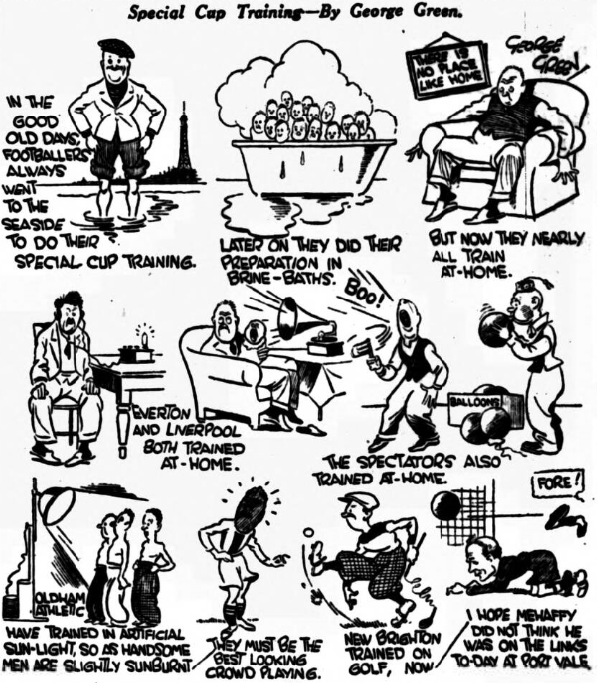
EVERTON “A” V MARINE
Liverpool Echo - Saturday 28 January 1928
At Strawberry-lane. The opening play was evenly contested. Moneypenny headed a goal for Marine after 10 minutes, French equalized. Half-time; Everton “A” 1, Marine 1. Final; Marine 5, Everton A 1
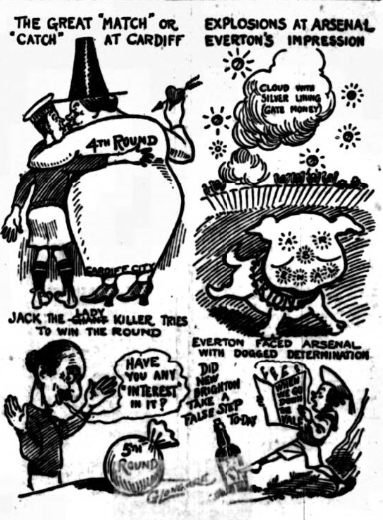
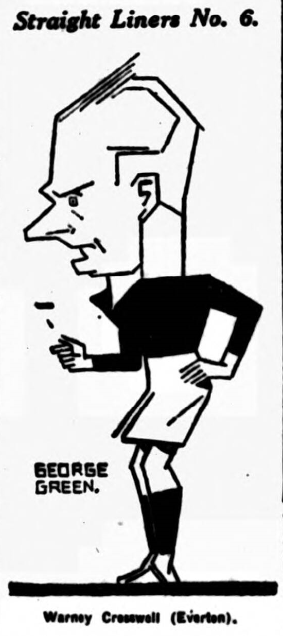
WEST BROM RES V EVERTON RES
Liverpool Echo - Saturday 28 January 1928
Everton Res, visited The Hawthorns to meet West Bromwich Res, in the Central League this afternoon. After a spell of even exchanges Edwards gave Albion the lead with a hard drive from a centre from the left. White and Houghton both went close to Everton. Hardy, in the visitors’ goal, had a busy time, but acquitted himself well, bringing off many fine saves.
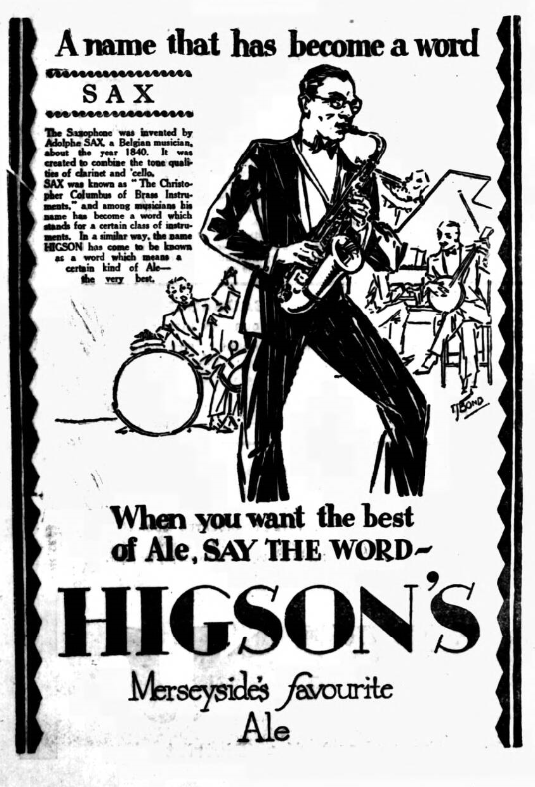
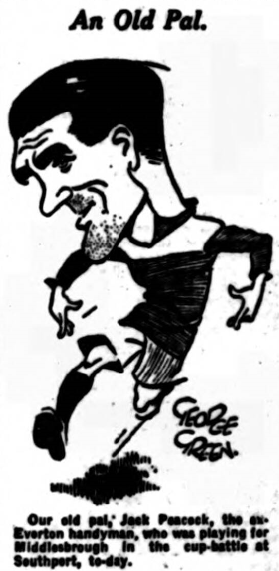
STUD MARKS
Liverpool Echo - Saturday 28 January 1928
By Louis T. Kelly
- Ted Taylor did his bit right well in helping to bring back a point from Birmingham.
- The next month will indeed show us the stuff Everton are made of.
- Albert Virr came through Saturday’s trial run fairly well, though he felt on odd twinge or two.
- Irvine has come out of his shell in recent with four goals in three matches
- Has he continued the good work to-day?
- Is Buchan still in the running for that elusive Cup winner’s medal?
- Critchley stood out at Birmingham as one of Everton’s most improved players.
- Everton have secured a back of the right stamp in Kennedy
- Common, the other new-come, is built something on the lines of Sunderland’s Thompson.
- Parker, the veteran, is Arsenal’s only ever-present
- Among those present at last Sunday’s big football service we noticed Common, Everton’s promising full-back recruit; also Jasper Kerr, who still resides on Merseyside.
- Blackburn Rovers on Saturday failed to score from a penalty kick for the eight time in succession!
- Here is the list in the order of NOT getting;- 1926-27, Harper, missing scoring v. Leicester City and v Derby County; Hutton missed v W.B. Albion.
- 1927-28, Hutton missed v. Arsenal and Everton, Puddefoot missed v. Everton; Mitchell missed v West Ham; and Healless v. Sheffield Wednesday.
- Birmingham alone have been granted no penalty kick concessions this season
- After starting the season as partner to the Arsenal’s Parker, Kennedy is now a Goodison Parker.
- When Everton net the Arsenal in the Cup in 1910 they won 5-0 and ran on into the semi-finals
- More than half of our Everton and Liverpool senior players live on the Cheshire side of the Mersey
- The Everton side that opposed the Arsenal in the Cup in 1910, and won 5-0, was as follows; Scott; Clifford and MaConanchie; Harris, Taylor, and Makepeace; Sharp, White, Freeman, Young, and G.H. Barlow. All the forwards scored save White, Sharp, getting a double- one a penalty goal.
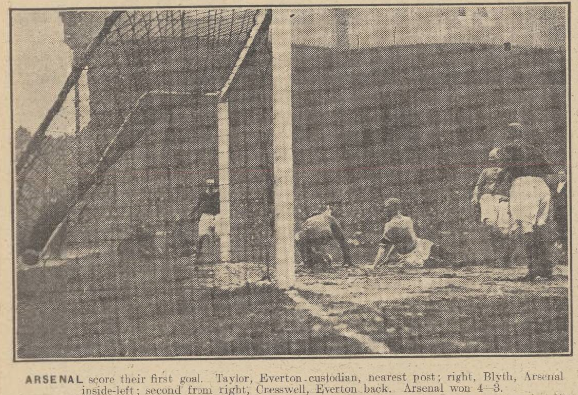
ARSENAL 4 EVERTON 3
January 30 th 1928. The Daily Courier.
FA CUP ROUND FOUR
DEAN'S LASTMINUTE GOAL IN EVERTON'S DRAMTIC EXIT.
ARSENAL'S CRACK WINGER'S PART IN LUCKY VICTORY AT HIGHBURY
“DIXIE” LABOUR UNDER THE HEEL OF OPPRESSION
A more dramatic cup battle than this one at Highbury has not been seen anywhere for many years. Luck was against Everton. A draw would have been more fitting conclusion to a game that had been most evenly and stubbornly contested. Under conditions that were all against accurate play a fast pace was set up and maintained right to the end. Speedy and resourceful forwards were countered by resolute half and full backs, and yet the honours went to both attacks, no fewer than seven goals being scored. Everton ill luck started when they lost the toss and the Arsenal had the advantage of the strong wind in the first half.
THE FIRST GOAL.
Then Dean was unfortunate in the first minute, his well-directed shot striking the crossbar. The first goal after two minutes' play was entirely the work of Troup who, receiving the ball near the line, ran in and beating Parker in his path fire in a great left foot shot which beat Lewis all the way. This early reverse put the Arsenal on their mettle, and they had slightly the best of the struggle all through the first half. The Arsenal equalised after eight minutes' play. A pass from Buchan put Hulme on the run, and from the winger's centre Brain ran on, and though he hesitated at first successful at the second attempt in gathering the ball and slipping it past Taylor. Everton were hard pressed in the closing stages of the first half, and after several narrow escapes the Everton goalkeeper was again beaten by a shot from Hulme. The pendulum sung the other way in the second half, and at one period of the game Everton looked like scoring again and again. Both Troup and Critchley missed chances through inaccurate shooting and Troup was unlucky in striking the foot of the far side post with a splendid shot.
BUCHAN ALLOWED TO SCORE.
The Everton backs were at fault in allowing Buchan to head through the Arsenal's third goal from a corner kick placed in front of goal by Hoar. Had Buchan been as well watched, as Dean that goal would not have been scored. At length Dean managed to shake off the close attentions of Butler and swering past Parker, he drove the ball into the far corner of the net. Ten minutes from the end Everton were making desperate efforts to equalise, when another breakaway by the Arsenal right-winger settled their chances. O'Donnell failed in his tackle and Hulme went straight for goal. Taylor might have saved his shot, but at the critical moment he seemed to tumble and before he could recover the ball was in the net. Prior to this Dean had a hot shot stopped by Lewis, but right on time Dean again beat the Arsenal backs and scored with a tremendous drive.
DEAN KEPT DOWN.
Dean was kept very much in subjection until the closing stages. Not only had he Butler in close attention, but one or other of the full-backs were always blocking his progress. Weldon was the best of the Everton forwards, and Irvine put in a lot of useful work Critchley was weak both in shooting and centring. No fault could be found with the Everton half-backs Kelly being the most prominent. O'Donnell and Cresswell were sound full-backs, Cresswell being outstanding in his cool anticipation and well-placed clearance kicks. The Arsenal once again proved themselves a well-balance side, with Buchan still a great schemer and Brain a dashing leader. The Everton players were erupt hands, as a taken of respect to the memory of the late Dr. Baxter, a former chairman of the Everton club. Teams: - Arsenal: - Lewis, goal, Parker and Cope, backs, baker Butler and John half-backs, Hulme, Buchan (captain), Brain, Blyhe, and Hoar, forwards. Everton: - Taylor, goal, Cresswell (captain) and O'Donnell, backs, Kelly, Hart, and Virr, half-backs, Critchley, Irvine, Dean, Weldon, and Troup, forwards. Referee Mr. G. Noel.
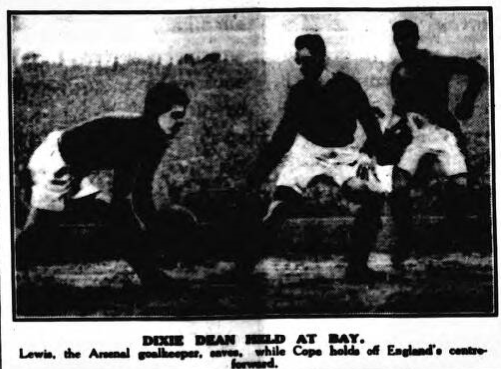
WEST BROMWICH ALBION RESERVES 2 EVERTON RESERVES 1
January 30 th 1928. The Daily Courier.
CENTRAL LEAGUE (Game 24)
West Bromwich Reserves strength
ened their position by defeating Everton at West Bromwich. Edwards and Byers scored for the home side and White for the visitors. The match was played under adverse conditions, rain falling throughout. Hardy played brilliantly in the visitors goal, and White was outstanding in the forward line. Everton: - Hardy, goal, Common and Kennedy, backs, Brown Griffiths, and Bain, half-backs, Roscoe, Easton, White, Houghton and Lewis, forwards
A LIFE TIME IN FOOTBALL
Athletic News - Monday 30 January 1928
“YOU ARE ON YOUR HONOUR.”
EVERTON LEADER’S LIFT STORY
SEEKING STARS
By Impressionists
Next year the Everton Football Club will celebrate their jubilee. All being well Mr. William C. Cuff will preside, for I anticipate that some function appropriate to the glorious history' of the club will mark the epoch. Mr. Cuff is in the unique position of being the chairman of club with which he was associated as a boy. Followed spell committee-man; then, the formation a company, as director. When the late Mr. R. Molyneux resigned the secretaryship one could found so gifted for the position as Mr. Cuff. Accordingly, he resigned as a director, and took an office probably greater responsibility. In 1918 Mr. Cuff resigned owing to pressure of legal business and, to all his intents and purposes, closed the chapter his connection with the game in a club sense. Three years later, however, he was persuaded again to become director. This was at a time of turbulence. Yes, although the history of Everton mainly one of serenity and marvelous progress there have been cycles of upheaval.
ALLEGIANCE.
When League football was resumed after the war difficulties arose, and for more seasons than Mr. Cuff wishes to remember these trials remained with the club. At the same time it must be understood they were the sequel, more or less, to failure on the field, which the many and faithful could not reconcile with Everton s glittering career. A leader —a man with personality and a presence every corner of the football universe; assertive, with a grasp of detail, and replete in organising ability—this was the need of Everton. Accordingly, Mr. Cuff was asked become the chairman of directors 1921. Out a football nightmare has come peace. Critics are silenced, for to-day Everton are again the top of tree. They demand a high standard play at Goodison Park, and without exaggeration exception it can be said they have received it, except that winning results have not always been produced.
THE TRAINING GROUND.
While in company with Mr. Cuff I was reminded of the wonderful allegiance to the club. For I remarked to shareholder: “Well, you have a great team this season,” and got the retort,' “We had a great team last season.” What difference is made by position and points, however, on the impressionable football enthusiast. I have given a brief sketch of the years Mr. Cuff has given to the Everton club. Their place in the game is a monument his influence, and what has done behind scenes —this without invidious comparison in the labours construction and the maintenance of an honoured name. But Mr. Cuff has spread his activities far from the Everton stronghold. The League clubs owe him debt of gratitude for the broad vision which inspired him to found the Central League. This was the direct outcome of breach which arose with portion of the committee and a number of the clubs in membership with the Lancashire Combination. In 1911 the Central League a consequence had birth. Mr. Cuff became thehon. secretary, and continued in that office. It is “the feeder” of the Football League clubs, has enjoyed remarkable success, and is the envy of those clubs who not within its charmed circle. Central League comes second only to the premier competition in quality of football and popularity with the public. Still further were Mr. Cuff’s abilities in a legislative capacity pursued when he was invited to stand for the League management Committee. He is justly proud of the fact that he received a record number of votes -42 out of 45.
TO-DAY’S WEALTH.
Will Cuff was a member of the St. Domingo Church whoso football team was the beginning of Everton, the name being changed from St. Domingo to Everton in 1879. Everton played at Anfield, but there came the turmoil and great severance to which reference has already been made in this series of life stories. The present Liverpool club—originally part of Everton —broke away. Everton had the name and the players. They went across the park, a modest home which has grown to the magnificence which singles out Goodison Park among enclosures in the country. “We have nominal capital of £2, 500,’' said Mr. Cuff, “of which £1,947 10s. Is paid up. We owe nothing. We have liabilities. If we sold up lock, stock, and barrel a sum of not less than £60,000 would be realizable.”
QUALITY FIRST
“We have always as a body of officials aimed at obtaining the highest possible class of player, both in character and in football ability. “The ambition to possess the most cultured has just become a tradition passing from one director or board of directors to another. “This concentration on providing football dilettantes, if I may see the word that seems to me most expressive, may not have brought us honours galore in the way of Cup and League triumphs. Nevertheless, our justification has been the good name we hold everywhere for playing the game, and the unfailing and populous support we have received from the public. “I was among some players of other clubs, one of whom had to play us in the Cup the following week. They were unaware of my identity. Our prospective rivals were discussing Everton, and I heard one of them told; “if you can play football at all they’ll at least let you.’ “That was the kind of tribute Everton appreciate and have striven to secure.
EVER PRESENT
“As everyone is well aware, last season was perhaps the biggest ordeal in Everton’s career. It was simply torture for the directorate. The Second Division loomed before us. “I remember being commiserated with this way; ‘You’ve been thirty nine years in the First Division. It’s your turn to go down.’ “Perhaps so. Football is such a big competitive master nowadays that one cannot expect to have it all milk and honey. But Everton have a jealously-guarded record in the League, of which they have been members since the inception, without once being subject to re-election or the old Test matches, whereas Aston Villa and Bolton Wanderers had to seek the good will of the members. “Whatever distorted views there may have been among the directors at periods Everton’s exceptional organizing and business capacity, coupled with a determination to maintain the dignity of the club, cannot be questioned. “Assets, indeed, have been Messrs, W.R. Clayton, George Nairn, James Griffiths, and Dr. Baxter, the latter of whom did so much to fiancé the company on formation. Just now comes Dr. Baxter’s death. He will always be a fragrant memory with me, as a man of acumen and geniality. Those so long associated with him miss a charming personality. That we have never gone back in the esteem and affection of the people was demonstrated in our darkest season, that of 1926-27.
“THE FINEST APOLOGIST.”
I have experience of 30 years at shareholders’ meetings, but I have never dreaded one so much at that of the Everton club last year—not for myself so much as for colleagues, and for the real danger in which I feared the future the club might placed. “The philosophic view the meeting took was pleasantly unexpected. After the tension was all over, and I gasped with the relief of it, I remarked to the other directors: “’‘Well, there is tolling the ups and downs of football. We may be as near the top next year as have been at the bottom this season. But Should it be necessary to go before the shares holders with explanations for another season non-success I shall contemplate learning another language, for I have exhausted all my vocabulary to meet the case in English.’ “A shareholder came to me with the remark: “I have heard you at annual meetings many times, Mr. Cuff. You are finest apologist I have ever listened to.’
“YOU ARE ON YOUR HONOUR."
Although, as secretary and director, Mr. Cuff has travelled the four corners of the kingdom in search of players he has met with curiously few adventures. The reasons I can conceive. One is that those concerned knew their man; that there was going to be straight dealing and to the point or nothing at all. Another is that players deemed it an honour to go to Everton. Another thing Mr. Cuff asserts is that his club have never gone through or behind the rules, and it was a matter of concern them when the League granted the amnesty. At a meeting of the Players’ Union delegates whose clubs had not made any illegal payments to players were asked to stand up. Two of them did. One was told to sit down. Jack Sharp was allowed to remain his feet as the shining example of Everton! Prior to an F.A. Cup semi-final a deputation of Everton players went to Mr. Cuff and told him they had heard the other team were “on £25 a man” if they won. Said the secretary, “I will tell you what you are on. Your legal payments and your honour.” Everton lost the match, but not because the players did not get extra emoluments;
LOOKING FOR STARS.
The playing upheaval in the Everton camp was just prior to F.A. Cup Final 1907 against Sheffield Wednesday—their second appearance there in successive years. It was the desire of the directors to sign all the team prior to the match, but George Wilson, the brilliant Scottish forward, could not see that £4 a week was enough for him. He would not sign, so was left out of the Cup team. The transfer of Wilson created a sensation in Scotland, yet Mr. Cuff secured him for £800, the best part of which he had reason to believe went from the Heart of Midlothian club to the player. On Saturday night news went round a gathering of many club representatives from England and others of Scottish clubs, in a Glasgow hotel, that Everton had signed Wilson. No one would believe it until on demand, the transfer papers were produced. Mr. Cuff and Mr. Dan Kirkwood – the latter than a director and at present on the staff, and well known in Scotland, so that he usually was one of the Everton prospectors over the Border- were five hours in persuading Wilson to sign! Mr. Cuff went for the best of players. Among Scotsmen he even ventured for Bobby Walker, and tried to get Andrew Cunningham before he went to the Rangers.
GREAT CENTRE-FORWARDS
When I asked him to tell me of his best teams, he found a difficulty in making distinction in several cases. “I suppose that of 1897 when we were beaten in the Cup Final 3-2 by Aston Villa, was the greatest all-round. Who can forget such a half-back line as Boyle, Holt, and Stewart, and such forwards as Chadwick, Milward and Geary? One of the finest outside rights there has ever been, in my opinion, is Alex Latta. “Holt, by the way, is a prosperous mineral water manufacturer in the Midlands, Boyle holds a responsible position with a Dumbarton shipbuilding firm, and Latta is interested in the construction of yachts at Birkenhead. “Still, I think the present team is one of the best we have ever hand, Mr. Cuff added. “In my opinion, the Everton club have had the distinction of playing four of the finest centre-forwards the game has produced, namely, Jon Southworth, Fred Geary, Bert Freeman, and William Dean.
PAST AND PRESENT
I do not agree that present-day football does not compare in science with that of fifteen or twenty years ago, especially having regard to its more strenuous state. Moreover, I am absolutely convinced that the game was never more healthy and free from aspersion. “The rules are stringent, and obedience to them is rightly insisted upon. The legislature is in the happy position of an assurance that its requirements are being honestly and cheerfully complied with, and that being so, wonderful in the past as the game has been still more so is bound to be its future.”
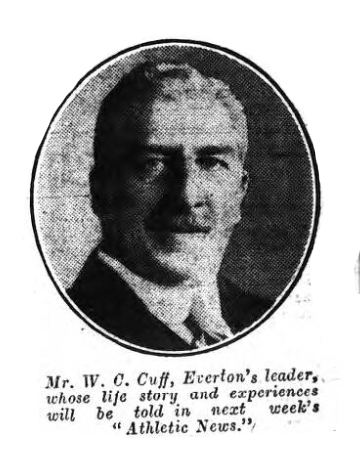
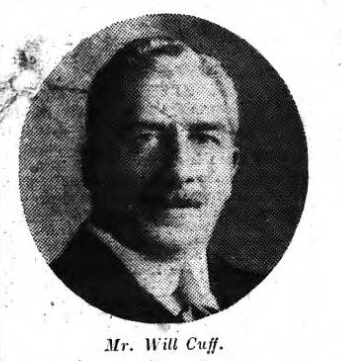
EVERTON’S MARVEL
Athletic News - Monday 30 January 1928
ARSENAL BETTER VALUE THAN MARGIN OF ONE GOAL
BY THE MYSERY INTERNATIONAL
ARSENAL 4, EVERTON 3
The glamour of the Cup never had more striking recognition than in this match at Highbury, where Everton opposed the Arsenal. The pouring rain never ceased, but the ground was packed with enthusiasts long before the game began. If it had been fine I doubt whether more would have been present. The start was sensational, as Everton were one up within a minute or so of the kick-off. That lively sprite, TROUP, obtaining possession out on the wing, beat parker by slipping inside him. He went on and put in a magnificent shot from not too easy an angle. The ball hit Lewis’s arm and passed into the net as a great pace. I though Lewis should have “angled” Troup, as it was quite obvious that he was going to shoot and not cross the ball into the middle. Anyhow, this placed Everton in an enviable position, especially considering that they were playing on an opponent’s ground. Arsenal stuck to their task and gradually wore down the Everton defence, and with one exception their forwards showed great virility and spirit.
HULME THE RAIDER.
Hulme was always a menace to the Everton defence when in possession. The Liverpool men were lucky on more than one occasion to crowd him out, but eventually he got away from a pass from Buchan. He beat O’Donnell easily, and running right into the goal-mouth he crossed the ball with splendid judgment to BRAIN, who made no mistake with such a golden opportunity. HULME obtained the second goal himself. He hit a centre from the left wing first time, and had the delight of seeing it crash in the net off the far post. This goal was only fitting as Hulme had been a creaseless raider. Even in a sea of mud his speed and spirit carried him past O’Donnell time after time. Arsenal should have been leading by three goals to one at the interval. Hoar missed an absolute “sitter” from a cross by Hulme when standing practically under the bar with the goalkeeper at the other end. These things do happen even in Cup-ties. It was a tribute to Arsenal’s Cup fighting quality that they were deservedly leading at half-time.
AS LAST MINUTE GOAL
For a time in the second half it looked as though Everton were going to make a real fight of it, but their supreme effort was worm down, and Arsenal were eventually comfortable winners, though the margin 4-3 does not look like that. DEAN scored in practically the last minute of the game, so that Arsenal were two goals in front during the last few moments. In spite of the praise that has been lavished upon Dean this season his play in this match must have been a revelation to those people who had not seen him before. He got two wonderful goals when he was ankle deep in mud, and apart from this he needed the attention of all the Arsenal defence to stop him getting more. He was half the Everton team, if not more. This is not the slightest exaggeration. I am not given to fulsome flattery, but I must say that judged on what I have seen of Dean on several occasions, and under different conditions, he is one of the greatest centre-forwards the game of Association football has ever known. I really don’t know of another centre-forward who could have shot the two goals that he did with such odds-against chances. I still stick to my opinion with regard to Everton as a team. Their position at the head of the League is a flattering one, and I should say Dean is entirely responsible for the number of matches they have won. Apart from Cresswell and Dean they have not revealed the class that one would expect from League leaders when I have seen them. Troup is as good as anybody bar Dean and Cresswell. Need I say more? There is one other feature that I must touch on. Hart, the centre-half, would be of much more service to his side if he played football instead of chatting to the referee so much. His methods are not the methods of a really great Scottish player.
ARSENAL WEAKNESSES
Arsenal, though winning, will need to improve if they are going to get to Wembley. There are weaknesses that must be dealt with drastically. Their outside left is not in his element in a Cup-tie, whatever he may be in League football. Lewis as a goalkeeper in an important Cup-tie I do not like at all. His methods are very unsound, and he seems to have no idea of “angling” a forward who is shooting. This is one of the fundamental qualities of a first-class goalkeeper. Parker and Cope had a grueling time in the mud, and altogether came out of it creditably, especially Cope. Butler played his usual quiet, industrious game, and was always in the thick of it. The two wing half-backs, Baker and John, were not at their best, John being strangely quiet up in front. Blyth worked tremendously hard. He is a great trier in a Cup-tie. Brain never spared himself and was always giving the Everton backs anxious moments.
A COOL LEADER
The star artist, however, was HULME, who got a remarkable goal, his own second and his side’s fourth. He got the ball practically at inside left and ploughed his way through the mud to score after beating the defence single-handed. BUCHAN played coolly and with judgement throughout, besides rallying his men at intervals during the game. His height was very useful when he headed Arsenal’s third goal. If Arsenal are to get to Wembley this year certain positions must be strengthened and without delay. Arsenal; Lewis; Parker, Cope; Baker, Butler, John; Hulme, Brain, Blyth, and Hoar. Everton.- Taylor; Cresswell, O’Donnell; Kelly, Hart, Virr; Critchley, Irvine, Dean, Weldon, and Troup. Referee; Mr. G.N. Watson, Nottingham.
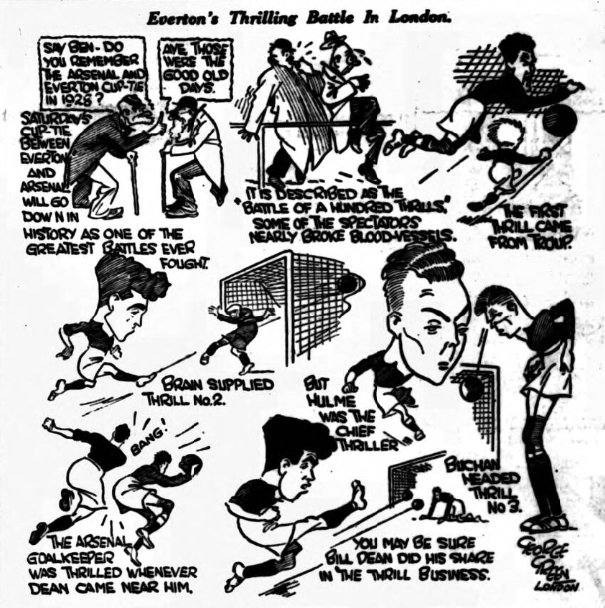
EVERTON’S LOSS DISCUSSED
Liverpool Echo - Monday 30 January 1928
WHEN A DRAW WOULD HAVE SATISFIED EVERYONE
Bee’s Notes
Everton have arranged to play their re-arranged League game with Newcastle at Goodison on February 6, kick-off three o’clock. Leaving the Arsenal ground the find the chara gone, I was sought out by a canny friend, who said, “Well, you will be able to tell your grand-children that you went to London one day in a six-day cricket test and saw England beat Australia by mowing them down; and then you can drift in the football channel and tell ‘em how Arsenal beat Everton one up in a total of seven goals.” Yes, I said, it has been a grand and glorious match; I shall always remember it. And I always think of the man who referred the game. Name? Ah, yes, Nichol Watson! That’s funny; I suppose the “N” is silent as in free-kick. Reader, that’s a subtle way of saying that “Oel” Watson did not satisfy. He did not. He displeased one of the big men of the Association, who said; “If I did not see the cleanest case of a penalty kick, I have never seen one before.” Another said, “Hulme was offside.” But those offside and corner claims don’t interest me much; one is only beating the air by considering them. The main point about this refereeing was that when it seemed a corner kick had been given wonderfully a free kick to the defending side was offered up almost before the corner kick had dropped to earth! I wonder what the offence could have been –if any? For my part I can still left wondering why every solid charge on Ted Taylor was justified, and why every charge, slid of otherwise, by Dean was the subject of a free-kick. There are not excuses; they are not offered to heal the troubled Everton mind because we thought the side could win on a mud heap; they had their chances. Troup had one, Dean had one-others could have made a drive and did not. No, I say definitely that a draw would have been a perfect reflex to this astounding and fascinating game; yet we must not squeal because Arsenal took advantage of our three defensive slips. Arsenal were well on top in the first half after dean had hit the bar and Troup had scored one and missed one, but the London spectators did not seen to realise that there had been half a gale helping the home team.
WORN OUT ATTACKING.
Everton’s second half began with twenty minutes solid hammering. They shot well and found the bar or the upright or a player’s body stop goals. They hammered poor Parker and Cope with their skill and their stamina and got no return for their labours. The result was that when the three remaining Arsenal forwards were offered a long pass from Buchan or Blyth, who were living among the defence, they scurried off and it seemed to me the defence thought they could easily stop them and started to “do things with the ball.” Hulme is so sharp and Hoar and Brian so goahead that it does not do to take liberties, especially when your side is a goal down and you are on top of their defence. A goal at that period would have made such a wealth of difference to Everton. Troup had the luck to bang the ball at the woodwork; nothing would go right and what made it worse was the fact that Everton, in scoring three goals, had done quite sufficient to win any ordinary game. But this was no ordinary game; the poor forward line got four goals; the side that could not adopt the clever and sound methods adopted by the Everton side was competent to play on and strive on, and at their head was the finest of generals- Buchan. Charles, the ancient mariner, continues to steer the Arsenal boat into calm waters. He tried to nothing near the finish, but meantime he had shown how to turn a game by heading a corner kick in, and he had shown how to change the whole outlook of a rush and confirmed company of unthinking footballers into a well-ordered attack. Buchan won the game for Arsenal; I am emphatic about that; he won the League game by the same margin for the same club, the day’s before Christmas, when Everton were there. He had a compeer in Dean, but Dean’s chance came too late. He got two, and never did a man work harder and with greater number of adversaries. Dean was marked by three men; Buchan did not have the same compliment. Yet one had to admire Everton’s courageous finish as they had not only scored in the first minute of play, but scored with the absolute final kick of the match; a grand ending to a grand game. Had the result been a draw, Arsenal would have been quite satisfied; no one would have grumbled; it would have been a fine finishing line to a great game. But fate said. “No I must make these Everton fellows understand that defensive slips must pay entertainment tax. Perhaps the lesson will sink deep into the minds of those concerned. I was particularly pleased with the way Kelly played- he was the best half-back on the field. Hart was below his very best standard, yet did much good work, and Virr found Hulme a very sprightly customer. All the forwards did their part well. The left wing was a study of greatness in small stature; and they shot after they had hugged the ball to show how to slow backs by feint and swerve. Irvine offered a priceless pass to Dean, who said thank you and straight-away scored. Irvine worked with that ever-determined mind and mood of his, and a mere touch for a pass would have saved him some work and bumps; yet one cannot help admiring the man and his endeavor and skill. He made one of the best shots of the game, and Lewis took the chance of making his greatest save. Critchley hardly put a foot wrong till he shot one instead of centring; but had he scored with it, no one would have said, “wrong tactic!” The forward line was a blend. The bland way the defence took up certain attitudes was due to the fact that Everton for twenty minutes were crowding attack on attack. It was a fatal period for Everton, and led them into a wrong optimistic view; they thought they had the game well won then. It only shows! However, there was glory in defeat, and they left shaking Arsenal by the hand and wishing them Wembley luck. One felt sorry for Cresswell, who had played a manful game. However, it’s all in the game.
Everton F.C wore black bands upon their arms as a token of respect for the late Dr. Baxter.
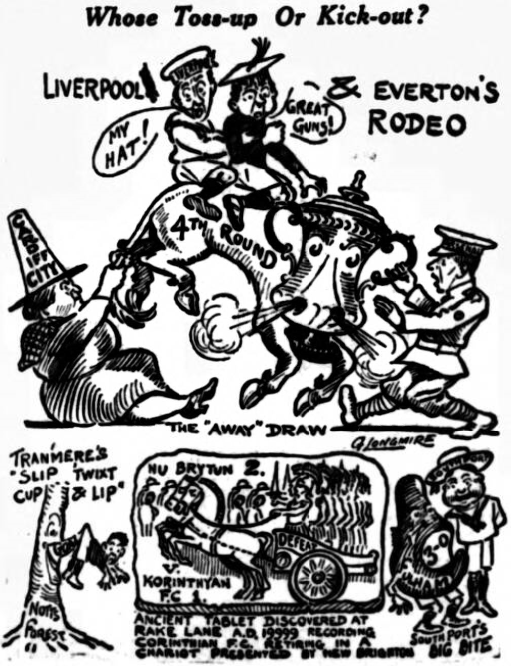
WHAT REMAINS TO US
Liverpool Echo - Tuesday 31 January 1928
LEAGUE OUTLOOK
THE REMAINING GAMES FOR EVERTON AND HUDDERSFIELD
LONDON’S IDEAS ABOUT CUP-TIES
Bee’s Notes
There is much to enthrall us, even yet, and the big noise this week is the West Ham game at Liverpool, together with the visit of Everton to Huddersfield. In view of the latter I propose now to give readers something to ponder over- a list of the fixtures to be played and the state of the League market, from the latter of which you will notice that Liverpool is still seventh in the chart, although to hear some of their grumblers one would think they had passed to the 24th position! There are the remaining fixtures of the two top clubs;-
LONDON CALLING
Generally, I am not known as a man who writes to anyone concerning football matters, but I feel that after witnessing the match at Highbury that something out of the ordinary in a football sense has occurred, and this drives me to relate my views on the game, which I hope will be of interest to Liverpool people in general (says “Neutral,” of Russell-square); I am neutral. I have no favourites in the First Division, and thus I went to Highbury, hoping that I would see the better side win, or in other words biased in no directions whatever. The result was a sad disappointment to me. Not only, in my opinion, did the better side lose, but I went away at the end disgusted that such tactics as displayed by the home team should result in victory. Furthermore, I deplore that a crowd, such as assembled on Saturday, should hold so one-sided a view of the game. It was sufficient alone to break the hearts of any visiting team, I was immensely pleased with the Everton team. They played football as it should be played. On the other hand, I was vastly disappointed with the Arsenal. They displayed, I suppose, what is called real “cup-tie stuff,” but when compared with the visitors, it was not football at all. They won, because they had two backs who, despite the changed law, can play the offside rule to perfection. Time after time, brilliant moves on the part of Everton, which always looked like producing goals, were cut short in this way, and in no way were dean and his colleagues to blame. It appeared that this was the only way the home defenders could stop the goals, and they never thought twice about it. It was not football, and I am glad to say the opposition avoided it. The treatment served up to Dean, too, was most unsportsmanlike. Every well-known player is bound to get rough attention handed out to him, and this was no exception. It was enough to rattle any player, and no doubt Dean became a trifle cross, and, as is only natural, retaliated –in quite an unoffensive way, however. There was, however, no reason at all why the crowd on the terraces should take an exception to his methods. They were perfectly fair, in the circumstances and far cleaner than the methods display by Brian, the home centre, whop once, I remember, fouled Taylor in a most dangerous way. But while the crowd ran down the visitors, the home man’s fouls went unnoticed. Surely, enough to take the heart out of the stoutest player. I congratulate all Everton supporters on being able to follow a team with such a keen sense of sportsmanship, and who play such delightful football. I thought Kelly and Weldon especially good, while Dean’s two goals were the reward due to him for a plucky display against heavy odds. May it be a long time before Everton again play such wonderful football before such an unappreciative audience. Well, here’s to the championship for Goodison.
MYSTERY NUMBER TWO
In view of the furore created by some of the statements of the “Mystery International” of the Arsenal-Everton Cup-tie I think it is only necessary to say that he is a Londoner by birth and upbringing, and that when no talks of the Arsenal; winning by a margin more comfortable than the actual lead of one goal he surely has forgotten the way the London defence accidentally kept out shot after shot in the first twenty minutes of the second half, and how Troup hit the foot of the post at a time when the score was 3-2. It does not sound so very comforting, does it? Here is a letter from “A Cheshire Scotsman”;-
I see the “Mystery International” to-day suggests that the Arsenal won more comfortably than the score implies, and that they were more than a one goal better team on the day. As a spectator, I dispute this writer’s suggestion. My reading of the game was the “spin of the coin” decided the issue, as the advantage of playing with the strong wind and rain behind them in the first half would have enabled Everton (had they won the toss) to turn round with at least a three goals lead. As it was, they were a goal down and they were desperately eager to obtain the equalizer, and it was this over-eagerness which, in a sense, proved their own undoing, as being so keen on attacking, the defence gradually neglected their usual natural precautions. When the Arsenal did manage to make an attack they found everything in their fabvour, and so increased their lead. I am not blaming the Everton defence, but just the luck of losing the toss. I cannot close without reference to our one and only “Dixie.” The “Mystery International” makes no mistake here when he says “he is one of the greatest centre forwards the game of Association football has ever known.” Could I crave just a little more space to tell you of an amusing incident which took place in the 1s spec, while the game was in progress. An Arsenal supporter asked an Everton supporter in a loud Cockney voice, “How does this ‘ere Dean get his goals, anyhow? The Everton supporter was considering how to answer when Dixie, at this psychological moment, obtained his first goal. Pat came his reply, “That’s how he gets ‘em, mate; that’s how he gets ‘em! ‘Ot stuff, ain’t he?”
PUBLIC SCHOOL MAN’S REVIEW
After bargaining for a seat which I got for 10s I settled down to watch a really great game played in the real spirit and under the most trying conditions, and I raise my hat to both teams; it can certainly be said “They played the game,” says Public School Man;-
Whatever the critics may write, I consider the Arsenal a very lucky team to pass into the next round. The first half was perhaps the Arsenal’s who were helped by a strong wind, but there was not a great deal in it- Troup’s goal was a real gem, but the Arsenal’s first goal was primarily the result of a blunder by the Everton defence more than good play by their opponents. In the second half Everton had two thirds of the play, but both teams scored two goals- one of the Arsenal’s goals was brought about by Hulme taking advantage of a bad throw-in while Kelly was temporarily laid out. Dean’s goals both had the hall-mark of real merit. Everton are a well-balanced side, Taylor was masterful; the two backs were sound- O’Donnell had a rare handful in Buchan and Hulme, both of whom were in good form; I though Cresswell tried to do too much. He was acting as an extra half back part of the game, and I thought tired towards the end. The half backs were all good, in fact any of the six on view would do credit to any international side. Of the Everton forwards I give Troup the palm (what a bag of tricks). Dean showed that he is a great leader. I would like to see him again when the going is not so heavy. I thought the referee was rather severe on him on occasions; a full-blowed shoulder charge used to be allowed in the old days. Irvine, although a polished player, I did not think quite fitted in with the rest of the attack. The other forwards were good.
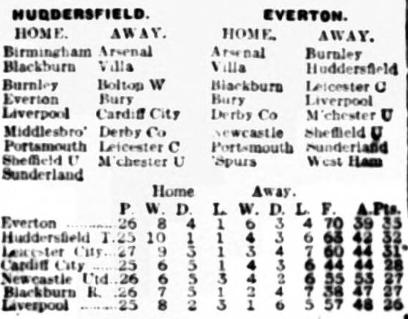
January 1928